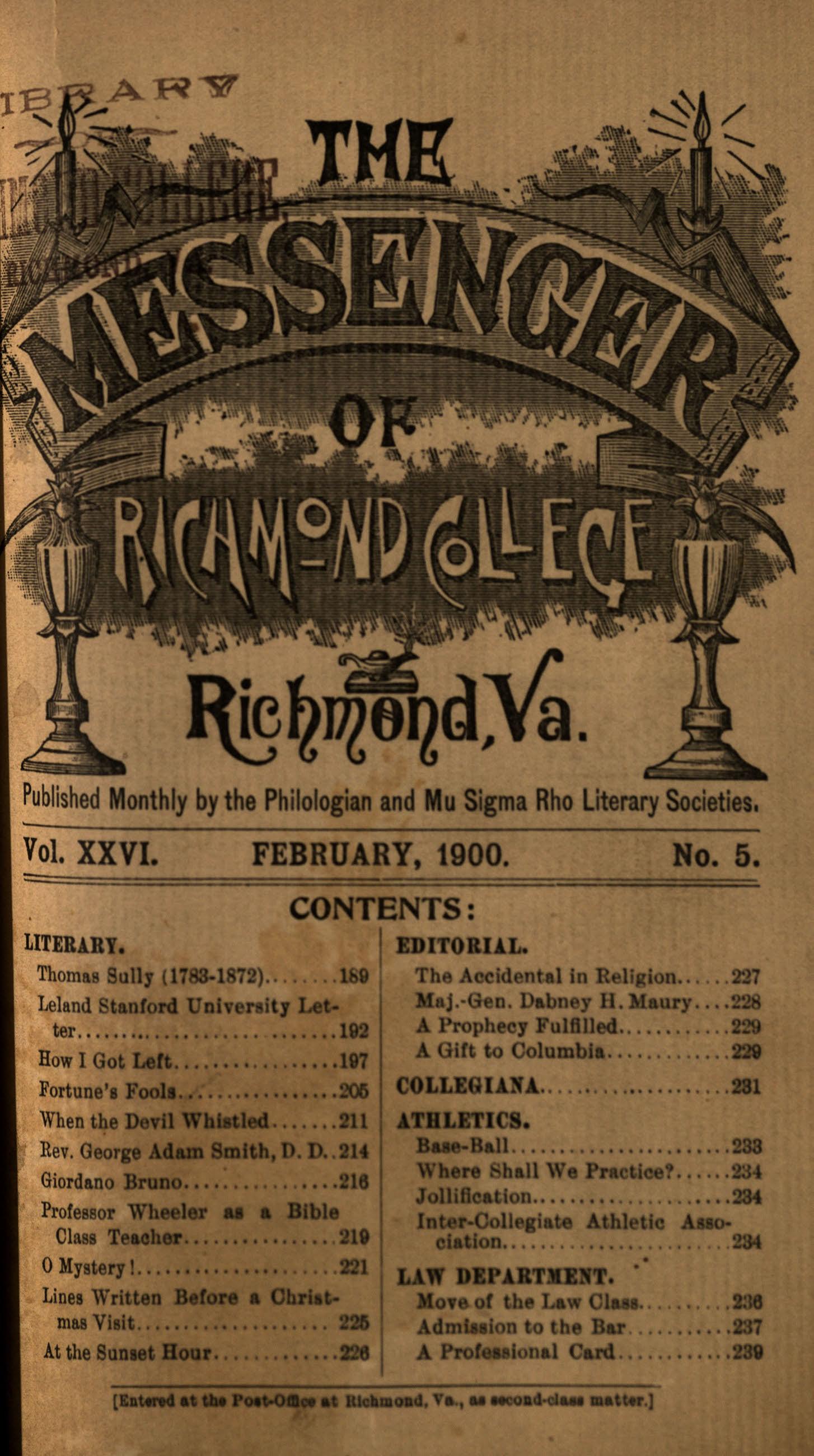
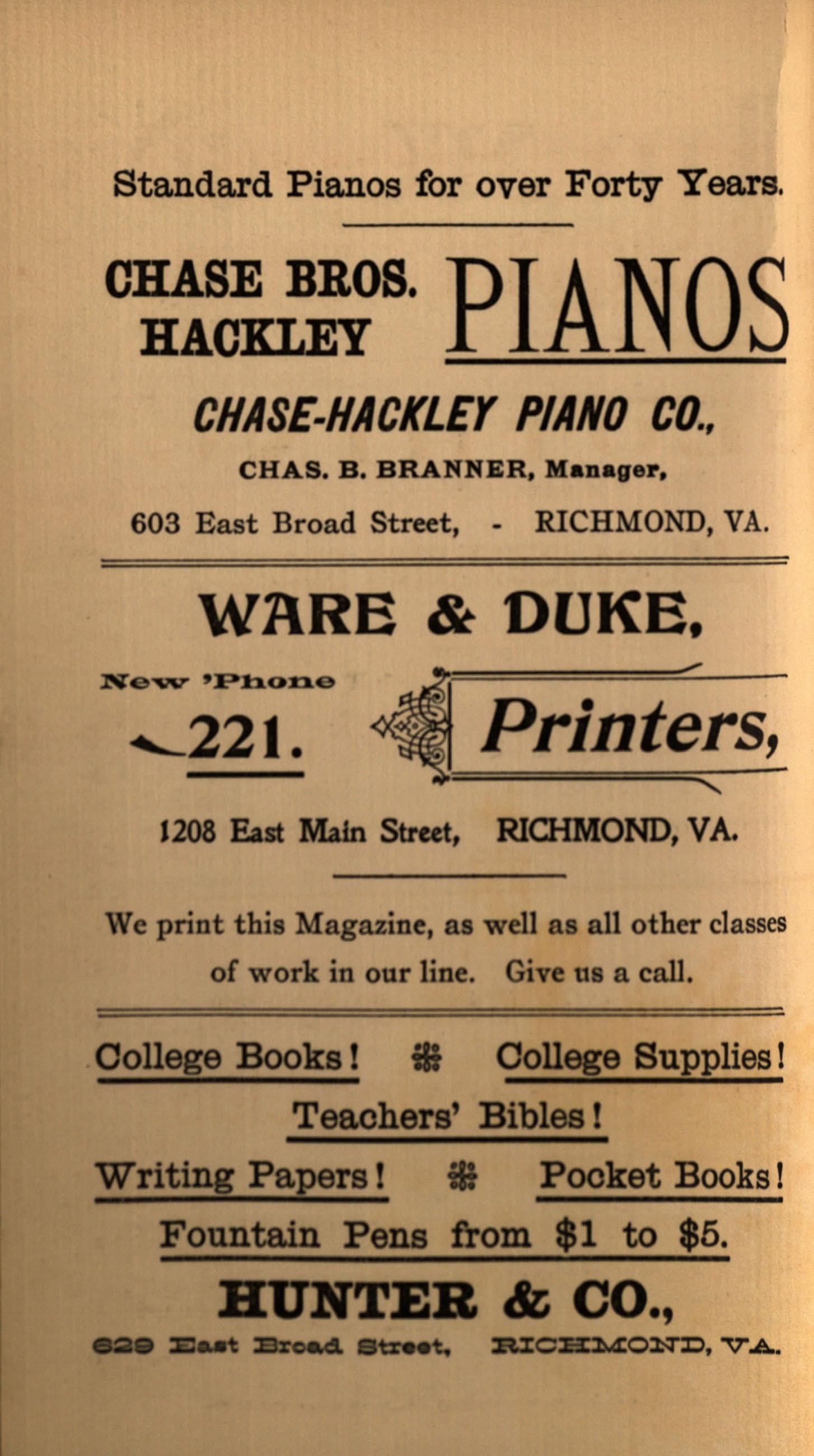
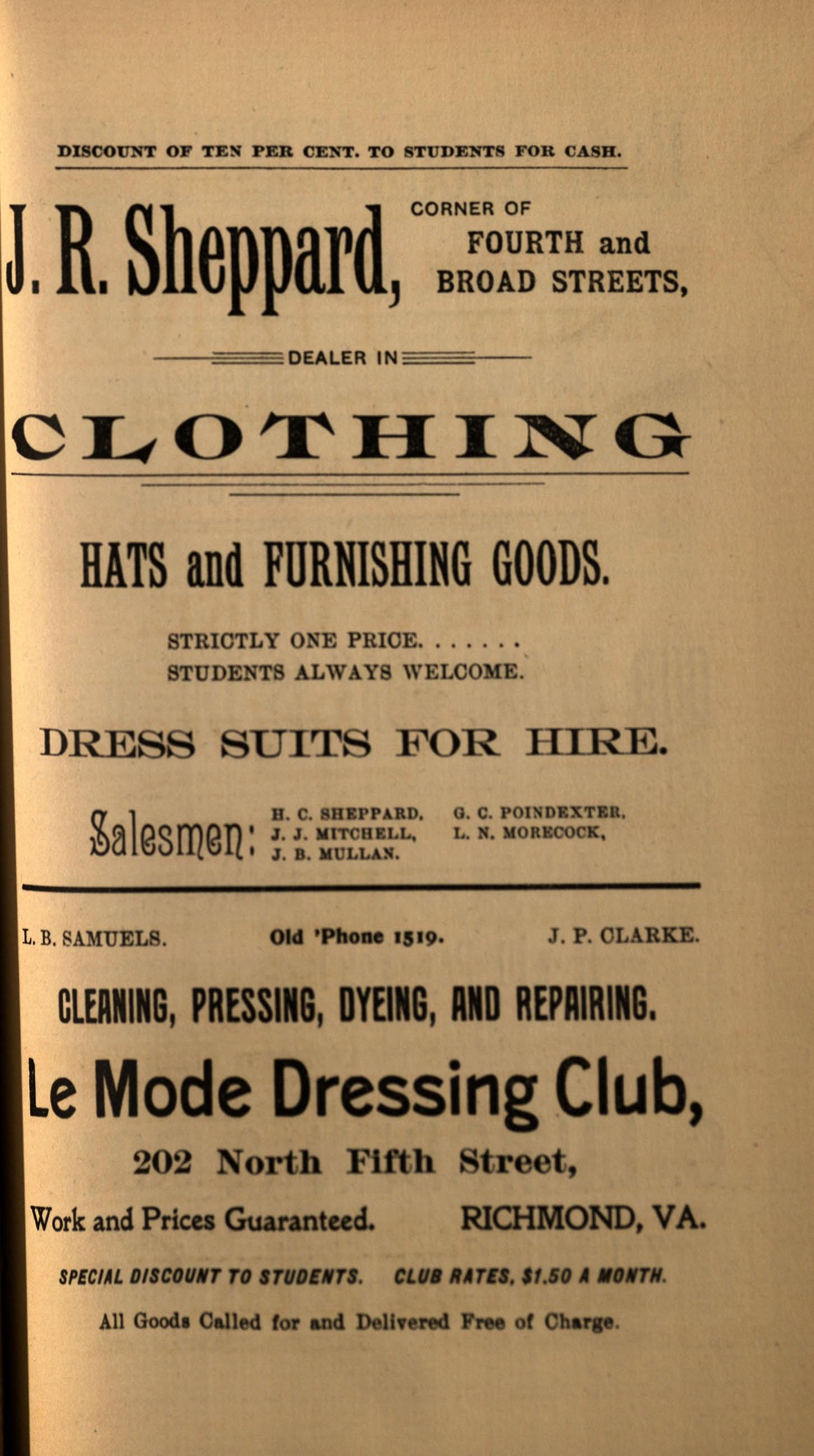

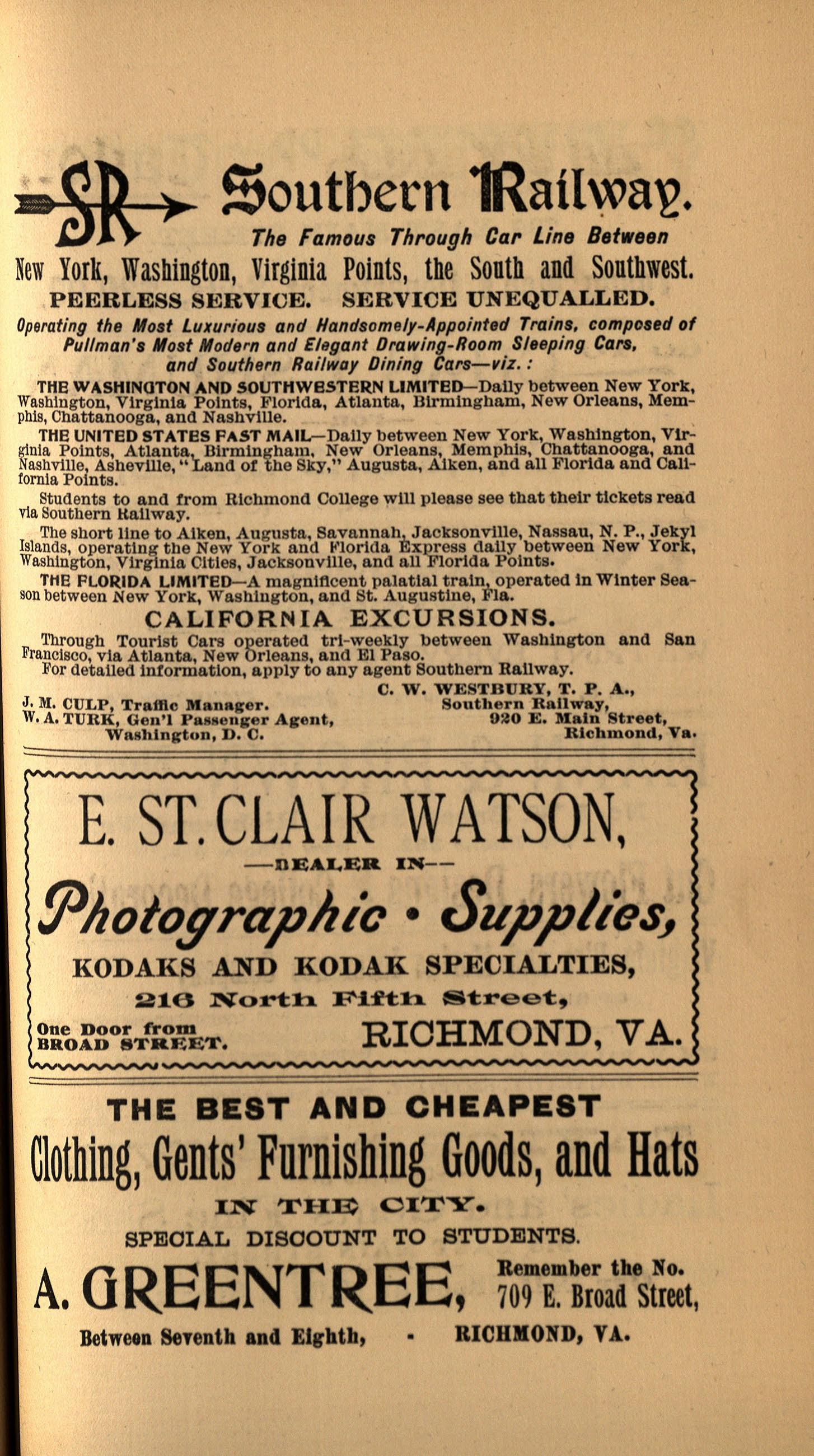






The Famous Through Car Line Between NewYork,Washington,VirginiaPoints,the SouthandSouthwest. PEERLESS SERVICE. SERVICE UNEQUALLED.
Operating the Moat Luxurious and Handsom ely-Appointed Trains, composed of Pullman's Moat Modern and Elegant Drawing-Room Sleeping Cars, and Southern Railway Dining Cars-viz . :
THBWASHINOTON AND 50UTHWE.STE~ LIMITED- Da.ll y betwee n New York, Washington, Vir gin!& P oin ts, F lorid a., At l anta., Dtrm !n gh am, New Orl eans , Memphis,Chattan ooga., a.nd Nas hvi lle.
THE UNITEDSTAT E S PA.ST MAl~Datly be t wee n New Y ork , Wa shington , Virginia Po!nts, At l an t a,. Birm!ng h am , New Orl ea n s , Memph!s , Cha tta noo ga, and Rashv1llelAsheville," i,and or the SkY," Au gu sta., Alken, and a ll F lorid a. and Call!orntaPo nts.
Students to and trom Richmond College will p l ea se see tha.t t h eir ticke t s r ead viaSouthern Hallway.
I The short line to Aiken, A u gusta, Sava n nah..1.Jacksonville, Nassa u , N. P ., J ekyl ,!lands, operating the New Yo r k a n d ~•1or1aa Jl.Xpress dally betwee n N ew York, nashlngton, Virgtn!o. Cit ies , J ackso n ville, a n d all Flor!da Poin t s .
THEPLOR.IDALIMITED-A mag nl ftcent po.lat la l train ope r ate d i n Wint er Seasonbetween t<lewYork , Washingto n, o.n d St Aug u stine , .11'la. CALIFORNIA EXCURSIONS.
F 1.'brough Tourist Oars ope r ated tr l-weekly betwee n Wa shtngto n an d San ranclsco,via Atlanta, New Or leans, and El Paso. For detailed tnrormatlon , apply to any agent Sou thern Rail way
J, M , CULP , Tr a ffic ManR ge r. W, A, TURK, Ge n ' l Pa sse n ge r Age n t , Was h! ngt un, D , O.
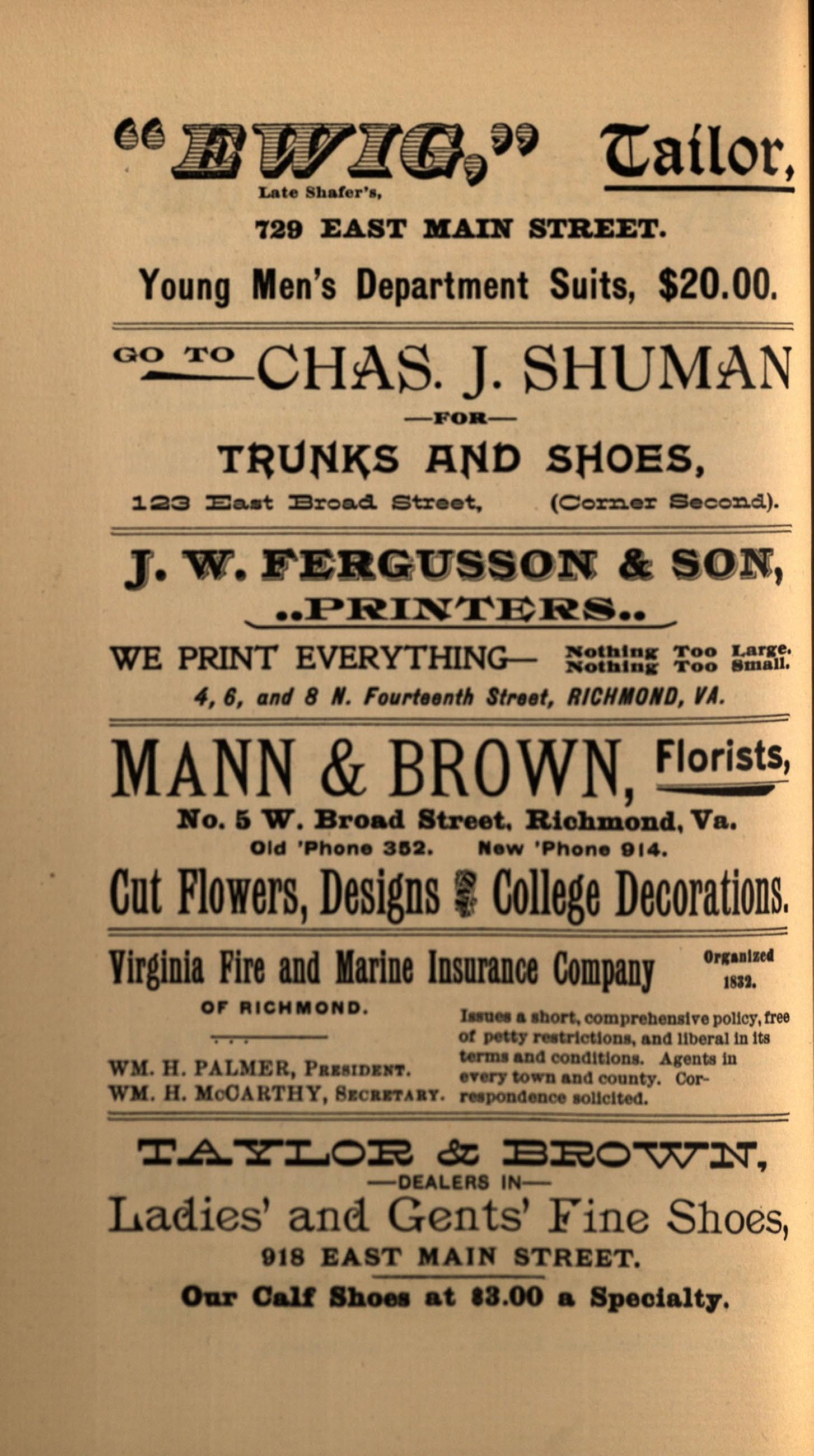

Genta' alta . Olffd aad P , • 7i Ctata. 8eat ' altt I ••eel•••P , 60 u
lf'Hed
klrtt
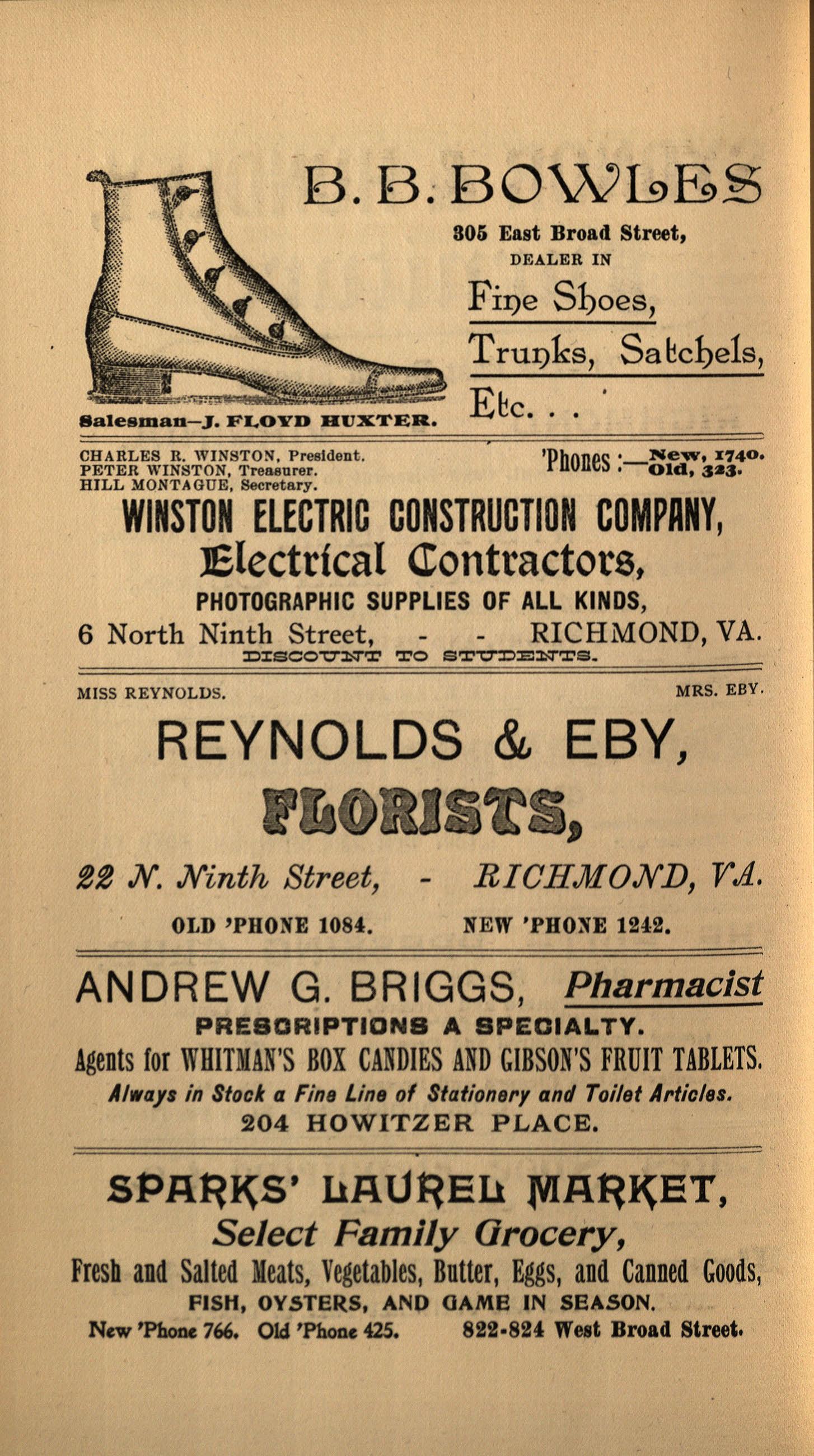
Notice!
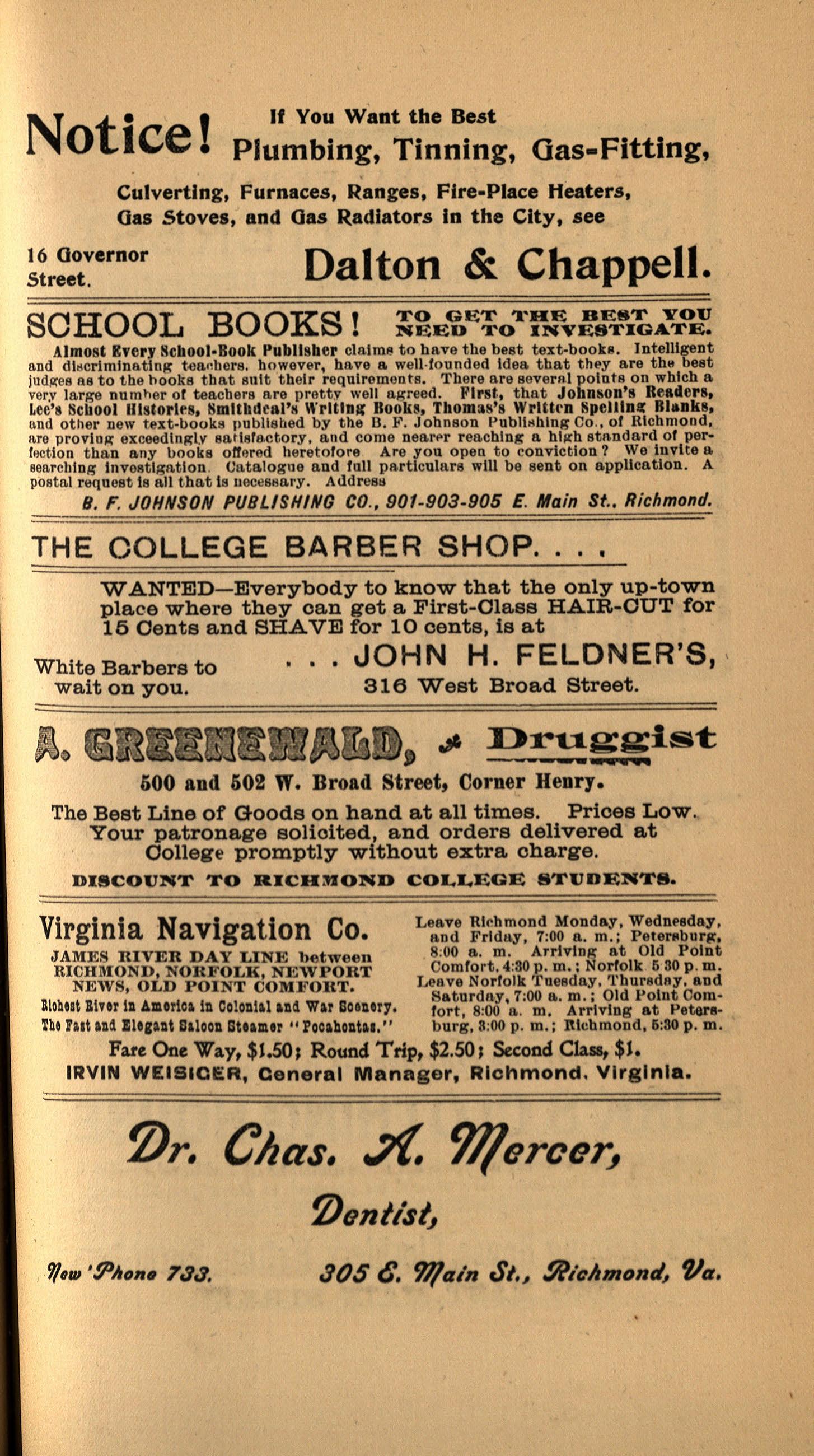
If You Want the Be&t Plumbing, Tinning, Gas-Fitting,
Culvertlng, Furnaces, Ranges, Fire-Place Heaters, Oas .Stoves, and Oas R.adlator.s In the City, .see 16 Governor Street, Dalton
! TO GET 'l'HE DE8T YO1J NEED TO INVE8TIGATE.
Almost Every Scbool•Book Publisher clalme to have the best text-boote. Intelligent and dl •crlmlne.tlnp; t -0a r.bers , however, have & well -found ed Idea. tba.t they a.re thff best Judges ne to the hooks tba.t suit th eir requirements, There are severnl points on which & ver,v la rge numh er of teachers a.re pr etty well agreed. First, that JobnKOD'8 Readers, Lee'sSchool lllstorlrs, tlmltbdeal'g Wrltln,r Books, Tbom:as's Wrlt&1•nSpellln,r Blanks, and oth er n e w text-book s 1rnbllsbed by the 0. F. Johnson Publl•blng Co , of Richmond, 11r e proving exceedlnp;lv eo.tlsla.ctory, and come nea.rPr reaching- a hh<h et1>ndo.rdof perlootlon th a n a.ny l>ooks ott ered heretofore Are you open to conviction? We Invite a sear ching lnvestlg 1>tlon Catalogue and lull partlculure will be eent on appllcatlon. A posta l request le a.IIthat Is uecessa.ry.
Addresij B. F . JOHNSON PUBLISHING CO. , 901-903-905 £. Main St Richmond.
WANTED-Everybody to know that the only up-town place where they oa.n get a. First-Ola.as HAIR-OUT for 15 Oents and SHAVE for 10 cents, is at White Barbers to wait on you.
West Broad Street.
tcr\Jc;'.;:311.:1!,# .,,.
t ww-500 and 502 w. Broad Street, Corner Henry. The Beet Line of Goods on hand at all times. Prices Low. Your patronage solicited, and orders delivered at Oollege promptly without extra. oha.rge. DISCOUNT TO RICHMOND COLLEGE 8TUDENT8.
Virginia Navigation Co. Leave Rlrhmond Monday, Wednesday, 11,od Frldu.y, 7:00 a. m.; Petertobore:, JAM ES RIVER DAY LINE between 8 :00 a. m. Arrlvloll' at Old Point RICHMOND, NORFOLK, NEWPORT Comrort. 4:80 p . m.: Norlollt 6 80 p. m. NEWS, OLD POINT COMFOltT, Leave Norfolk 'fuesday, 'l' bursd11y, and BlohHIBlur Ill A111orlo1111001011111111d w,r So1111r1, S&t0rd0 Y, 7:oo&. m ; Old l'olut Com• fort, 8:00 11, m. Arriving at PetereTherail 111dlle1a11l ll1loo11BU1111tr"Pooa\1011111," burg, 8:00 p m.; ntcbmond, 6:80 p. m.
Fare One Way, $J.50J Round Trip, $2.50J Second Clase, $J. IRVIN WEISICER, Ceneral Manager, Richmond. Virginia.

in the PROFESSORS and STU DENTS of Richmond College. We feel it our d uty, as LEADERS I OUTFITTING, to supp l y them with the most serviceable and best in wearing appiirel, at LOWER PRICES than obtainable elsewhere . We've suited this feeling to the action, and offer yon you r Fall a.xid '2V"ixit:er Out::fit:, from head to foot, at lower figures than were ever quoted you, and a.Howyou TEN PER CE T. DISCOUNT off those p r ices. We shall expect you all in. . . . . . . . 0.H.BERRY & CO.,MAIN AND
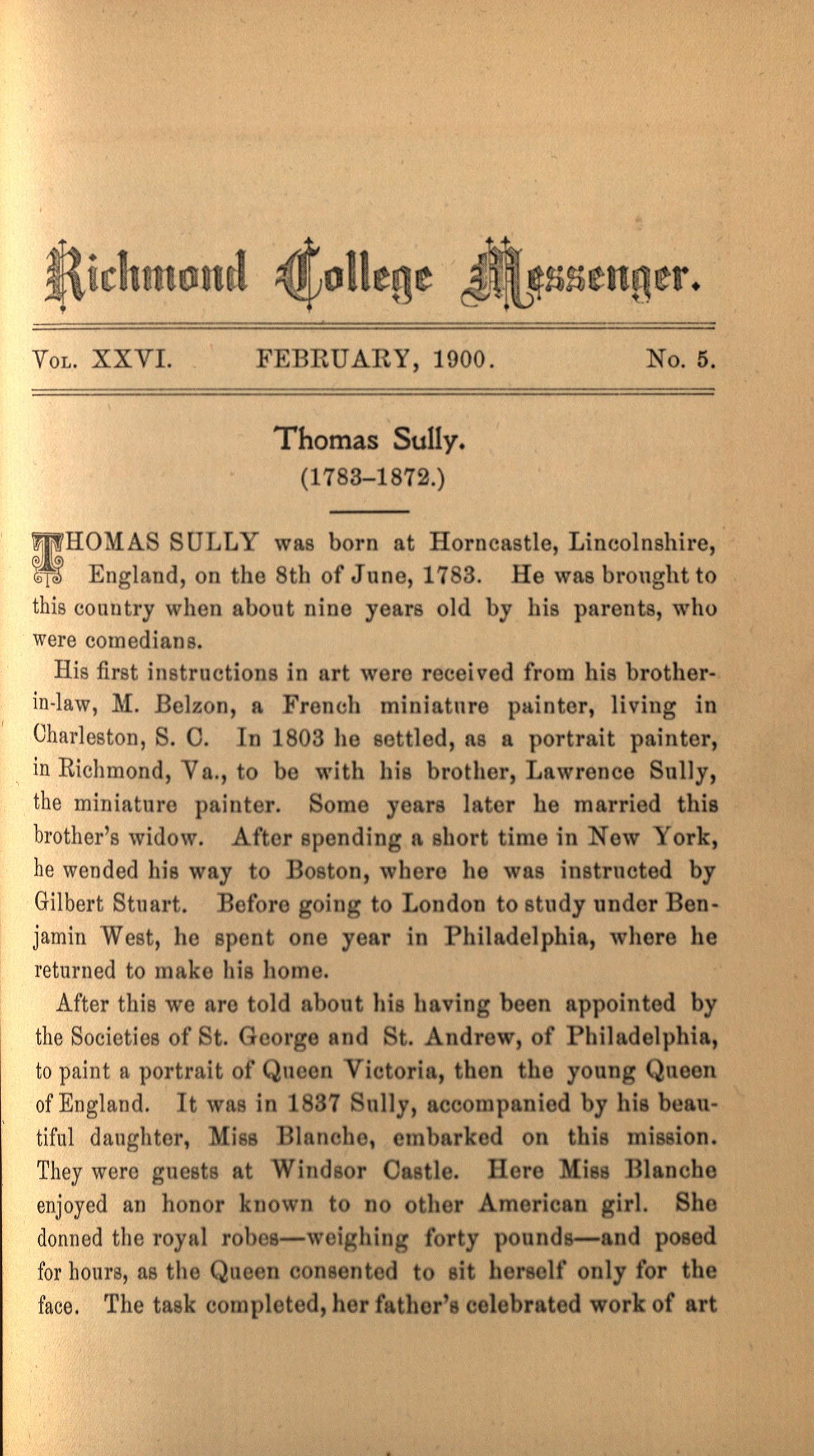
VoL. XXVI. FEBRUARY, 1000 .
N!!HOMA.SSOLL wa.s born at Hornca.stle, Lincolnshire, 'ffi' England, on the 8th of June, 17 3. He was brought to this country ,vhen about nine years old by his parents, who werecomedians.
His first instructions in art wero received from his brotherin-law, M. Belzon, a Fronch miniatnre p!ioiotor, living in Charleston, S. 0. In 1803 he settled, ns a portrait painter , , in Richmond, a., to be with his brother, Lawrence Solly , the miniature painter. ome years lat r he married this brother's widow. ftcr spending a short time in ew ork , he wended his way to Bo ton, where he was instrncted by Gilbert Stuart. Before going to London to study under Benj amin West, he spent one year in Philadelphia, where he returned to make bis homo.
After this we are told about his having been appointed by the Societiesof t. 'lCOrgeand t. ndr w, of Philadelphia , to paint a portrait of' Qncen ictoria, then tho young Qneen ofEngland. It was in 1 37 ully, accompanied by his beautiful daughter, Mi s Binn ·ho, mbarked on thi mi ion. Theywere guests at Windsor Oa tl . Her i s Blanche enjoyedan honor known to no other American girl. ho donnedthe roynl rohos-woighin forty pounds-and posed forhours, as the Qnc n consent d to sit h r olf only for the face. The task completed, her fathor's celebrated work of art
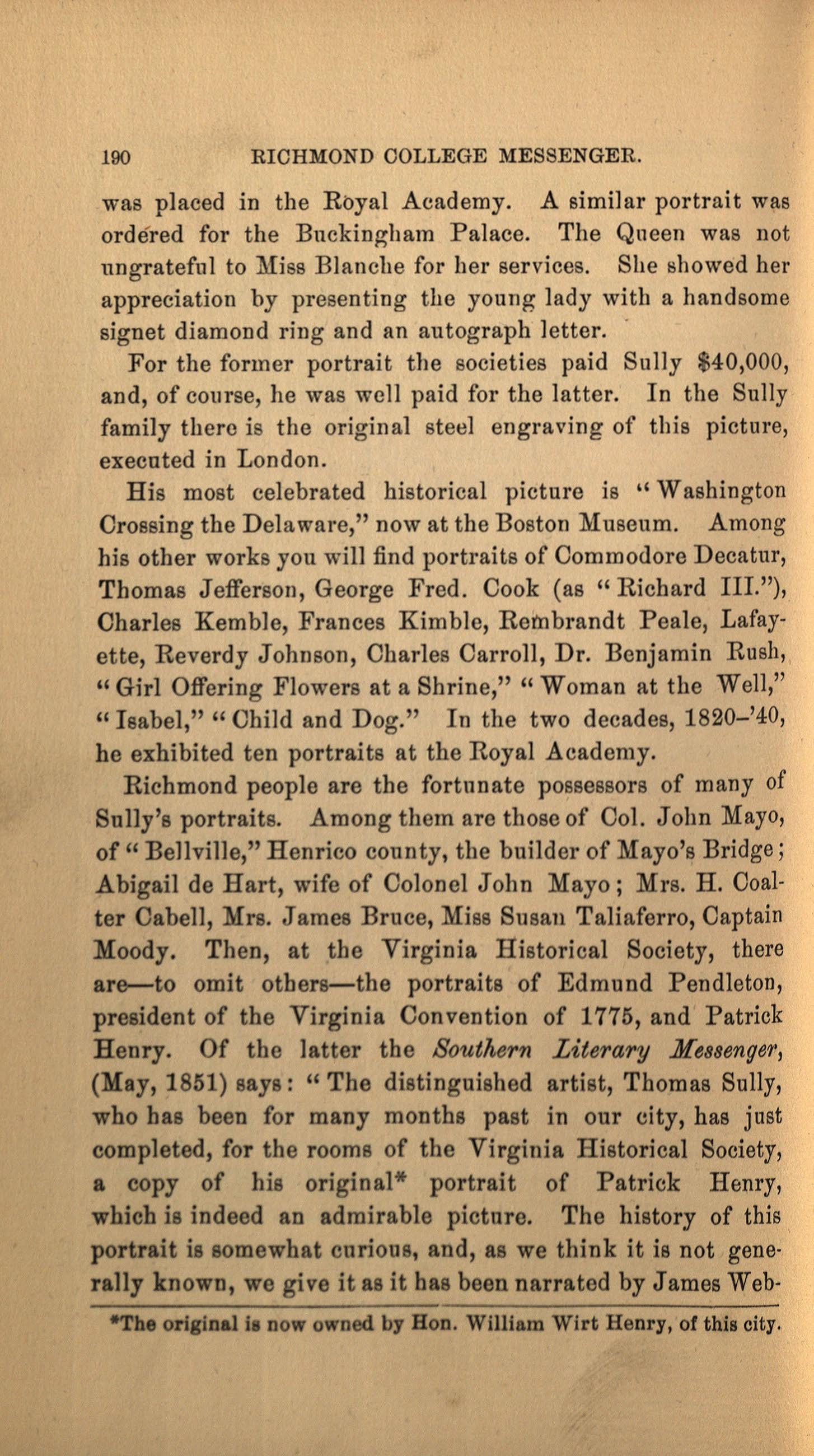
was placed in the Royal Academy. A similar portrait was ordered for the Bnckingbam Palace. The Queen was not ungrateful to Miss Blanche for her services. She showed her appreciation by presenting the young lady with a handsome signet diamond ring and an autograph letter.
For the former portrait the societies paid Sully 40,000, and, of course, he was well paid for the latter. In the Sully family there is the original steel engraving of this picture, executed in London.
His most celebrated historical picture is '' Washington Crossing the Delaware," now at the Boston Museum. Among his other works you will find portraits of Commodore Decatur, Thomas Jefferson, George Fred. Cook (as "Richard III."), Charles Kemble, Frances Kimble, Rembrandt Peale, Lafayette, Reverdy Johnson, Charles Carroll, Dr. Benjamin Rush, "Girl Offering Flowers at a Shrine," " Woman R.tthe W e1l," "Isabel,"" Child and Dog." In the two decades, 1820-'40, he exhibited ten portraits at the Royal Academy. Richmond people are the fortunate possessors of many of Sally's portraits. Among them are those of Ool. John Mayo, of" Be11vi11e,"Henrico county, the builder of Mayo's Bridge; Abigail de Hart, wife of Colonel John Mayo; Mrs. H. Coalter Cabell, Mrs. James Bruce, Miss Susan Taliaferro, Captain Moody. Then, at the Virginia Ilistorical Society, there are-to omit others-the portraits of Edmund Pendleton, president of the Virginia Convention of 1775, and Patrick Henry. Of the latter the Sou,thern Literary .Messengm·, (May, 1851) says: "The distinguished artist, Thomas Sully, who bas been for many months past in our city, has just completed, for the rooms of the Virginia Historical Society, a copy of his original* portrait of Patrick Henry, which is indeed an admirable picture. The history of this portrait is somewhat curious, and, as we think it is not generally known, we give it as it has been narrated by James Web-The original i now owned by Hon. William Wirt Henry, of this city.
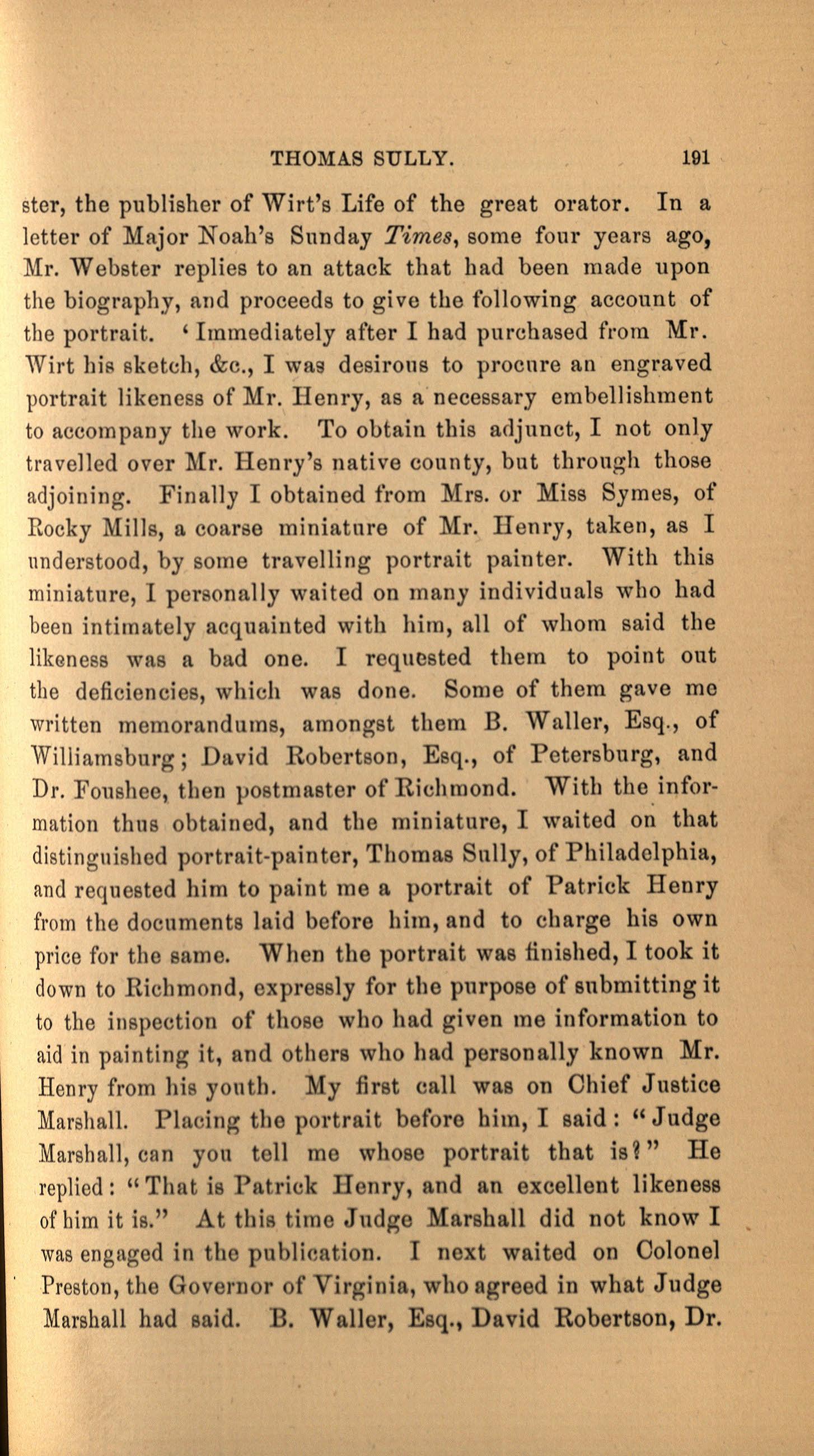
191
ster, the publisher of Wirt's Life of the great orator. In a letter of Major Noah's Sunday Times, some four years ago, Mr. Webst er replies to an attack that bad been made upon the biography, and proceeds to give the following account of the portrait. 'Immediately after I bad purchased from Mr. Wirt bis s k etc h, &c., I was desirous to procure an engraved portrait likene ss of Mr. Henry, as a necessary embellishment to accompany the work. To obtain this adjunct, I not only travelled over Mr. Henry's native county, but through those adjoining . Finally I obtained from frs. or Miss Symes, of Rocky Mills, a coarse miniature of Mr. Henry, taken, as I understood, by some travelling portrait painter. With this miniature, I per onally waited on many individuals who had been intimately acquainted with him, all of whom said the lilrnness was a bad one. I requested them to point out the deficiencies, which was done. Some of them gave mo written memorandums, amongst them B. Waller, Esq., of Williamsburg; David Robertson, Esq., of Petersburg, and Dr. Foushee, then postmaster of Richmond. With the information thus obtained, and the miniature, I ,vaited on that distinguished portrait-painter, Thomas nlly, of Philadelphia, and requested him to paint me a portrait of Patrick Henry from the documents laid before him, and to charge his own price for the same . When the portrait was finished, I took it down to Richmond, expres ly for the purpose of submitting it to the inspection of those who had given me information to aid in painting it, and others who had personally known Mr. Henry from his youth. My first call was on Chief Justice Marshall. Placing the portrait before him, I said : "Judge Marshall, can you toll me whose portrait that is i" He replied : "That is Patrick TI nry, and an excellent likeness of him it is." At this time Judge Marshall did not know I was engaged in tho publication. I next waited on Colonel Preston, the Governor of irginia, who agreed in what Judge Marshall had said. B. Waller, Esq., David Robertson, Dr.
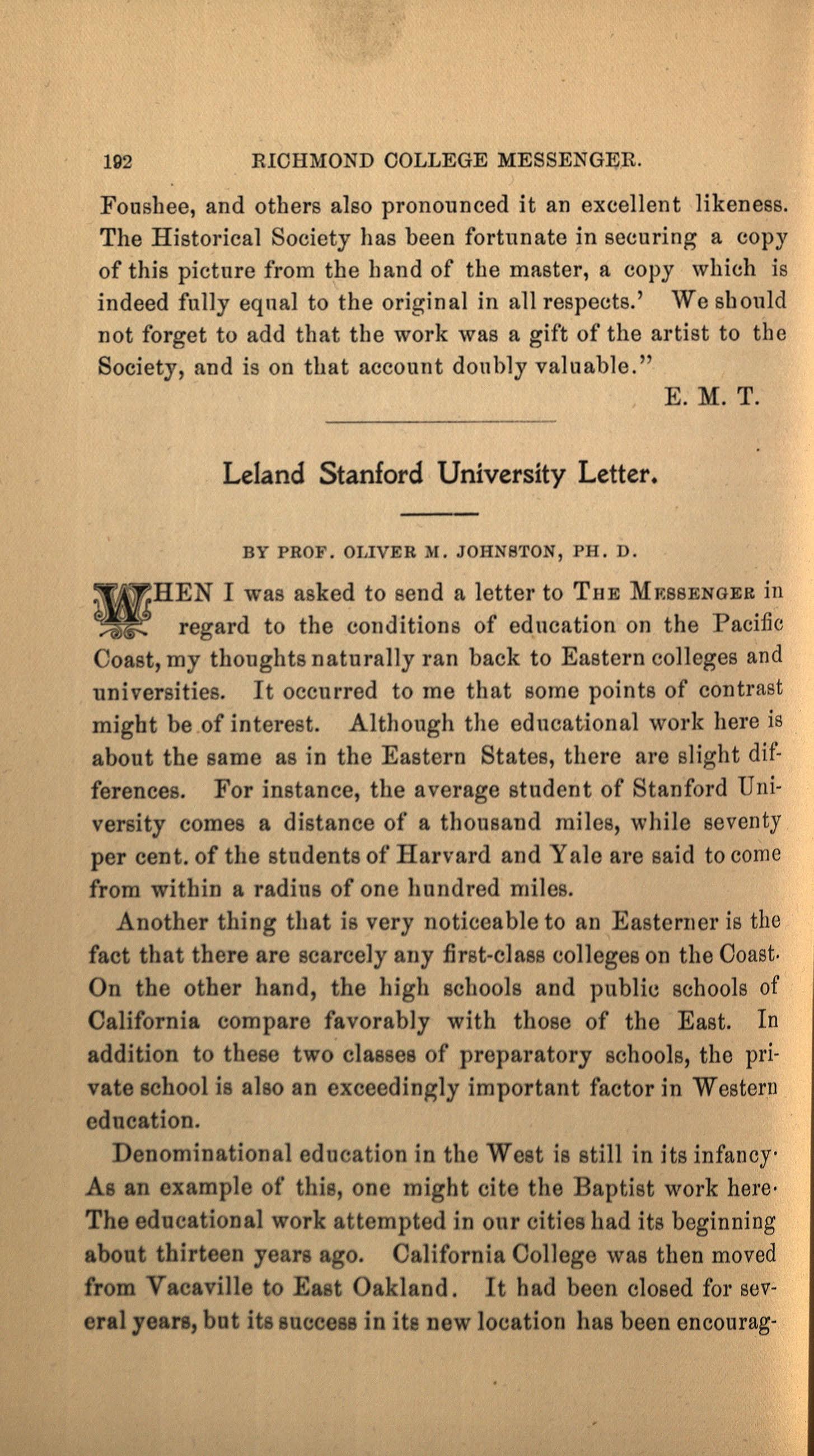
RICHMO D COLLEGE MESSENGE,R.
Foushee, and others also pronounced it an excellent likeness. The Historical Society has been fortunate in securing a copy of this picture from the band of the master, a copy which is indeed fully eqnal to the original in a1l respects.' We should not forget to add that the work was a gift of the artist to the Society, and is on that account doubly valuable." E.M.T.
BY PROF. OLIVER M. JOHNSTON, PH. D.
HE I was asked to send a letter to TnE Mir.ssENGE& in regard to the conditions of education on the Pacific Coast, my thoughts naturally ran back to Eastern colleges and universities. It occurred to me that some points of contrast might be of interest. Although the educational work here is about the same as in the Eastern States, there are slight differences. For instance, the average student of Stanford University comes a distance of a thousand miles, while seventy per cent. of the students of Harvard and Yale are said to come from within a radius of one hundred miles.
Another thing that is very noticeable to an Easterner is the fact that there are scarcely any first-class colleges on the Coast. On the other hand, the high schools and public schools of California compare favorably with those of the East. In addition to these two classes of preparatory schools, the private school is also an exceedingly important factor in Western education.
Denominational education in the West is still in Hs infancy· As an example of this, one might cite the Baptist work here• The educational work attempted in our cities had its beginning about thirteen years ago. California College was then moved from Vacaville to East Oakland. It had been closed for several years, but its success in ite new location has been encourag-
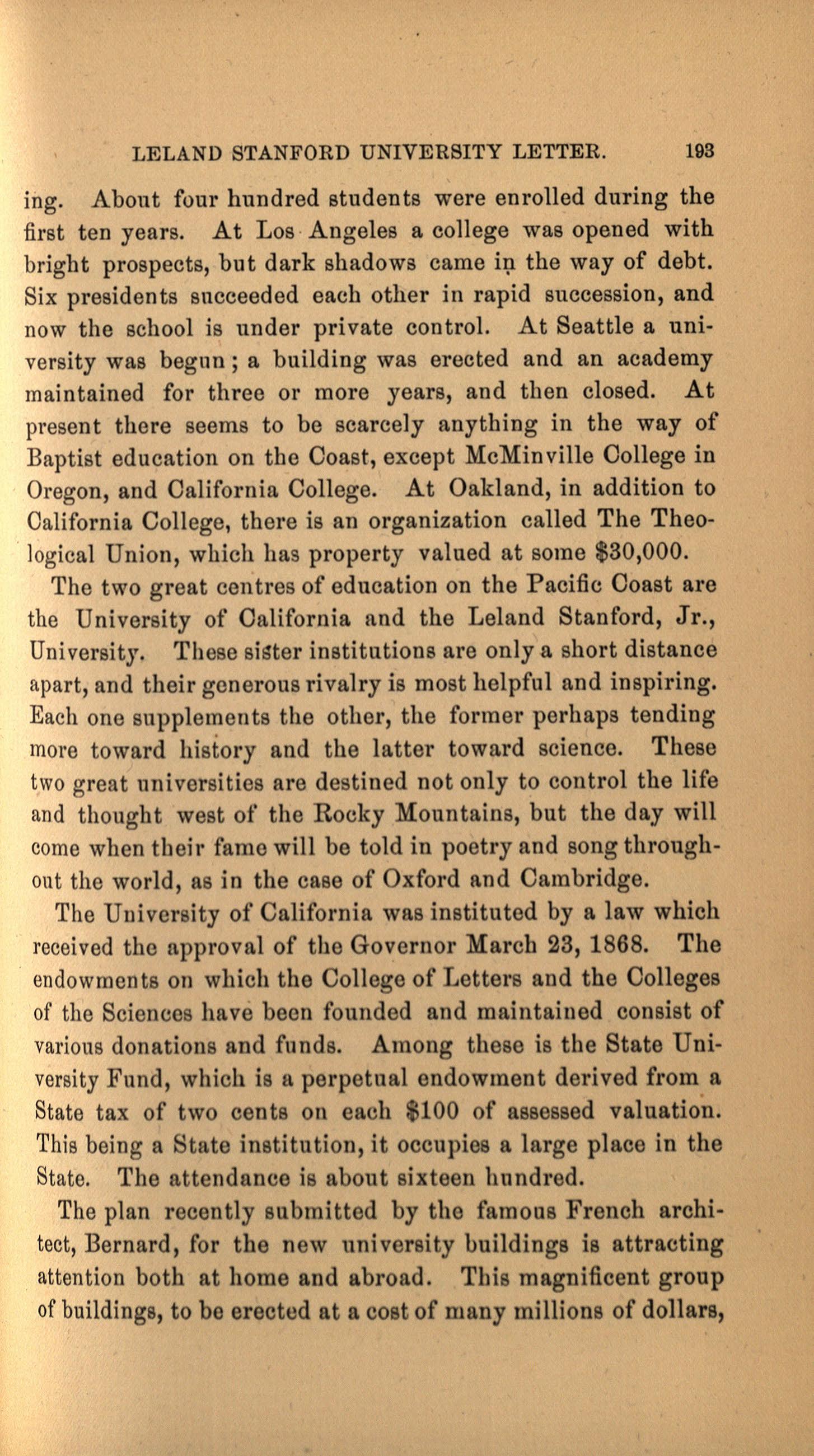
ing. About four hundred students were enrolled during the first ten years. At Los Angeles a college was opened with bright prospects, but dark shadows came ii;i the way of debt. Six presidents succeeded each other in rapid succession, and now the school is under private control. At Seattle a university was begun ; a building was erected and an academy maintained for three or more years, and then closed. At present there seems to be scarcely anything in the way of Baptist education on the Coast, except McMin ville College in Oregon, and California College. At Oakland, in addition to California College, there is an organization called The Theological Union, which has property valued at some $30,000.
The two great centres of education on the Pacific Coast are the University of California and the Leland Stanford, Jr., University . These sister institutions are only a short distance apart, and their generous rivalry is most helpful and inspiring. Each one supplements the other, the former perhaps tending more toward history and the lattel' toward science. These two great universities are destined not only to control the life and thought west of the Rocky Mountains, but the day will come when their fa.mowill be told in poetry and song throughout the world, as in the case of Oxford and Cambridge.
The University of California was instituted by a law which received tho approval of the Governor March 23, 1868. The endowments on which the College of Letters and the Colleges of the Sciences have been founded and maintained consist of various donations and funds. Among these is the State University Fund, which is a perpetual endowment derived from a State tax of two cents on each 100 of assessed valuation. This being a State institution, it occupies a large place in the State. The attendance is about sixteen hundred.
The plan recently submitted by the famoas French architect, Bernard, for the new university buildings is attracting attention both at home and abroad. This magnificent group of buildings, to be erectod at a cost of many millions of dollars,

on a campus facing the Golden Gate, will make this a most beautiful university.
The university is to be congratulated on having such a man as President Wheeler at its head. Although he has been on the Coast but a few months, his influence is already felt in all lines of educational work. He was instrumental, in part at least, in organizing a Coast Philological Association last December. The language students in the Pacific States had long felt a desire to meet together and discuss the results of their studies. The coming of President Wheeler to California seemed an opportune moment to effect such an organization. A thing that has attracted special attention to President Wheeler is his attitude toward the lower schools. Ho is a firm believer in the small college, as a place where character is made and habits of study are formed. He is also a friend of denominational colleges, and encourages them in every way possible. Consequently the under schools see in him a real helper, a man ready to grapple with the problems of education in all of its phases.
The Leland Stanford, Jr., University was founded at a time when medireval narrowness and pettiness were losing their hold, and a new era of thought was being ushered in. In March, 1884, Leland Stanford, Jr., the only child of Senator and Mrs. Stanford, died of malarial fever in Italy. To his parents, stricken with grief, and with hopes crushed, the most fitting memorial to the life so early cut off seemed to be the founding of a great univer ity, with the idea of doing for the children of California what they had hoped to do for their own son. October 1, 1891, the new university began its work. Under cloudle s skies, in the open court of tho quadrangle, the new institution was dedic-atod to the service of mankind. Amid the unbounded enthusiasm of fotmders, officers, and students, a new university made its entrance into the world. In the beginning Senator and Mrs. tanford transferred to the board of trustees about ninety thousand acres of land.
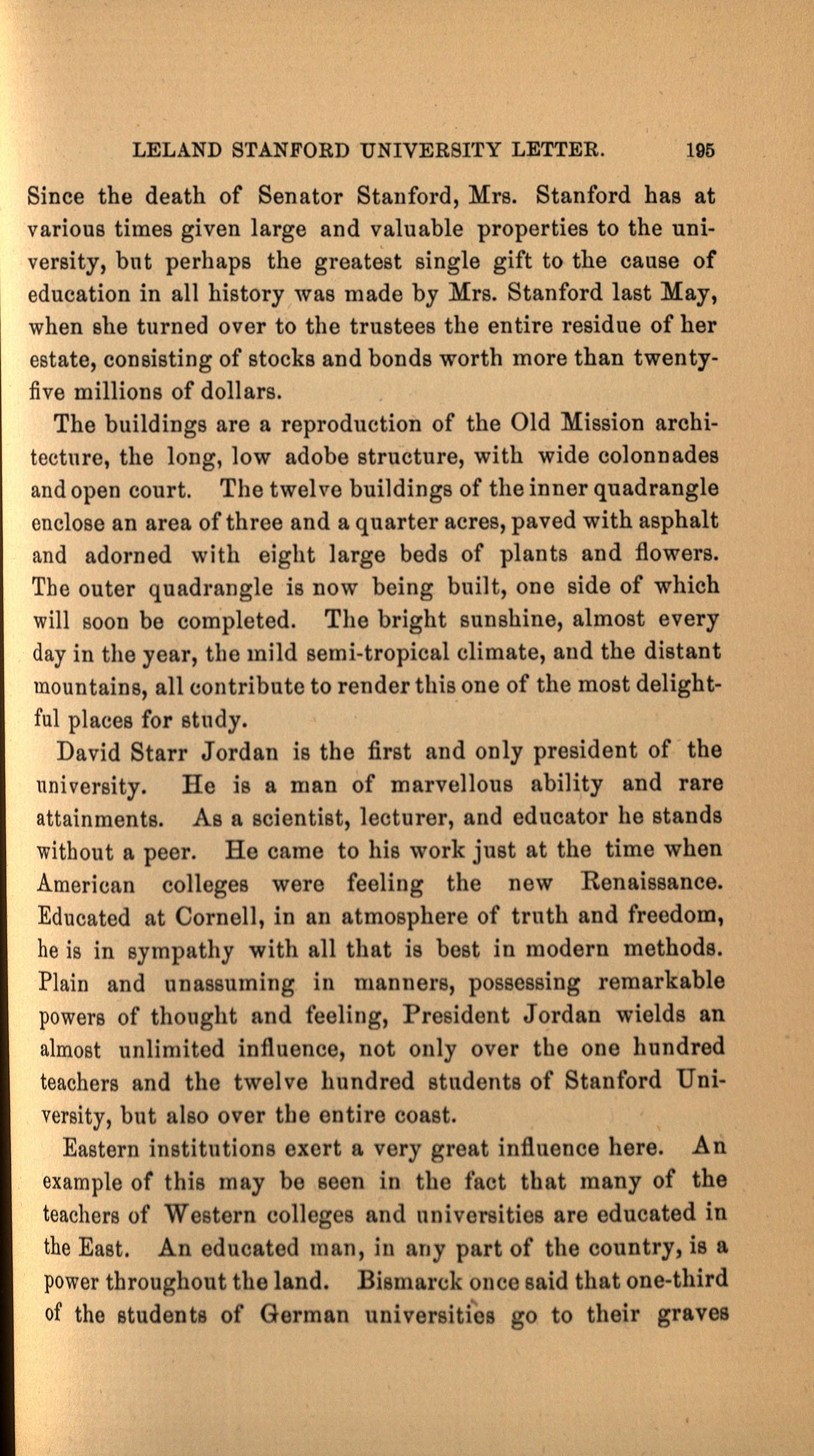
Since the death of Senator Stanford, Mrs. Stanford has at various times given large and valuable properties to the university, bnt perhaps the greatest single gift to the cause of education in all history was made by Mrs. Stanford last May, when she turned over to the trustees the entire residue of her estate, consisting of stocks and bonds worth more than twentyfive millions of dollars.
The buildings are a reproduction of the Old Mission architecture, the long, low adobe structure, with wide colonnades and open court. The twelve buildings of the inner quadrangle enclose an area of three and a quarter acres, paved with asphalt and adorned with eight large beds of plants and :flowers. The outer quadrangle is now being built, one side of which will soon be completed. The bright sunshine, almost every day in the year, the mild semi-tropical climate, and the distant mountains, all contribute to render this one of the most delightful places for study.
David Starr Jordan is the first and only president of the university. He is a man of marvellous ability and rare attainments. As a scientist, lecturer, and educator he stands without a peer. He came to his work just at the time when American colleges were feeling the new Renaissance. Educated at Cornell, in an atmosphere of truth and freedom, he is in sympathy with all that is best in modern methods. Plain and unassuming in manners, possessing remarkable powers of thought and feeling, President Jordan wields an almost unlimited influence, not only over the one hundred teachers and the twelve hundred students of Stanford University, but also over the entire coast.
Eastern institntions exert a very great influence here. An example of this may be seen in the fact that many of the teachers of Western colleges and universities are educated in the East. An educated man, in any part of the country, is a powerthroughout the land. Bismuck once said that one-third of the students of German universities go to their graves
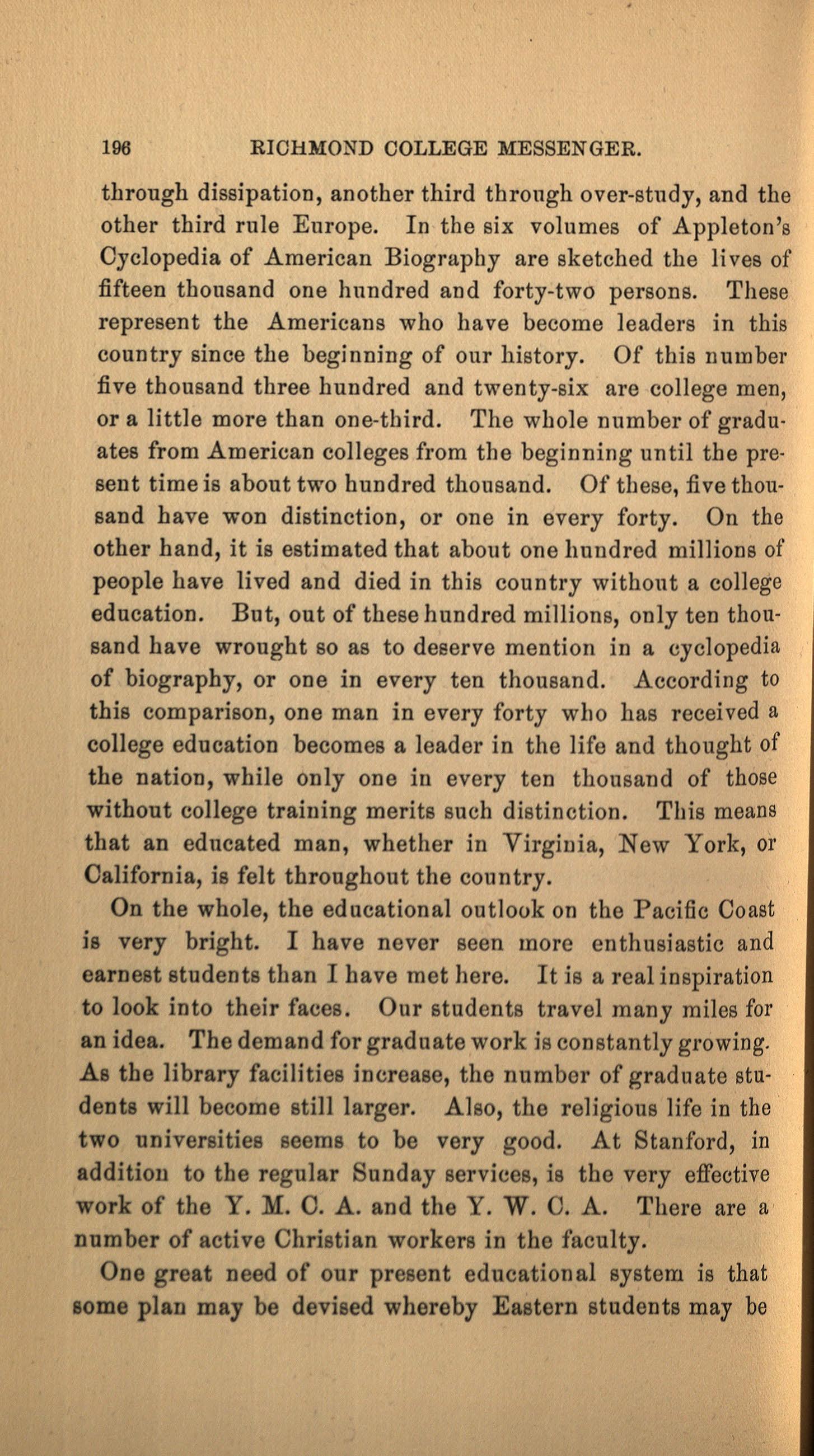
196 RICHMOND COLLEGE MESSENGER.
through dissipation, another third through over-study, and the other third rule Europe. In the six volumes of Appleton's Cyclopedia of American Biography are sketched the Ii ves of fifteen thousand one hundred and forty-two persons. These represent the Americans who have become leaders in this country since the beginning of our history. Of this number five thousand three hundred and twenty-six are college men, or a little more than one-third. The whole number of graduates from American colleges from the beginning until the present time is about two hundred thousand. Of these, :fivethousand have won distinction, or one in every forty. On the other hand, it is estimated that about one hundred millions of people have lived and died in this country without a college education. But, out of these hundred millions, only ten thousand have wrought so as to deserve mention in a cyclopedia of biography, or one in every ten thousand. According to this comparison, one man in every forty who has received a college education becomes a leader in the life and thought of the nation, while only one in every ten thousand of those without college training merits such distinction. This means that an educated man, whether in Virginia, New York, or California, is felt throughout the country.
On the whole, the educational outlook on the Pacific Coast is very bright. I have never seen more enthusiastic and earnest students than I have met here. It is a real inspiration to look into their faces. Our students travel many miles for an idea. The demand for graduate work is constantly growing. As the library facilities focrease, the number of graduate students will become still larger. Also, the religious life in the two universities seems to be very good. At Stanford, in addition to the regular unday services, is the very effective work of the Y. M. 0. A. and the Y. W. 0. A. There are a number of active Christian workers in the faculty.
One great need of our present educational system is that some plan may be devised whereby Eastern students may be
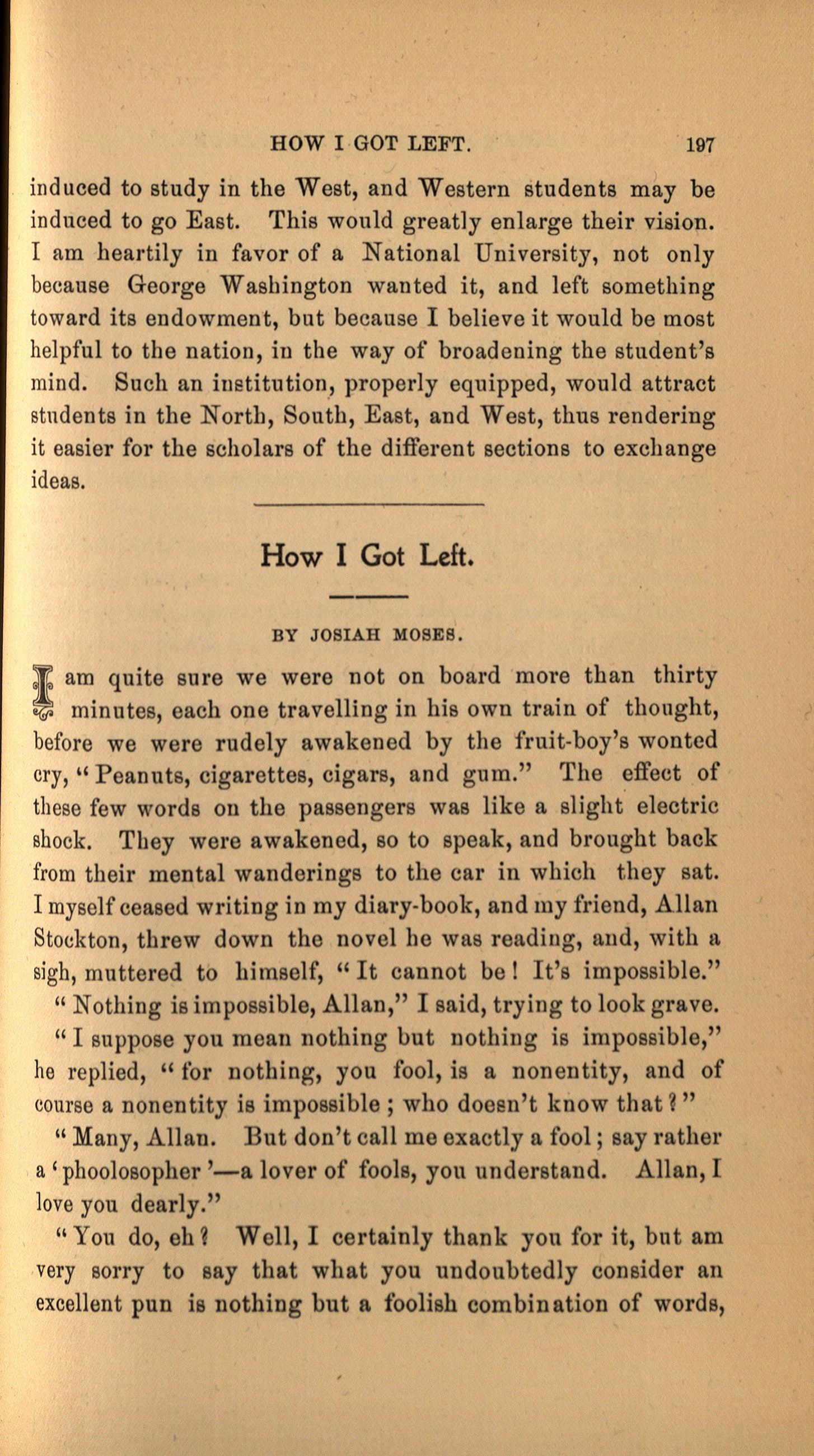
197
induced to study in the West, and Western students may be induced to go East. This would greatly enlarge their vision. I am heartily in favor of a National University, not only because George Washington wanted it, and left something toward its endowment, but because I believe it would be most helpful to the nation, in the way of broadening the student's mind. Such an institution, properly equipped, would attract students in the North, South, East, and West, thus rendering it easier for the scholars of the different sections to exchange ideas.
BY JOSIAH MOSES.
I
am quite sure we were not on board mo1·e than thirty t minutes, each one travelling in his own train of thonght, before we were rudely awakened by the fruit-boy's wonted cry, 11 Peanuts, cigarettes, cigars, and gum." The effect of these few words on the passengers was like a slight electric shock. They were awakened, so to speak, and brought back from their mental wanderings to the car in which they sat. I myself ceased writing in my diary-book, and my friend, Allan Stockton, threw down the novel be was reading, aud, with a sigh, muttered to himself, "It cannot be! It's impossible."
"Nothing is impossible, Allan," I said, trying to look grave.
"I suppose you mean nothing but nothing is impossible," he replied, "for nothing, you fool, is a nonentity, and of course a nonentity is impossible; who doesn't know that 1"
"Many, Allan. But don't call me exactly a fool; say rather a' phoolosopher '-a lover of fools, you understand. Allan, I loveyou dearly."
"You do, eh~ Well, I certainly thank you for it, but am very sorry to say that what you undoubtedly consider an excellent pun is nothing but a foolish combination of words,
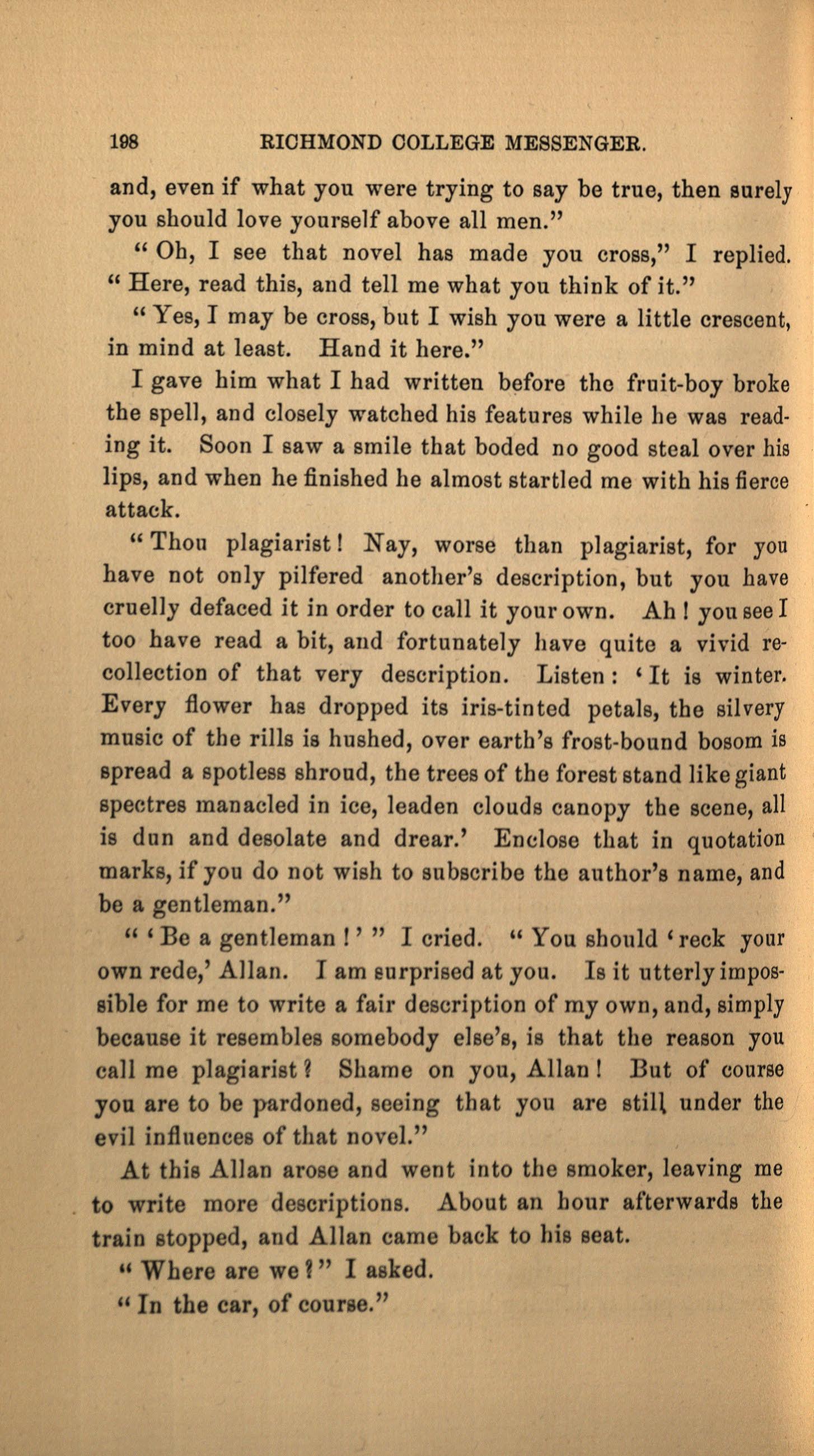
198 RICHMOND COLLEGE MESSENGER.
and, even if what you were trying to say be true, then surely you should love yourself above all men."
" Oh, I see that novel has made you cross," I replied. "Here, read this, and tell me what you think of it."
" Yes, I may be cross, but I wish you were a little crescent, in mind at least. Hand it here."
I gave him what I had written before tho fruit-boy broke the spel1, and closely watched his features while he was read• ing it. Soon I saw a smile that boded no good steal over his lips, and when he finished he almost startled me with his fierce attack.
"Thon plagiarist I Nay, worse than plagiarist, for you have not only pilfered another's description, but you have cruelly defaced it in order to call it your own. Ah I you see I too have read a bit, and fortunately have quite a vivid recollection of that very description. Listen: 'It is winter. Every flower has dropped its iris-tinted petals, the silvery music of the rills is hushed, over earth's frost-bound bosom is spread a spotless shroud, the trees of the forest stand like giant spectres manacled in ice, leaden clouds canopy the scene, all is dun and desolate and drear.' Enclose that in quotation marks, if you do not wish to subscribe the author's name, and be a gentleman."
" ':Be a gentleman I' " I cried. " You should 'reek your own rede,' A1lan. I am eurprised at you. Is it utterlyimpos· sible for me to write a fair description of my own, and, simply because it resembles somebody else's, is that the reason you call me plagiarist i Shame on yon, Allan ! But of course you are to be pardoned, seeing that you are still under the evil influences of that novel."
At this Allan arose and went into the smoker, leaving me to write more descriptions. About an hour afterwards the train stopped, and Allan came back to his seat.
" Where are wet" I asked.
"In the car, of course."
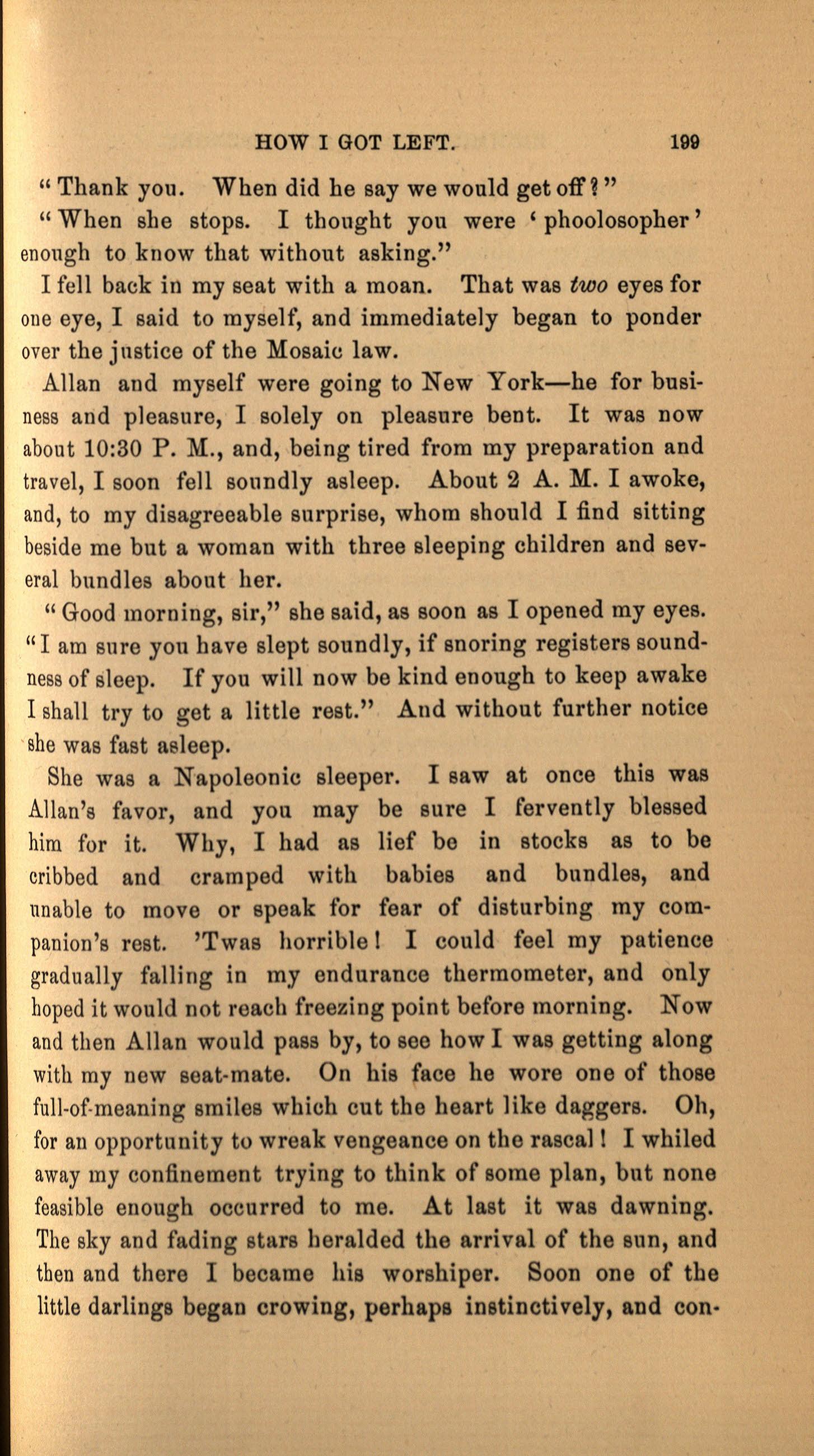
" Thank you. When did he say we would get off i" "When she stops. I thought you were ' phoolosopher' enough to know that without asking."
I fell back in my seat with a moan. That was two eyes for one eye, I said to myself, and immediately began to ponder over the justice of the Mosaic law.
Allan and myself were going to New York-he for business and pleasure, I solely on pleasure bent. It was now about 10:30 P. M., and, being tired from my preparation and travel, I soon fell soundly asleep. About 2 A. M. I awoke, and, to my disagreeable surprise, whom should I :find sitting beside me but a woman with three sleeping children and several bundles about her.
"Good morning, sir," she said, as soon as I opened my eyes. "I am s ure you have slept soundly, if snoring registers soundness of sleep. If you will now be kind enough to keep awake I shall try to get a little rest." And without further notice she was fast asleep.
She was a Napoleonic sleeper. I saw at once this was Allan' s favor, and you may be sure I fervently blessed him for it. Why, I had as lief be in stocks as to be cribbed and cramped with babies and bundles, and unable to move or speak for fear of disturbing my companion's rest. 'Twas horrible I I could feel my patience gradually falling in my endurance thermometer, and only hoped it would not reach freezing point before morning. Now and then Allan would pass by, to see how I was getting along with my new seat-mate. On his face he wore one of those full-of-meaning smiles which cut the heart like daggers. Oh, for an opportunity to wreak vengeance on the rascal I I whiled awaymy confinement trying to think of some plan, but none feasible enough occurred to me. At last it was dawning. The sky and fading stars heralded the arrival of the sun, and then and there I became hie worshiper. Soon one of the little darlings began crowing, perhaps instinctively, and con-
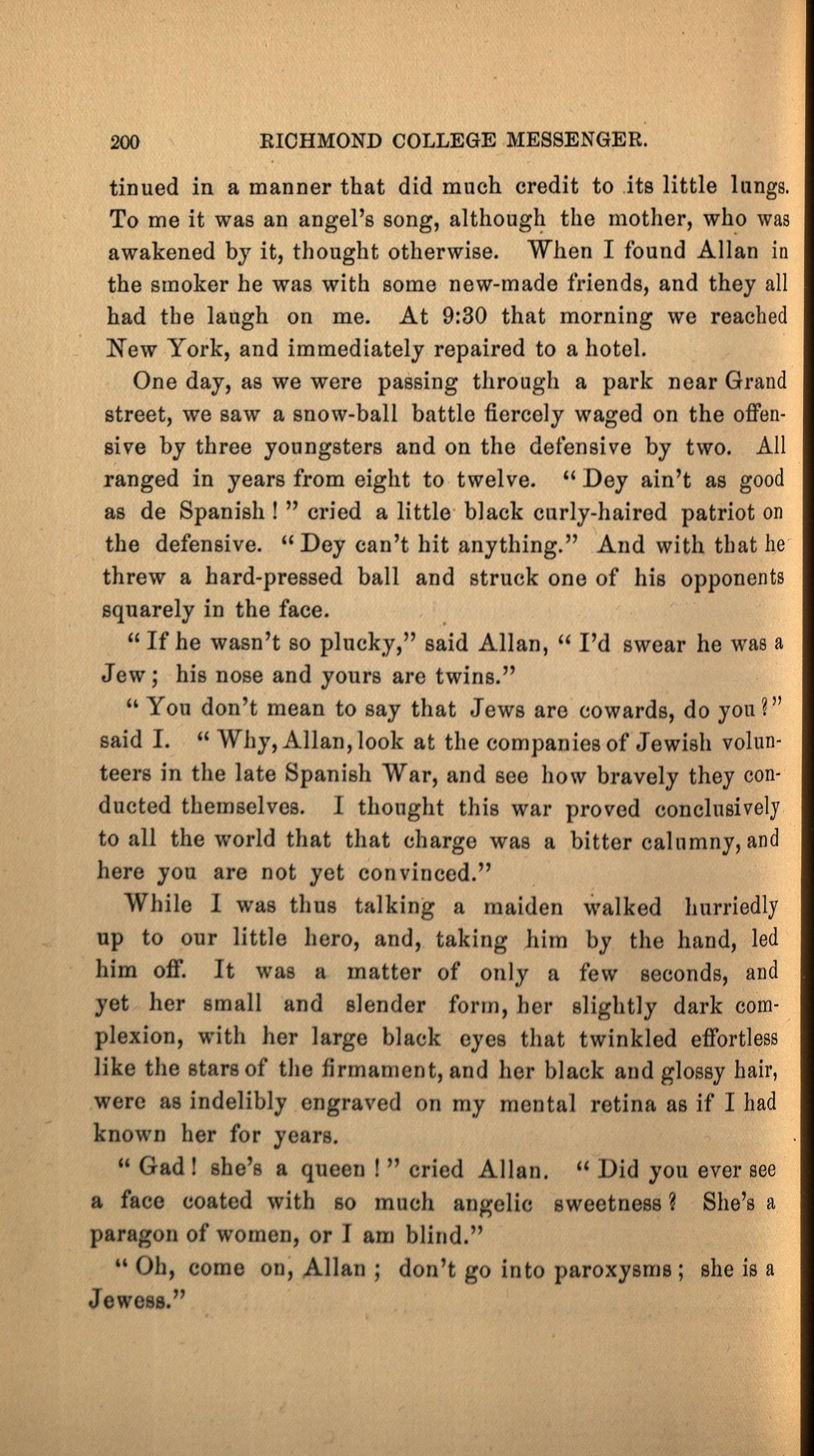
200 RICHMOND COLLEGE MESSENGER.
tinued in a manner that did much credit to .its little lungs. To me it was an angel's song, a1thoug~ the mother, wh o was awakened by it, thought otherwise. When I found Allan in the smoker he was with some new-made friends, and they all had the laugh on me. At 9:30 that morning we reached New York, and immediately repaired to a hotel.
One day, as we were passing through a park near Grand street, we saw a snow-ball battle fiercely waged on the offensive by three youngsters and on the defensive by two. .All ranged in years from eight to twelve. "Dey ain't as good as de Spanish I " cried a little black c11rly-haired patriot on the defensive. "Dey can't hit anything." And with that he threw a hard-pressed ball and struck one of his opponents squarely in the face.
"If he wasn't so plucky," said Allan, "I'd swear he was a Jew; his nose and yours are twins."
"You don't mean to say that Jews are cowards, do you?" said I. "Why, Allan, look at the companies of Jewish volun· teers in the late Spanish War, and see how bravely they con· ducted themselves. I thought this war proved conclusively to all the world that that charge was a bitter calnmny, and here you are not yet convinced."
While I was tlrns talking a maiden ,valked hurriedly up to our little hero, and, taking him by the hand, led him off. It was a matter of only a few seconds, and yet her small and slender form, her slightly dark com· plexion, with her large black eyes that twinkled effortless like the stars of the firmament, and her black and glossy hair, were as indelibly engraved on my mental retinA. as if I had known her for years.
" Gad I she's a queen I " cried Allan. " Did you ever see a face coated with so much angelic sweetness? She's a paragon of women, or I am blind."
"Oh, come on, Allan; don't go into paroxysms; she is a Jewess."
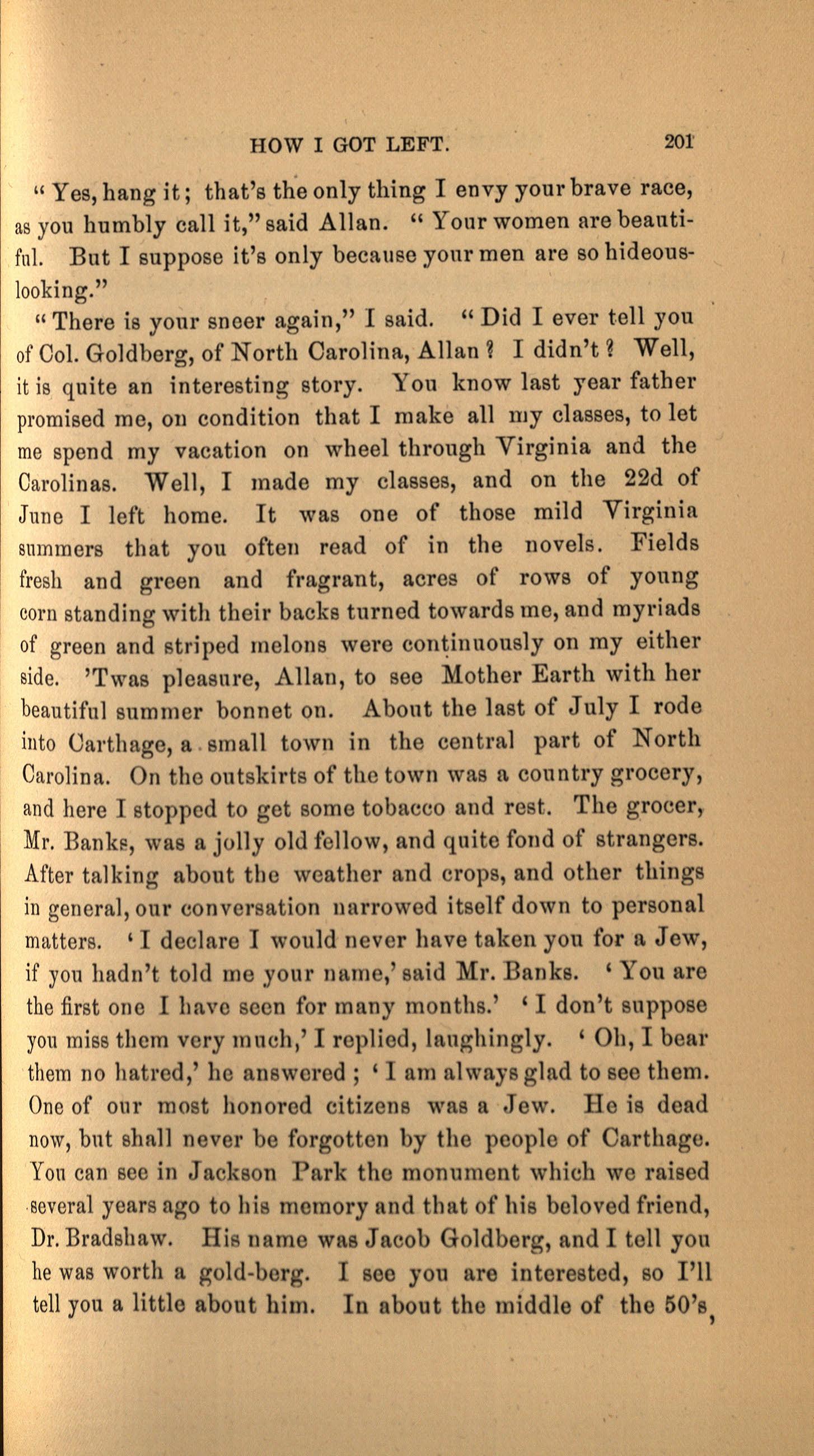
HOW I GOT LEFT. 20!
"Yes, hang it; that's the only thing I envy your brave race, as you humbly call it," said Allan. " Your women are beautifnl. But I suppose it's only because your men are so hideouslooking."
"There is your sneer again," I said. "Did I ever t.ell you of Col. Goldberg, of North Carolina, Allan¥ I didn't~ Well, it is quite an interesting story. You know last year father promised me, Oll condition that I make all my classes, to let me spend my vacation on wheel through Virginia and the Carolinas. Well, I made my classes, and on the 22d of June I left home. It was one of those mild Virginia summers that you ofteu read of in the novels. Fields fresh and green and fragrant, acres of rows of young cornstanding with their backs turned towards me, and myriads of green and striped melons were con~innously on my either side. 'Twas pleasure, Allan, to see Mother Earth with her beautiful summer bonnet on. About the last of July I rode into Oartbage, a small town in the central part of North Carolina. On the outskirts of the town was a country grocery, and here I stopped to get some tobacco and rest. The grocer, Mr.Banke, was a jolly old fellow, and quite fond of strangers. After talking about the weather and crops, and other things in general, our conversation narrowed itself down to personal matters. 'I declare I would never have taken you for a Jew, if you hadn't told mo your nam ,' said Mr. Banks. 'You are the first one I have seen for many months.' 'I don't suppose you miss them very mnch,' I replied, laughingly. ' Oh, I bear them no hatred,' he answered; 'I am always glad to see them. One of our most honored citizens was a Jew. He is dead now,bnt shall never be forgotten by the people of Carthage. Yoncan see in Jackson Park tho monument which we raised severalyears ago to his memory and that of his beloved friend, Dr.Bradshaw. Hi uame wa.s Jacob Goldberg, and I tell yon he was worth a gold-berg. I see you i\re interested, so I'll tell you a little about him. In about the middle of the 50's '
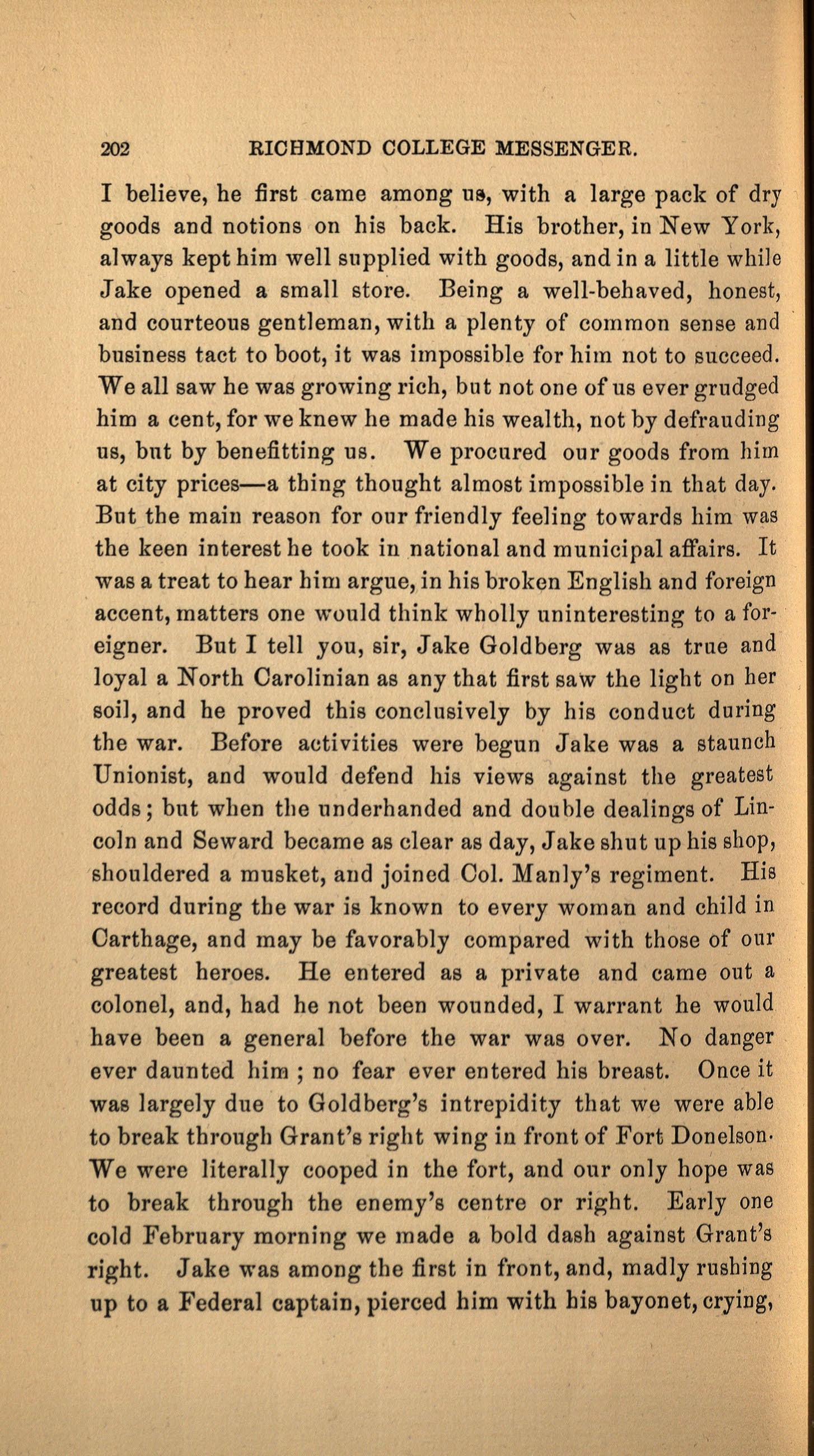
RICHMOND COLLEGE MESSENGER.
I believe, he :first came among us, with a large pack of dry goods and notions on his back. His brother, in New York, always kept him well supplied with goods, and in a little while Jake opened a small store. Being a well-behaved, honest, and courteous gentleman, with a plenty of common sense and · business tact to boot, it was impossible for him not to succeed. We all saw be was growing rich, but not one of us ever grudged him a cent, for we knew be made his wealth, not by defrauding us, bnt by benefitting us. We procured our goods from him at city prices-a thing thought almost impossible in that day. But the main reason for our friendly feeling towards him was the keen interest he took in national and municipal affairs. It was a treat to bear him argue, in his brokc;m English and foreign accent, matters one would think wholly uninteresting to a foreigner. But I tell you, sir, Jake Goldberg was as true and loyal a North Carolinian as any that first saw the light on her soil, and he proved this conclusively by bis conduct during the war. Before activities were begun Jake was a staunch Unionist, and would defend his views against the greatest odds; but when the underhanded and double dealings of Lincoln and Seward became as clear as day, Jake shut up his shop, shouldered a musket, and joined Col. Manly's regiment. His record during the war is known to every woman and child in Carthage, and may be favorably compared with those of our greatest heroes. He entered as a private and came out a colonel, and, had be not been wounded, I warrant he would have been a general before the war was over. No danger ever daunted him; no fear ever entered his breast. Once it was largely due to Goldberg's intrepidity that we were able to break through Grant's right wing in front of Fort Donels~n• We were literally cooped in the fort, and our only hope was to break through the enemy's centre or right. Early one cold February morning we made a bold dash against Grant's right. Jake was among the first in front, and, madly rushing up to a Federal captain, pierced him with bis bayonet, crying,
HOW I GOT LEFT.
"Come on, men ; they are running I" The whole Federal brigade was thrown in to confusion, a1lowing us to rush right through them. This is but an illustration of the daring he displayed in every battle he was engaged in. When next winter we were left without supplies, and the majority of us almost naked, Jake permitted his store to be opened and everything taken for the army. All his savings, some four thousand dollars or more, he gave to the cause. It was in the battle of Franklin that he was made colonel. How vividly I remember that 30th of November, when we attacked Schofield's entrenchments around Franklin. Eleven of our generals were killed or wounded in that battle. When Colonel Manly fell , from his horse, with a bu1let in his right temple, Goldberg, who was his captain, dashed boldly forward in his place, and manreuvred the lines so fearlessly and skilfully that before night-fall he gained a commanding position. Unfortunately, however, he was wounded both in the arm and side, and had to be taken from the field. His life was several times despaired of, but, owing to his great courage arid will-power, he managed to pnll through. When h~ was again :fit for service the war was over. You young men have a fairly good notion of our condition after the wa1·from the recent novels, so I need not tell you about it. Goldberg took to farming with Mr. Clarkson, but the atrophied hands of Jacob were too tender for the plow, and he had to give it up. Our community, rather than let him return to bis brother, in New York, raised by subscription a purse of $250, and presented it to him in recognition of his true friendship towards us, his pure patriotism, his liberality, and the wonderful courage and ability he displayed during the war. Judge Parrish, once mayor of Carthage, made the presentation speech, and he didn't fail to heap -eulogies, encomiums, and panegyrics on Jake for the courage, the boldness, and the military tactics he displayed during the war. "He showedthe daring and intrepidity," said the Judge, in his con.
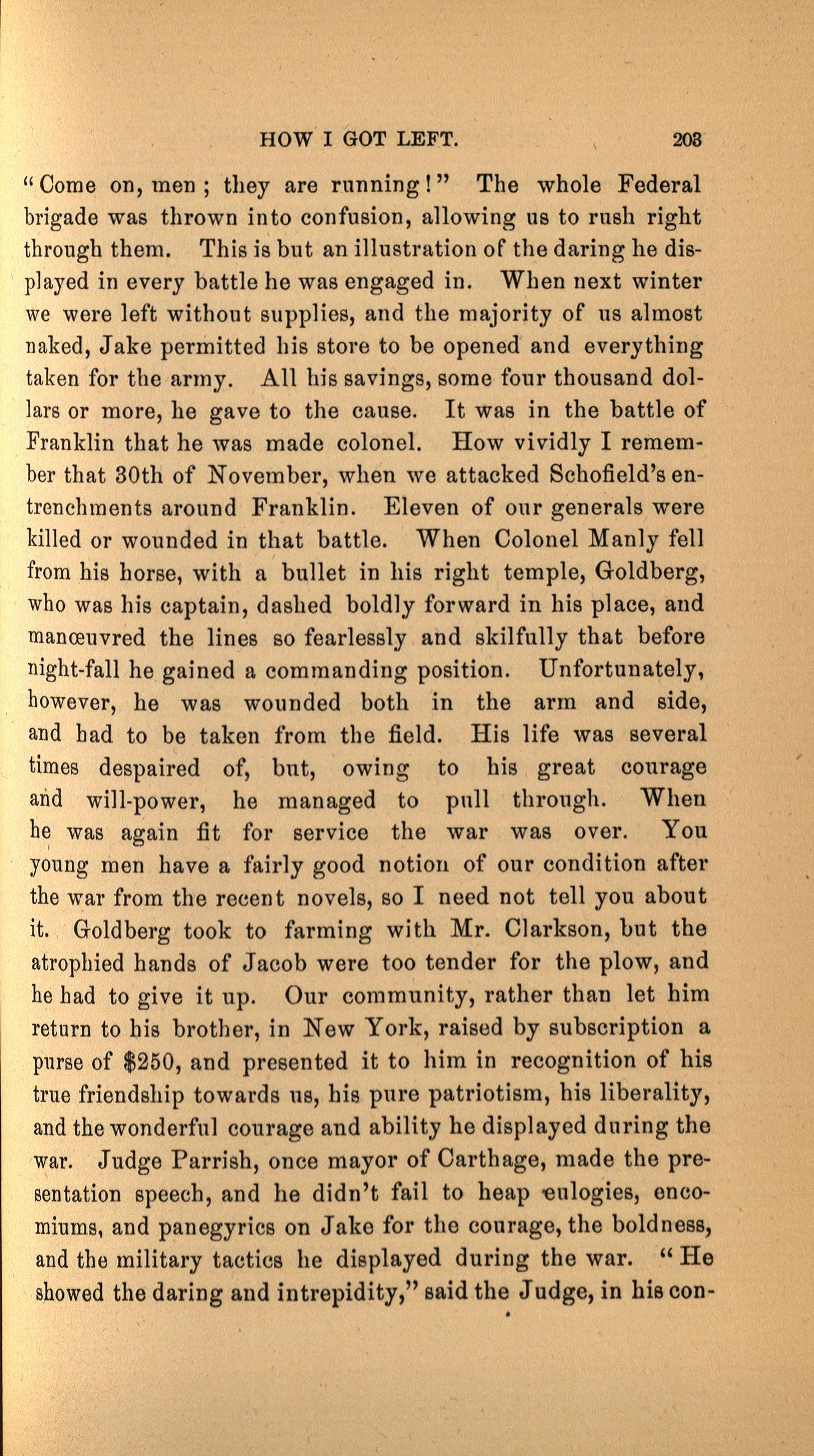
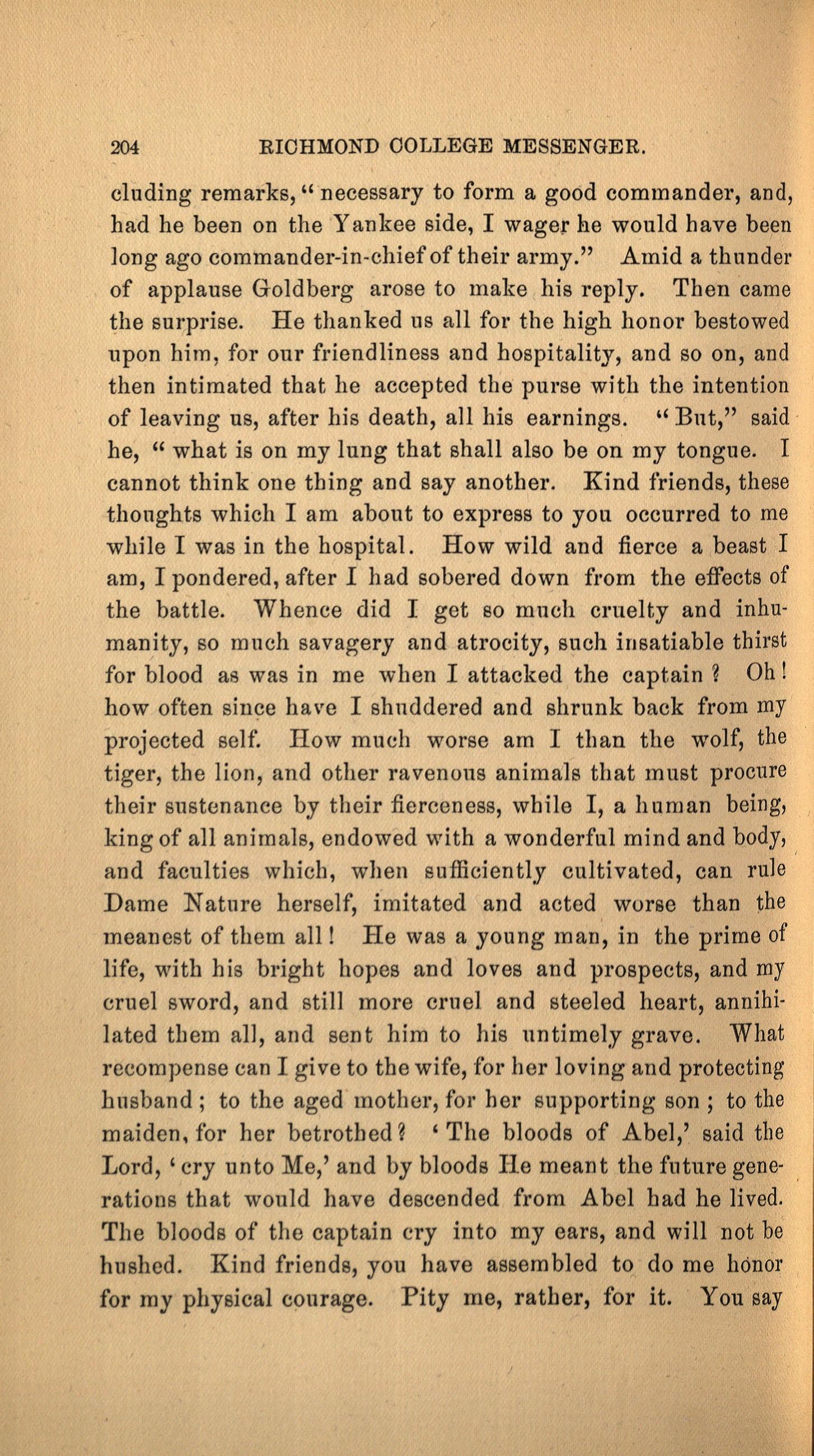
RICHMOND COLLEGE MESSENGER.
eluding remarks," necessary to form a good commander, and, had he been on the Yankee side, I wager he would have been long ago commander-in-chief of their army." Amid a thunder of applause Goldberg arose to make his reply. Then came the surprise. He thanked us all for the high honor bestowed upon him, for our friendliness and hospitality, and so on, and then intimated that he accepted the purse with the intention of leaving us, after his death, all his earnings. "But," said he, " what is on my lung that shall also be on my tongue. I cannot think one thing and say another. Kind friends, these thoughts which I am about to express to you occurred to me whfle I was in the hospital. How wild and fierce a beast I am, I pondered, after I had sobered down from the effects of the battle. Whence did I get so much cruelty and inhumanity, so mnch savagery and atrocity, such insatiable thirst for blood as was in me when I attacked the captain Oh! how often sin~e have I shuddered and shrunk back from my projected self. How much worse am I than the wolf, the tiger, the lion, and other ravenous animals that must procure their sustenance by their fierceness, while I, a human being, king of all animals, endowed with a wonderful mind and body, , and faculties which, wl1en sufficiently cultivated, can rule Dame Nature herself, imitated and acted worse than the meanest of them all! He was a young man, in the prime of life, with bis bright hopes and loves and prospects, and my cruel sword, and still more cruel and steeled heart, annihilated them all, and sent him to his untimely grave. What recompense can I give to the wife, for her loving and protecting husband; to the aged mother, for her supporting son ; to the maiden, for her betrothed? ' The bloods of Abel,' said the Lord, 'cry unto Me,' and by bloods He meant the future generations that would have descended from Abel bad he lived. The bloods of the captain cry into my ears, and will not be hushed. Kind friends, you have assembled to do me honor for my physical courage. Pity me, rather, for it. You say
I p erformed my duty. If it was my duty, it was a sad one, and deserve s no honor. Though King David waged war with Di vine aid and sanction, he was not allowed the honor of buildin g th e temple. If you land courage and cruelty, tear down th e monument s to your heroes and erect in Pyrian mar ble m em ori al s to your favorite lions or dogs, for they are nearer t h e ' T asmanian devil' than your heroes were. Yon have gat h er ed to do me honor for killing men, while the name of Dr. Br a dsh aw, who toiled night and day, and saved ten tim es as many lives as I destroyed, is unmentioned. I tell you , fri end s, truer word s were never spoken than these :
'Th e drying up a sin g le tear bas more Of hone st fame than shedding seas of gore.'
Now that the war is over, let us not eulogize and idolize those th at p arti cipated in it, but rather weep with them over it, as did the Duke when he said, 'Nothing but a battle lost can b e half so melancholy as a battle won.'" The effec t of thi s speech was wonderful. Some seized Goldberg and bore him hi g h on their shoulders, while others ran t o D r . Br ad sh a w's office, and, likewise placing him upon their should er s, the two parties ~ried: "Goldberg and Bradshaw! Bradshaw and Goldberg! " And now they stand in stoµe, hand in h a nd, two true friends that they were.' "
"Th at' s enou g h," cried Allan. "I have read many hist ori es an d chronicle s, and have never seen the name of Goldberg in any of them. Here! we are late. It is now six minutes of 8 o'clock, and we promised to be there at 8. Come on!"
[TO l3E CONTINUED.]
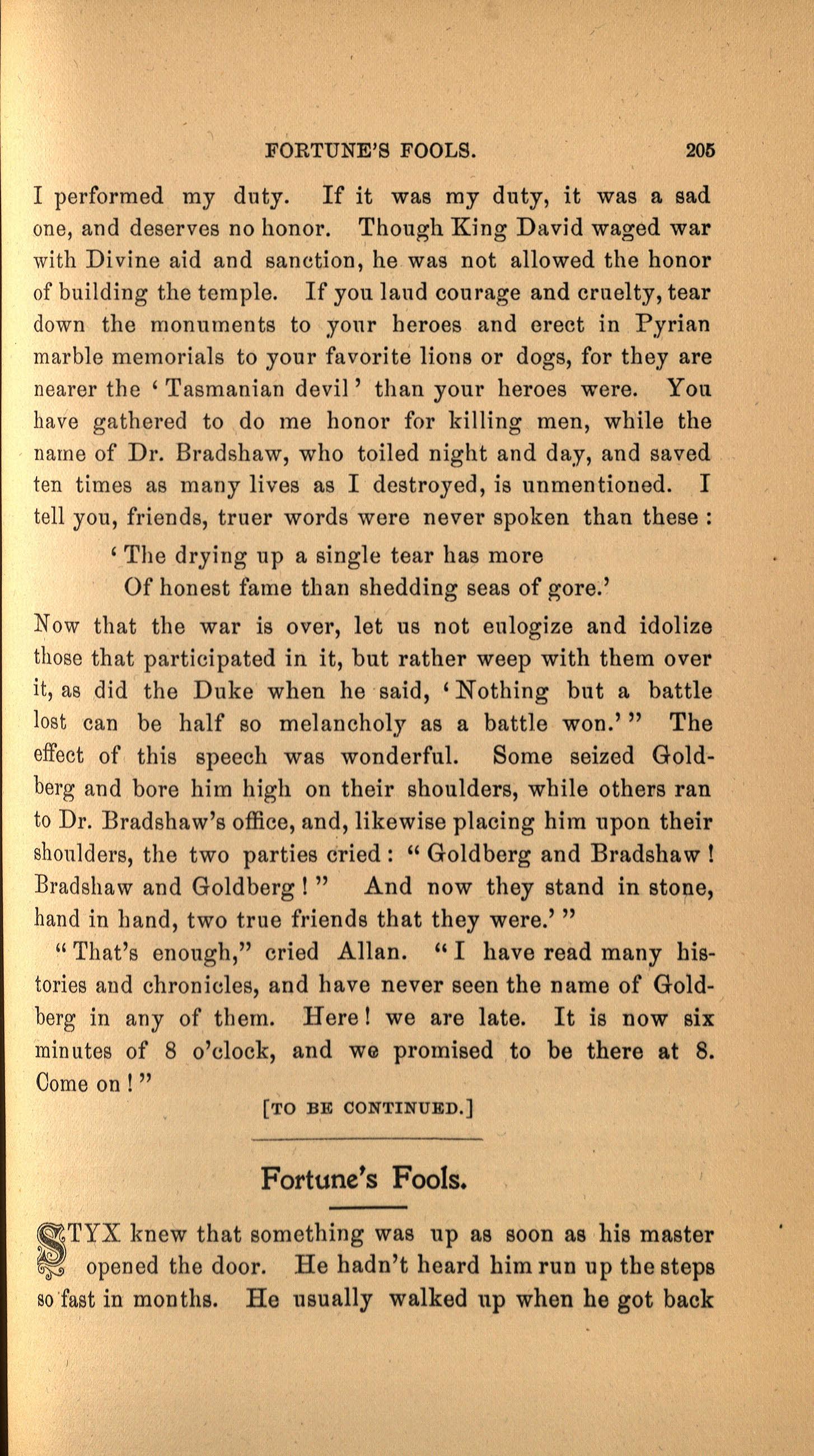
~ T YX kn ew that something was up as soon as his master open ed th e door. He hadn't heard him run up the steps so fast in months. He usually walked up when he got back
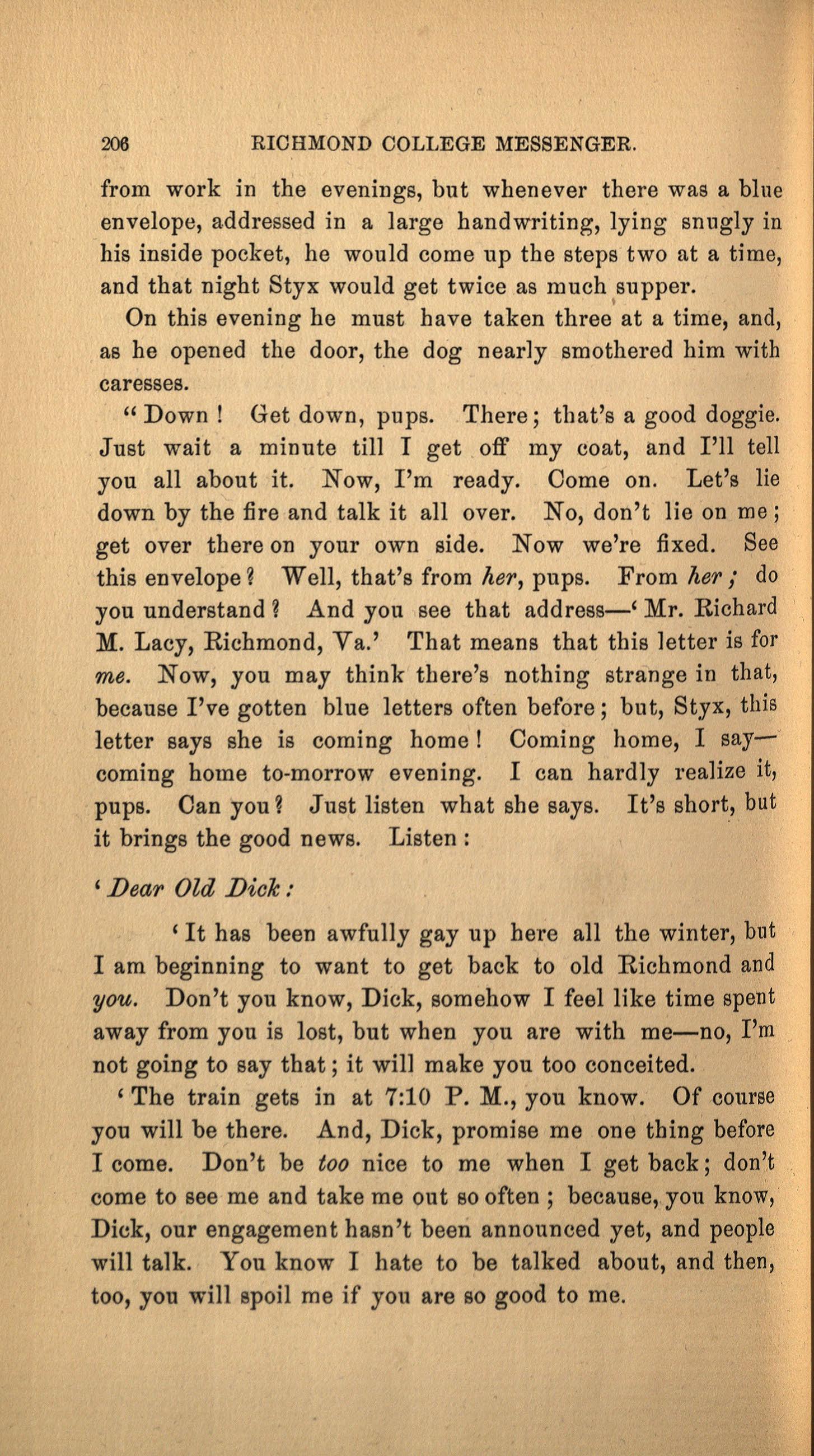
RICHMOND COLLEGE MESSENGER.
from work in the evenings, but whenever there was a blue envelope, addressed in a large handwriting, lying snugly in his inside pocket, he would come up the steps two at a time, and that night Styx would get twice as much supper. I
On this evening he must have taken three at a time, and, as he opened the door, the dog nearly smothered him with caresses.
"Down ! Get down, pups. There; that's a good doggie. Just wait a minute till I get off my coat, and I'll tell you all about it. Now, I'm ready. Come on. Let's lie down by the fire and talk it all over. No, don't lie on me; get over there on your own side. Now we're fixed. See this envelope? Well, that's from her, pups. From her; do you understand 1 And you see that address-' Mr. Richard M. Lacy, Richmond, Va.' That means that this letter is for me. Now, you may think there's nothing strange in that, because I've gotten blue letters often before; but, Styx, this letter says she is coming home ! Coming home, I saycoming home to-morrow evening. I can hardly realize it, pups. Can you? Just listen what she says. It's short, but it brings the good news. Listen :
' .Dear Old .Dick :
'It has been awfully gay up here all the winter, but I am beginning to want to get back to old Richmond and you. Don't you know, Dick, somehow I feel like time spent away from yon is lost, but when you are with me-no, I'm not going to say that; it will make you too conceited.
'The train gets in at 7:10 P. M., you know. Of course you will be there. And, Dick, promise me one thing before I come. Don't be too nice to me when I get back; don't come to see me and take me out so often; because, you know, Dick, our engagement hasn't been announced yet, and people will talk. You know I hate to be talked about, and then, too, you will spoil me if you are so good to me.
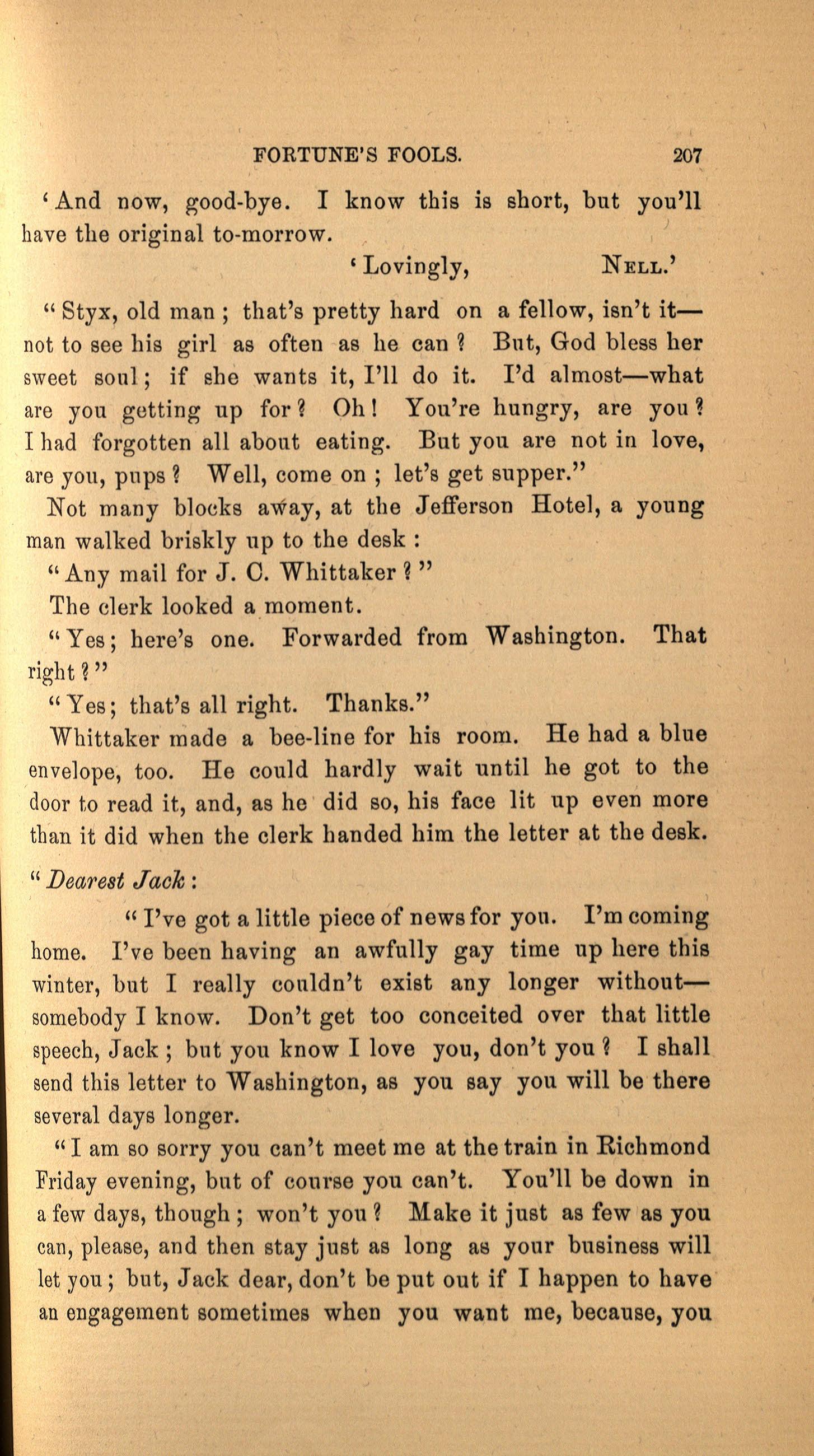
'And now, good-bye . I know this is short, but you ' ll have the original to-morrow.
"Styx, old man; that's pretty hard on a fellow, isn't itnot to see bis girl as often as he can? But, God bless her sweet soul; if she wants it, I'll do it. I'd almost-what are you getting up for? Oh I You're hungry, are you! I had forgotten all about eating. But you are not in love, are you, pups? Well, come on ; let's get supper."
Not many blo~ks away, at the Jefferson Hotel, a young man walked briskly up to the desk : "Any mail for J. 0. Whittaker? "
The clerk looked a moment.
"Yes; here's one. Forwarded from Washington. That right~"
"Ye s ; that's all right. Thanks."
Whittaker made a bee-line for his room. He had a blue envelope, too. He could hardly wait until he got to the door to read it, and, as he did so, his face lit up even more than it did when the clerk banded him the letter at the desk.
"Dearest Jack:
"I've got a little piece of news for yon. I'm coming home. I've been having an awfully gay time up here this winter, but I really couldn't exist any longer withoutsomebody I know. Don't get too conceited over that little speech,Jack ; but you know I love you, don't you? I shall send this letter to Washington, as you say you will be there several days longer.
"I am so sorry you can't meet me at the train in Richmond Friday evening, but of course you can't. You'll be down in a few days, though ; won't you ? Make it just as few as you can, please, and then stay just as long as your business will let you; but, Jack dear, don't be put out if I happen to have an engagement sometimes when you want me, because, you
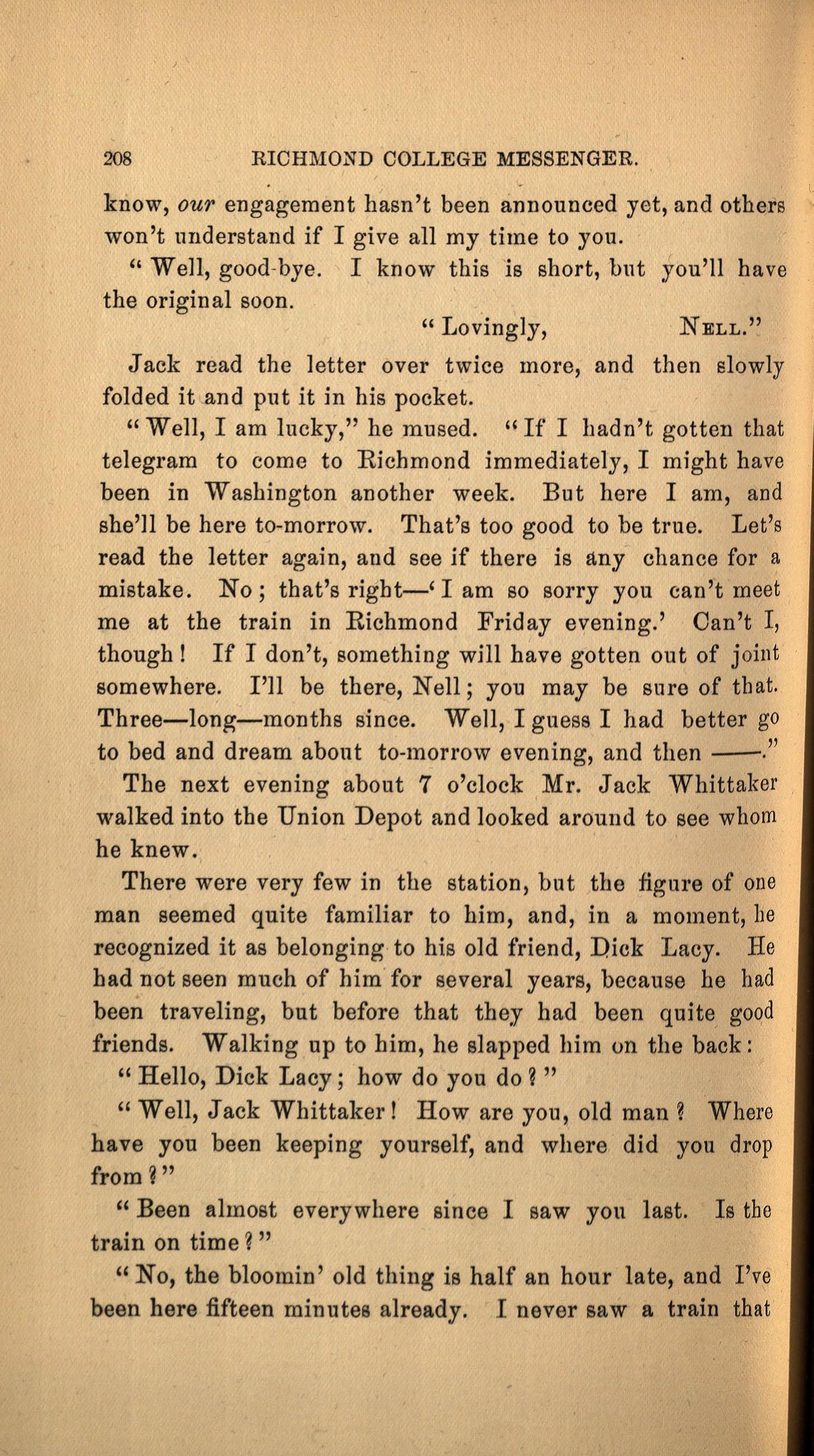
RICHMOND COLLEGE MESSENGER.
know, our engagement hasn't been announced yet, and others won't understand if I give all my time to you.
'' Well, good-bye. I know this is short, but you'll have the original soon.
"Lovingly, NELL."
Jack read the Jetter over twice more, and then elowly folded it ,and put it in his pocket.
"Well, I am lucky," he mused. "If I hadn't gotten that telegram to come to Richmond immediately, I might have been in Washington another week. But here I am, and she'll be here to-morrow. That's too good to be true. Let's read the letter again, and see if there is any chance for a mistake. No; that's right-' I am so sorry you can't meet me at the train in Richmond Friday eyening.' Can't I, though I If I don't, something will have gotten out of joint somewhere. I'll be there, Nell; you may be sure of that. Three-long-months since. Well, I guess I had better go to bed and dream about to-morrow evening, and then -."
The next evening about 7 o'clock Mr. Jack Whittaker walked into the Union Depot and looked around to see whom he knew.
There were very few in the station, but the figure of one man seemed quite familiar to him, and, in a moment, he recognized it as belonging to his old friend, Dick Lacy. He had not seen much of him ·for several years, because he had been traveling, but before that they had been quite goqd friends. Walking up to him, he slapped him on the back:
" Hello, Dick Lacy; how do you do i "
"Well, Jack Whittaker I How are you, old man~ Where have you been keeping yourself, and where did you drop from?"
"Been almost everywhere since I saw you last. Is the train on time?"
"No, the bloomin' old thing is half an hour late, and I've been here fifteen minutes already. I never saw a train that
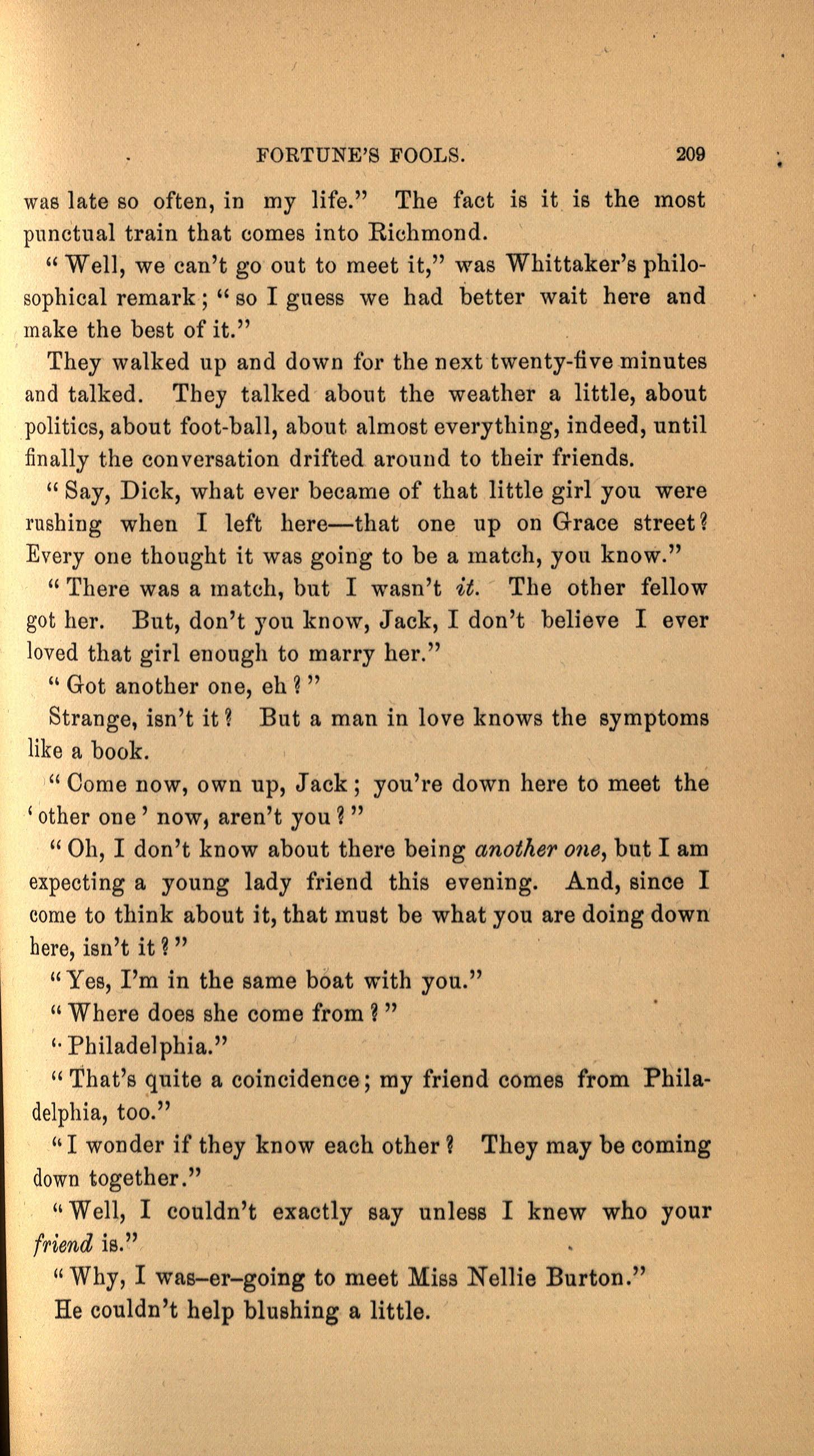
209 was late so often, in my life." The fact is it is the most punctual train that comes into Richmond.
"Well, we can't go out to meet it," was Whittaker's philosophical remark ; " so I guess we had better wait here and make the best of it."
They walked up and down for the next twenty-five minutes and talked. They talked about the weather a little, about .Politics, about foot-ball, about almost everything, indeed, until finally the conversation drifted around to their friends.
"Say, Dick, what ever became of that little girl you were rushing when I left here-that one up on Grace street 1 Every one thought it was going to be a match, yon know."
" There was a match, but I wasn't it. The other fellow got her. But, don't you know, Jack, I don't believe I ever loved that girl enough to marry her."
" Got another one, eh "
Strange, isn't it? But a man in love knows the symptoms like a book.
·" Come now, own up, Jack; you're down here to meet the 'other one' now, aren't you 1"
"Oh, I don't know about there being another one, but I am expecting a young lady friend this evening. And, since I cometo think about it, that must be what you are doing down here, isn't it?"
"Yes, I'm in the same boat with you."
"Where does she come from ? "
' · Philadelphia."
"That's quite a coincidence; my friend comes from Philadelphia, too."
'' I wonder if they know each other? They may be coming downtogether."
"Well, I couldn't exactly say unless I knew who your friend is."
"Why, I was-er-going to meet Miss Nellie Burton." He couldn't help blushing a little.
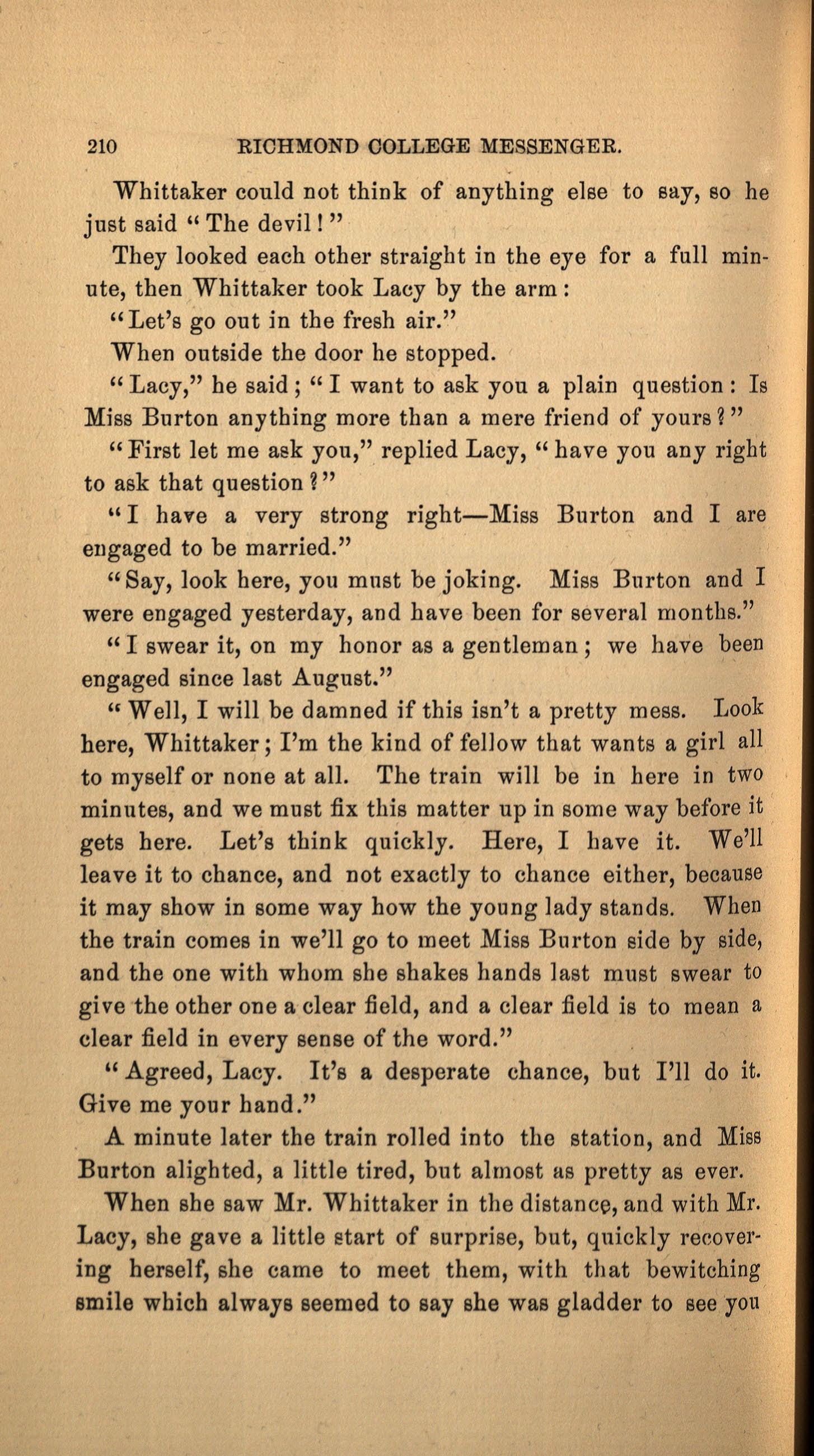
RICHMOND COLLEGE MESSENGER.
Whittaker could not think of anything else to say, so he just said "The devil!"
They looked each other straight in the eye for a full minute, then Whittaker took Lacy by the arm:
"Let's go out fo the fresh air."
When outside the door he stopped.
"Lacy," he said; "I want to ask you a plain question: Is Miss Burton anything more than a mere friend of yours?"
"First let me ask you," . replied Lacy, "have you any right to ask that question i"
"I have a very strong right-Miss Burton and I are engaged to be married."
"Say, look here, you must be joking. Miss Burton and I were engaged yesterday, and have been for several months."
"I swear it, on my honor as a gentleman; we have been engaged since last August."
"Well, I will be damned if this isn't a pretty mess. Look here, Whittaker; I'm the kind of fellow that wants a girl all to myself or none at all. The train will be in here in two minutes, and we must :fix this matter up in some way before it gets here. Let's think quickly. Here, I have it. We'll leave it to chance, and not exactly to chance either, because it may show in some way how the young lady stands. When the train comes in we'll go to meet Miss Burton side by side, and the one with whom she shakes hands last must swear to give the other one a clear field, and a clear field is to mean a clear field in every sense of the word."
"Agreed, Lacy. It's a desperate chance, but I'll do it. Give me your hand."
A minute later the train rolled into the station, and Miss Burton alighted, a little tired, but almost as pretty as ever.
When she saw Mr. Whittaker in the distance, and with Mr. Lacy, she gave a little start of surprise, but, quickly recovering herself, she came to meet them, with that bewitching smile which always seemed to say she was gladder to see you
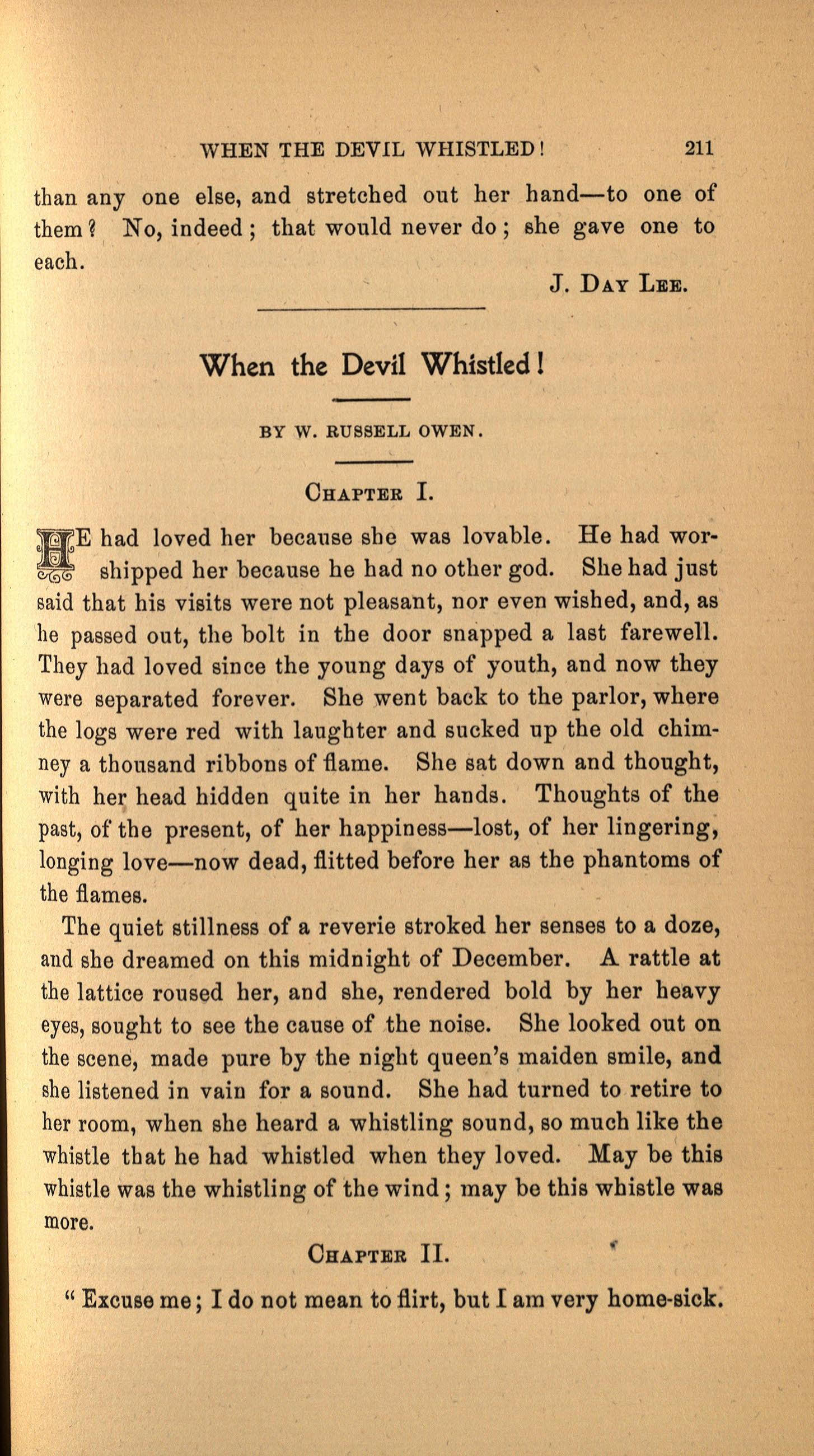
WHEN THE DEVIL WHISTLED! 211 than any one else, and stretched out her hand-to one of them? No, indeed; that would never do; she gave one to each.
J. DAY LEE.
BY W. RUSSELL OWEN.
CHAPTER I.
E had loved her because she was lovable. He bad wor9 shipped her because he had no other god. She had just said that his visits were not pleasant, nor even wished, and, as he passed out, the bolt in the door snapped a last farewell. They had loved since the young days of youth, and now they were separated forever. She went back to the parlor, where the logs were red with laughter and sucked up the old chimney a thousand ribbons of flame. She sat down and thought, with her head hidden quite in her hands. Thoughts of the past, of the present, of her happiness-lost, of her lingering, longing love-now dead, flitted before her as the phantoms of the flames.
The quiet stillness of a reverie stroked her senses to a doze, and she dreamed on this midnight of December. A rattle at the l attice roused her, and she, rendered bold by her heavy eyes, sought to see the cause of the noise. She looked out on the scene, made pure by the night queen's maiden smile, and she listened in vain for a sound. She had turned to retire to her room, when she heard a whistling sound, so much like the whistle that he had whistled when they loved. May be this whistle was the whistling of the wind; may be this whistle was more .
CHAPTER II.
" Excuse me; I do not mean to flirt, but I am very home-sick.
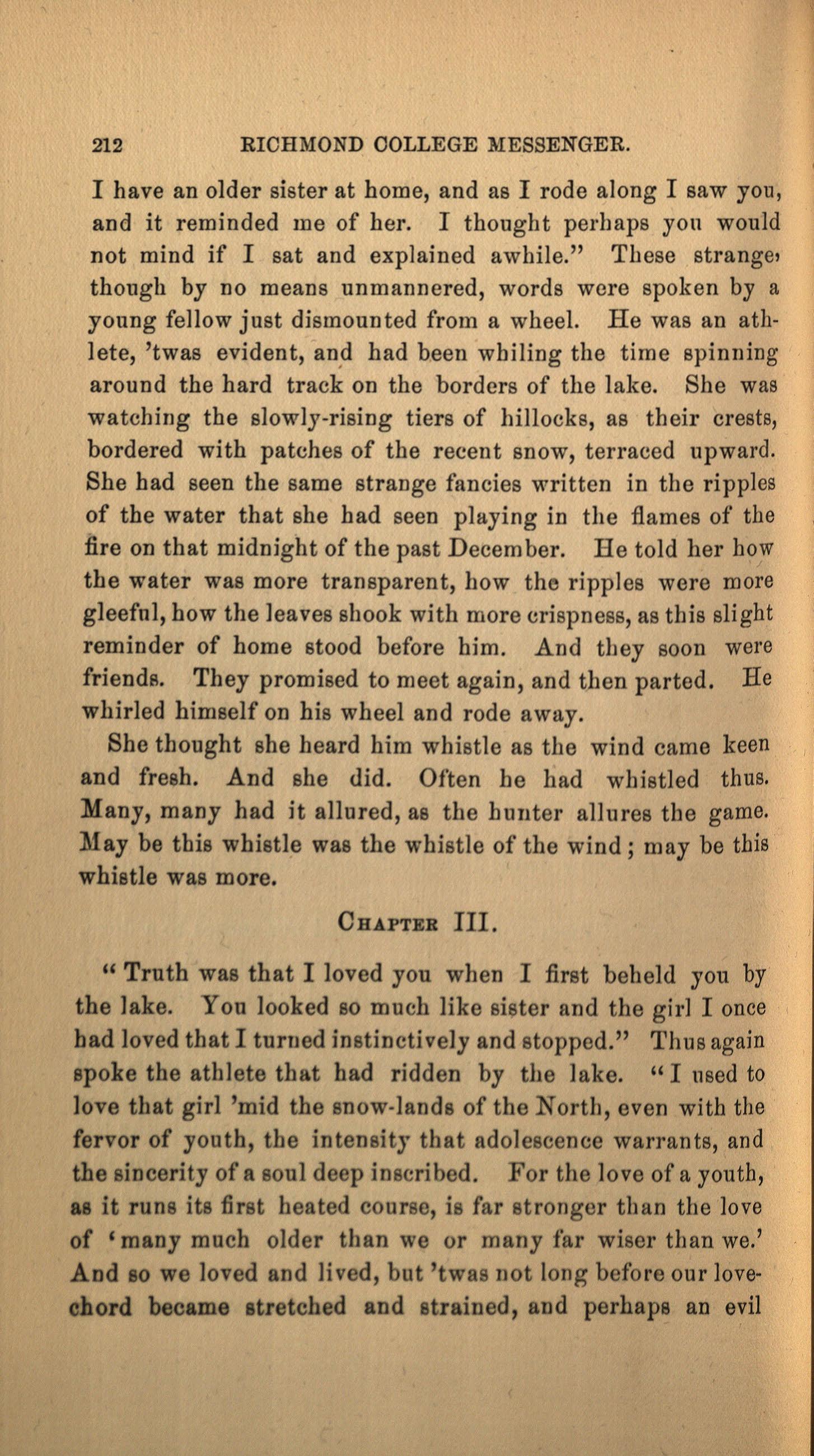
212 RICHMOND COLLEGE MESSENGER.
I have an older sister at home, and as I rode along I saw you, and it reminded me of her. I thought perhaps yon would not mind if I sat and explained awhile." These strange, though by no means unmannered, words were spoken by a young fellow just dismounted from a wheel. He was an athlete, 'twas evident, an d had been whiling the time spinning around the hard track on the borders of the lake. She was watching the slowly-rising tiers of hillocks, as their crests, bordered with patches of the recent snow, terraced upward. She had seen the same strange fancies written in the ripples of the water that she had seen playing in the flames of the fire on that midnight of the past December. He told her bow the water was more transparent, how the ripples were more gleeful, how the ]eaves shook with more crispness, as this slight reminder of home stood before him. And they soon were friends. They promised to meet again, and then parted. He whirled himself on his wheel and rode away. She thought she heard him whistle as the wind came keen and fresh. And she <lid. Often be had whistled thus. Many, many had it allured, as the bunter allures the game. May be this whistle was the whistle of the wind; may be this whistle was more.
"Truth was that I loved you when I :first beheld you by the Jake. You looked so much like sister and the girl I once had loved that I turned instinctively and stopped." Thus again spoke the athlete that had ridden by the lake. "I nsed to Jove that girl 'mid the snow-lands of the orth, even with the fervor of youth, the intensity that adolescence warrants, and the sincerity of a soul deep inscribed. For the love of a youth, as it runs its first heated course, is far stronger than the love of 'many much older than we or many far wiser than we.' And so we loved and Jived, but 'twas not long before our lovechord became stretched and strained, and perhaps an evil
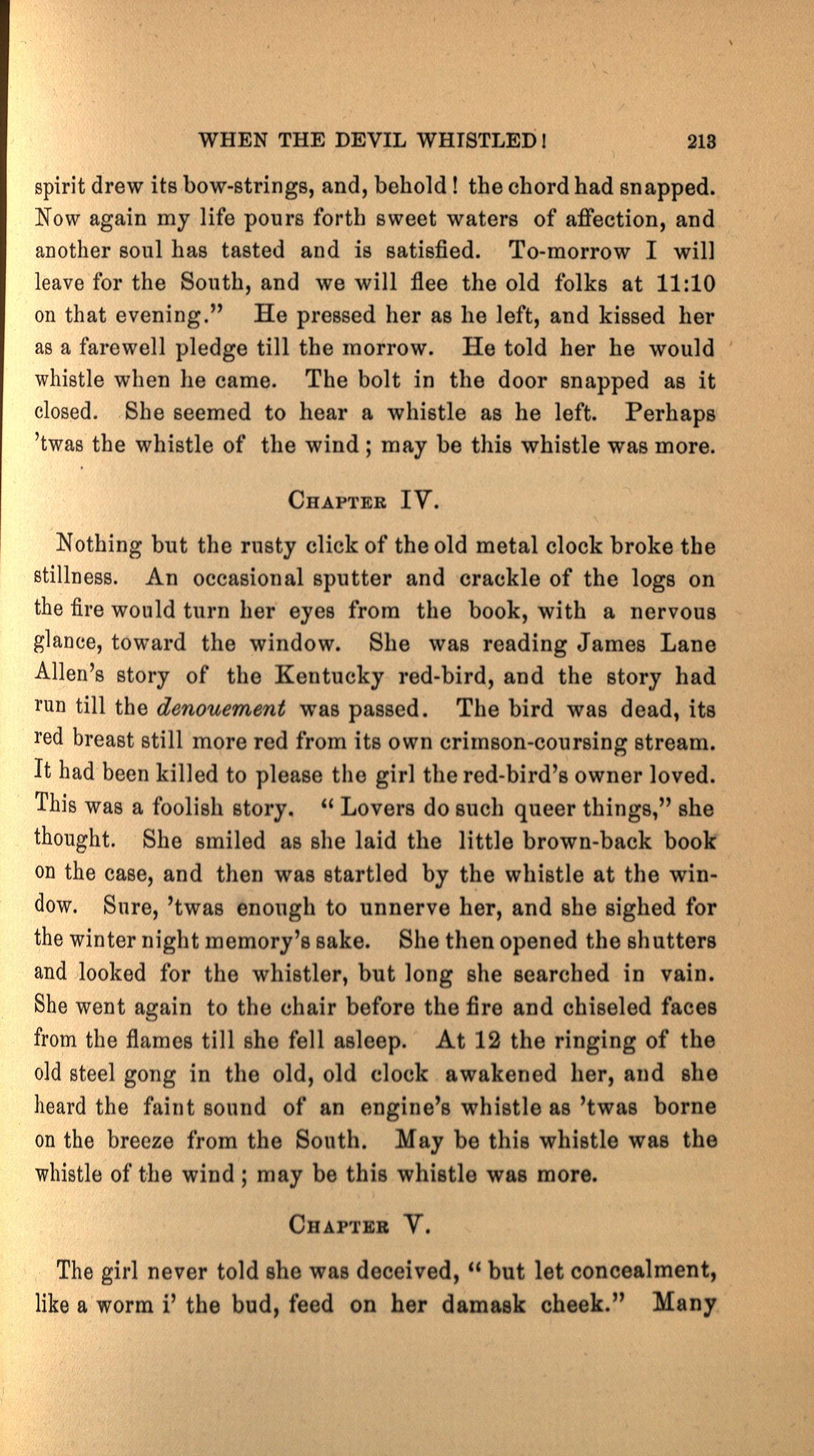
WHEN THE DEVIL WHISTLED l
218 spirit drew its bow-strings, and, behold I the chord had snapped. Now again my life pours forth sweet waters of affection, and another soul has tasted and is satisfied. To-morrow I wil1 leave for the South, and we will flee the old folks at 11:10 on that evening." He pressed her as he left, and kissed her as a farewell pledge till the morrow. He told her he would whistle when he came. The bolt in the door snapped as it closed. She seemed to hear a whistle as he left. Perhaps 'twas the whistle of the wind; may be this whistle was more.
CHAPTER IV.
Nothing but the rusty click of the old metal clock broke the stillness. An occasional sputter and crackle of the logs on the fire would turn her eyes from the book, with a nervous glance, toward the window. She was reading James Lane Allen's story of the Kentucky red-bird, and the story had run till the denouement was passed. The bird was dead, its red breast still more red from its own crimson-coursing stream. It had been killed to please the girl the red-bird's owner loved. This was a foolish story. "Lovers do such queer things," she thought. She smiled as she laid the little brown-back book on the case, and then was startled by the whistle at the window. Sure, 'twas enough to unnerve her, and she sighed for the winter night memory's sake. She then opened the shutters and looked for the whistler, but long she searched in vain. She went again to the chair before the fire and chiseled faces from the flames till she fell asleep. At 12 the ringing of the old steel gong in the old, old clock awakened her, and she heard the faint sound of an engine's whistle as 'twas borne on the breeze from the South. May be this whistle was the whistle of the wind; may be this whistle was more.
CHAPTER V.
The girl never told she was deceived, "but let concealment, like a worm i' the bud, feed on her damask cheek." Many
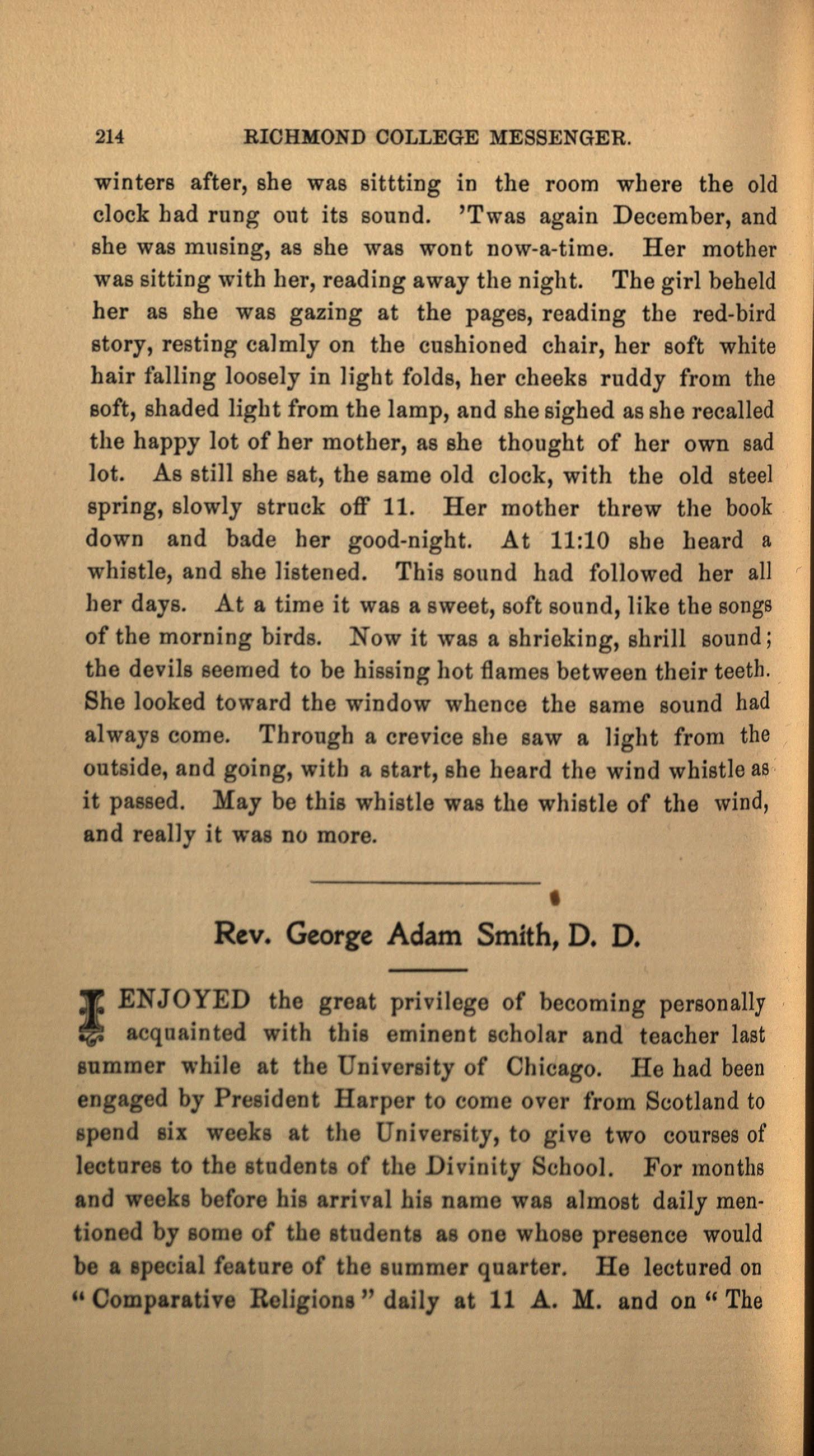
214 RICHMOND COLLEGE MESSENGER.
winters after, she was sittting in the room where the old clock had rung out its sound. 'Twas again December, and she was musing, as she was wont now-a-time. Her mother was sitting with her, reading away the night. The girl beheld her as she was gazing at the pages, reading the red-bird story, resting calmly on the cushioned chair, her soft white hair falling loosely in light folds, her cheeks ruddy from the soft, shaded light from the lamp, and she sighed as she recalled the happy lot of her mother, as she thought of her own sad lot. As still she sat, the same old clock, with the old steel spring, slowly struck off 11. Her mother threw the book down and bade her good-night. At 11:10 she beard a whistle, and she listened. This sound had followed her all " lier days. At a time it was a sweet, soft sound, like the songs of the morning birds. ow it was a shrieking, shrill sound; the devils seemed to be hissing hot flames between their teeth. She looked toward the window whence the same sound had always come. Through a crevice she saw a Hght from the outside, and going, with a start, she heard the wind whistle as • it passed. May be this whistle was the whistle of the wind, and realJy it was no more.
ENJOYED the great privilege of becoming personally acquainted with this eminent scholar and teacher last summer while at the University of Chicago. He had been engaged by President Harper to come over from Scotland to spend six weeks at the University, to give two courses of lectures to the students of the Divinity School. For months and weeks before his arrival his name was almost daily mentioned by some of the students as one whose presence would be a special feature of the summer quarter. He lectured on "Comparative Religions" daily at 11 A. M. and on "The
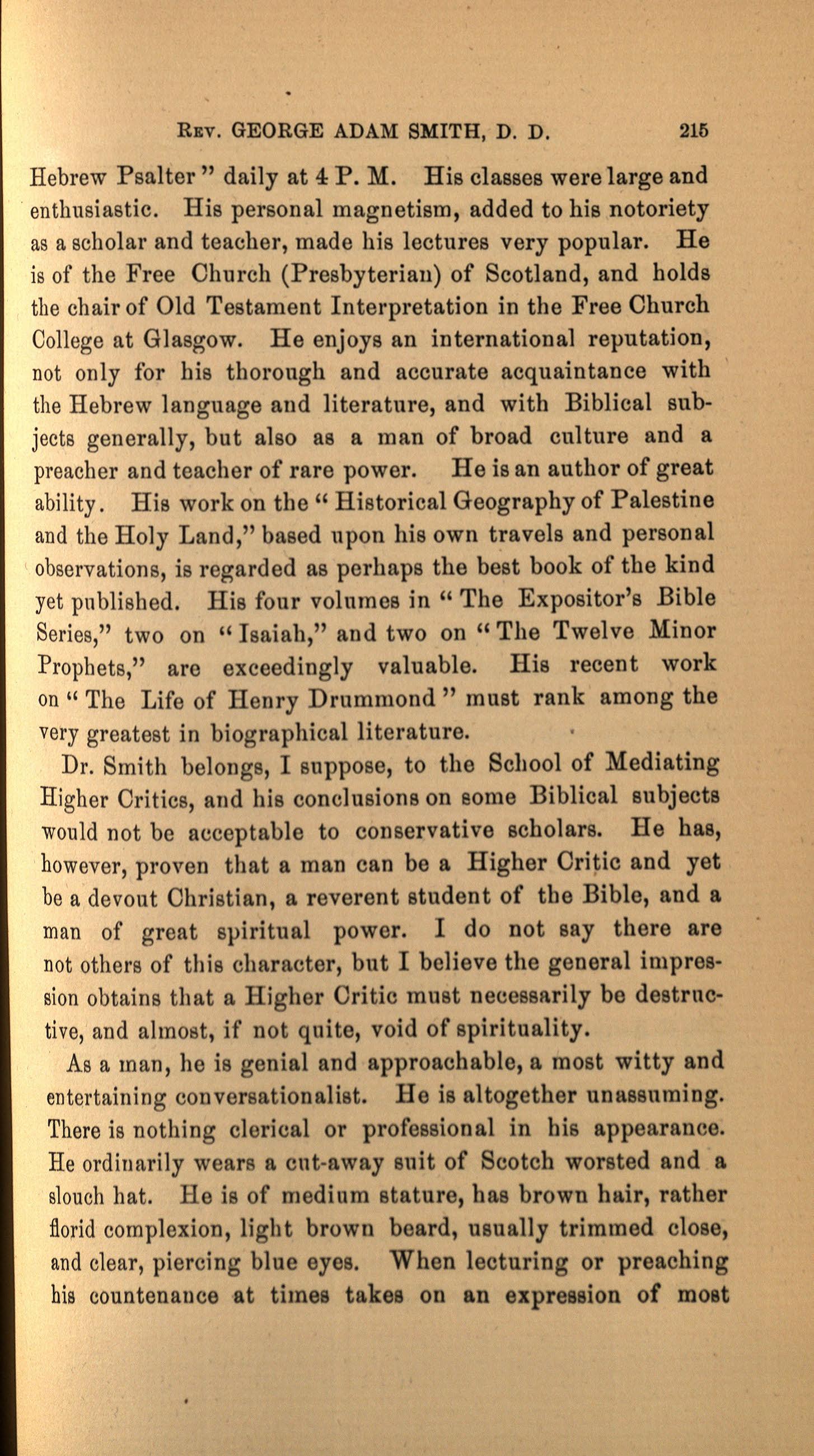
REv. GEORGE ADAM SMITH, D. D. 215
Hebrew Psalter" daily at 4 P. M. His classes were large and · enthusiastic. His personal magnetism, added to his notoriety as a scholar and teacher, made his lectures very popular. He is of the Free Church (Presbyterian) of Scotland, and holds the chair of Old Testament Interpretation in the Free Church College at Glasgow. He enjoys an international reputation, not only for his thorough and accurate acquaintance with the Hebrew language and literature, and with Biblical subjects generally, but also as a man of broad culture and a preacher and teacher of rare power. He is an author of great ability. His work on the "Historical Geography of Palestine and the Holy Land," based upon his own travels and personal ' observations, is regarded as perhaps the best book of the kind yet pnblished. His four volumes in "The Expositor's Bible Series," two on "Isaiah," and two on "The Twelve Minor Prophets," are exceedingly valuable. His recent work on "The Life of Ilenry Drnmmond" must rank among the very greatest in biographical literature.
Dr. Smith belongs, I suppose, to the School of Mediating Higher Critics, and his conclusions on some Biblical subjects would not be acceptable to conservative scholars. He has, however,proven that a man can be a Higher Critic and yet be a devout Christian, a reverent student of the Bible, and a man of great spiritual power. I do not say there are not others of this character, but I believe the general impressionobtains that a Higher Critic must necessuily be destructive, and almost, if not quite, void of spirituality.
As a man, he is genial and approachable, a most witty and entertaining conversationalist. Ile is altogether unassuming. Thereis nothing clerical or professional in bis appearance. He ordinarily wears a cnt-away suit of Scotch worsted and a slouchhat. He is of medium stature, has brown hair, rather floridcomplexion, light brown beard, usually trimmed close, and clear, piercing blue eyes. When lecturing or preaching his countenance at times takes on an expression of most
216 RICHMOND COLLEGE MESSENGER.
peculiar impressiveness-if I may so describe it, an expression of awe and wonder and delight combined, as though he had been the subject of some sublime revelation, or had been living in a region of heavenly associations. He sometimes speaks as one whose soul is thrilled by the new and precions things discovered by his powerful intellect in his patient and profound researches. He makes fev;r gestures and uses his manuscript freely. At times, however, he departs from his manuscript to relate some anecdote or reminiscence by way of illustration, or indulges in a flight of extempore eloquence. Occasionally in the course of his lectures he leans lazily over the desk or table, or even throws one leg across the corner of the table, and, thus half supporting himself, will read or talk in a free and easy way, but with such originality, eloquence, force, and charming style that his hearers feel tempted to say, "This is the most stimulating speaker I ever heard." I have myself seen his classes, at the close of his lecture, disperse without a word for some minutes; but at length, as they passed on out of the building, one or another would break the silence with something like "Well, he combin es scholarship and spiritual power in a way I never saw before."
E. v. BALDY.
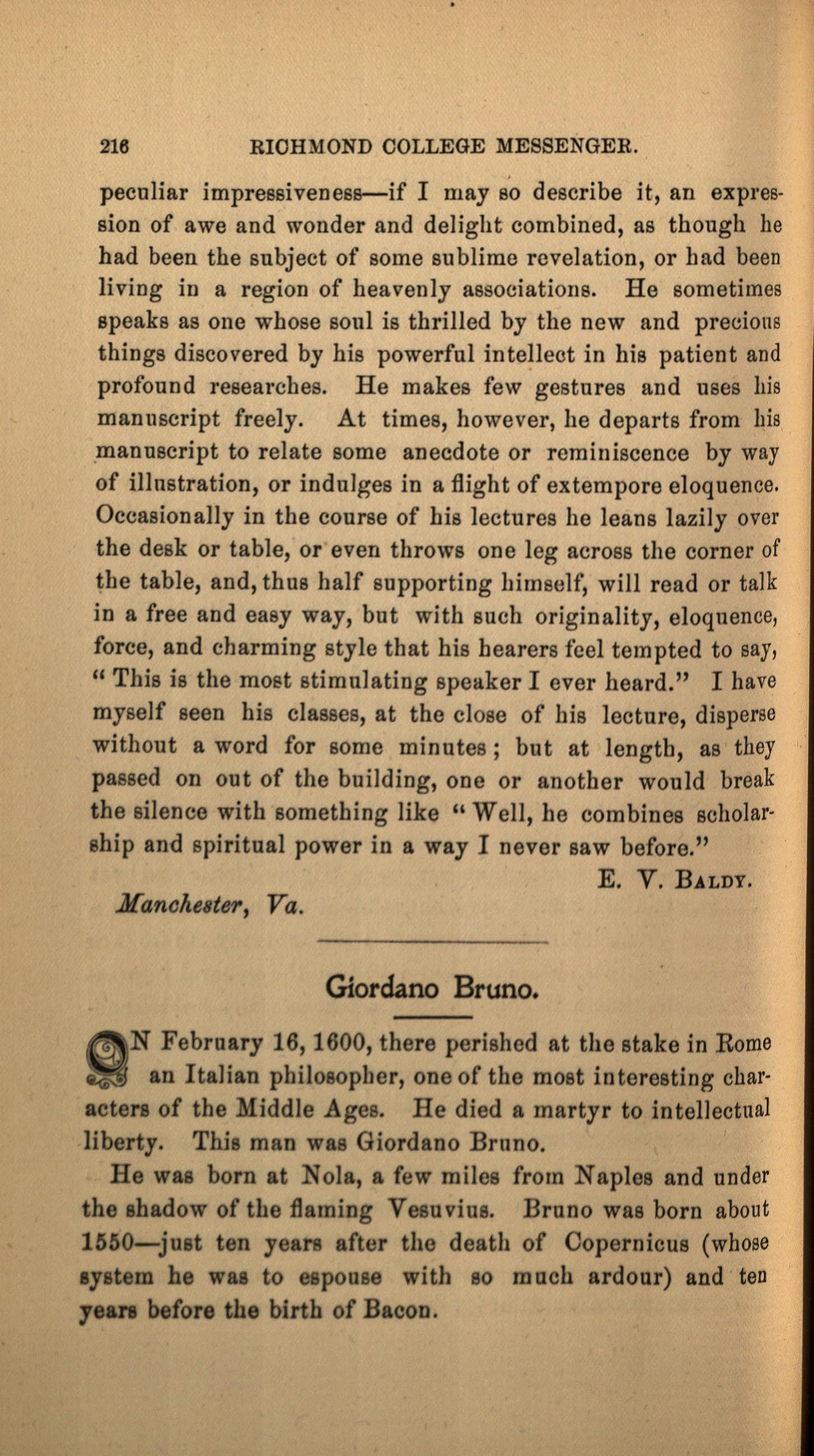
Xancheater, Va.
Giordano Bruno.
N February 16, 1600, there perished at the stake in Rome an Italian philosopher, one of the most interesting characters of the Middle .Agee. He died a martyr to intellectual liberty. Thie man was Giordano Brano. He was born at Nola, a few miles from Naples and under the shadow of the :flaming Vesuvius. Bruno was born about 1660-juet ten years after the death of Copernicus (whose ayetem he was to espouse with so much ardour) and ten yean before the birth of Bacon.
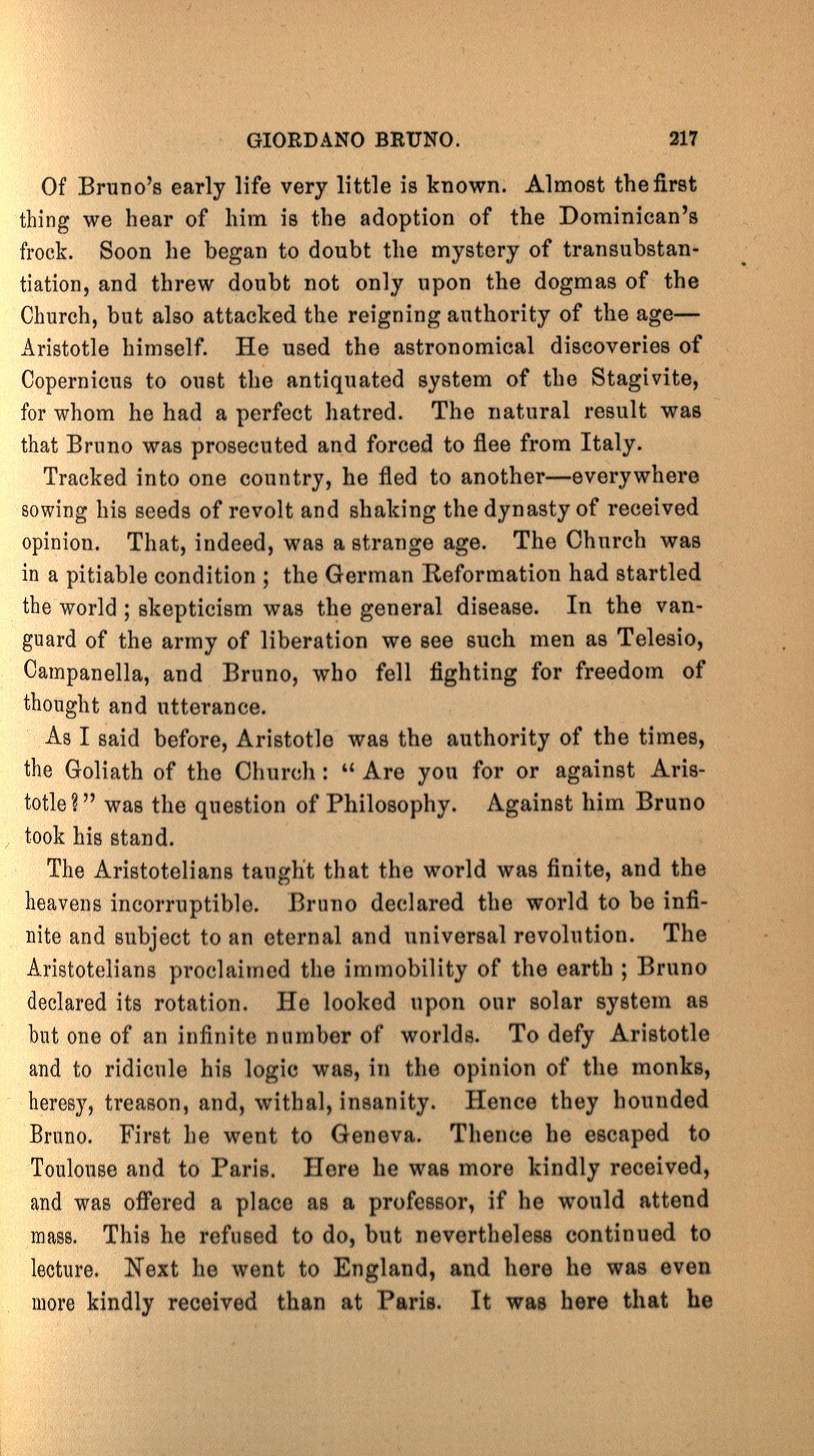
GIORDANO BRUNO. 217
Of Bruno's early life very little is known. Almost the :first thing we hear of him is the adoption of the Dominican's frock. Soon he began to doubt the mystery of transubstantiation, and threw doubt not only upon the dogmas of the Church, but also attacked the reigning a.nthority of the ageAristotle himself. He used the astronomical discoveries of Copernicus to oust the antiquated system of the Stagivite, for whom he had a perfect hatred. The natural result was that Bruno was prosecuted and forced to flee from Italy.
Tr acked into one country, he fled to another-everywhere sowing bi s seeds of revolt and shaking the dynasty of received opinion. That, indeed, was a strange age. The Church was in a pitiable condition ; the German Reformation had startled the world ; skepticism was the general disease. In the vanguard of the army of liberation we see such men as Telesio, Campanella, and Bruno, who fell fighting for freedom of thought and utterance.
As I said before, Aristotle was the authority of the times, the Goliath of the Ohurch: "Are you for or against Aristotle ¥" was the question of Philosophy. Against him Bruno 1 took his stand.
The Aristotelians taught that the world was finite, and the heavens incorruptible. Bruno declared the world to be infinite and subj ect to an eternal and universal revolution. The Aristotelians proclaimed the immobility of the earth ; Bruno declared its rotation. He looked upon our solar system as but one of an infinite number of worlds. To defy Aristotle and to ridicule his logic was, iu the opinion of the monks, heresy, trea son, and, withal, insanity. Hence they hounded Brnno. Fir st h e went to Geneva. Theuce he escaped to Toulouse and to Paris. Here he was more kindly received, and was offered a place as a professor, if he would attend mass. This he refused to do, but nevertheless continued to lecture. Next he went to England, and here he was even more kindly received than at Paris. It was here that be
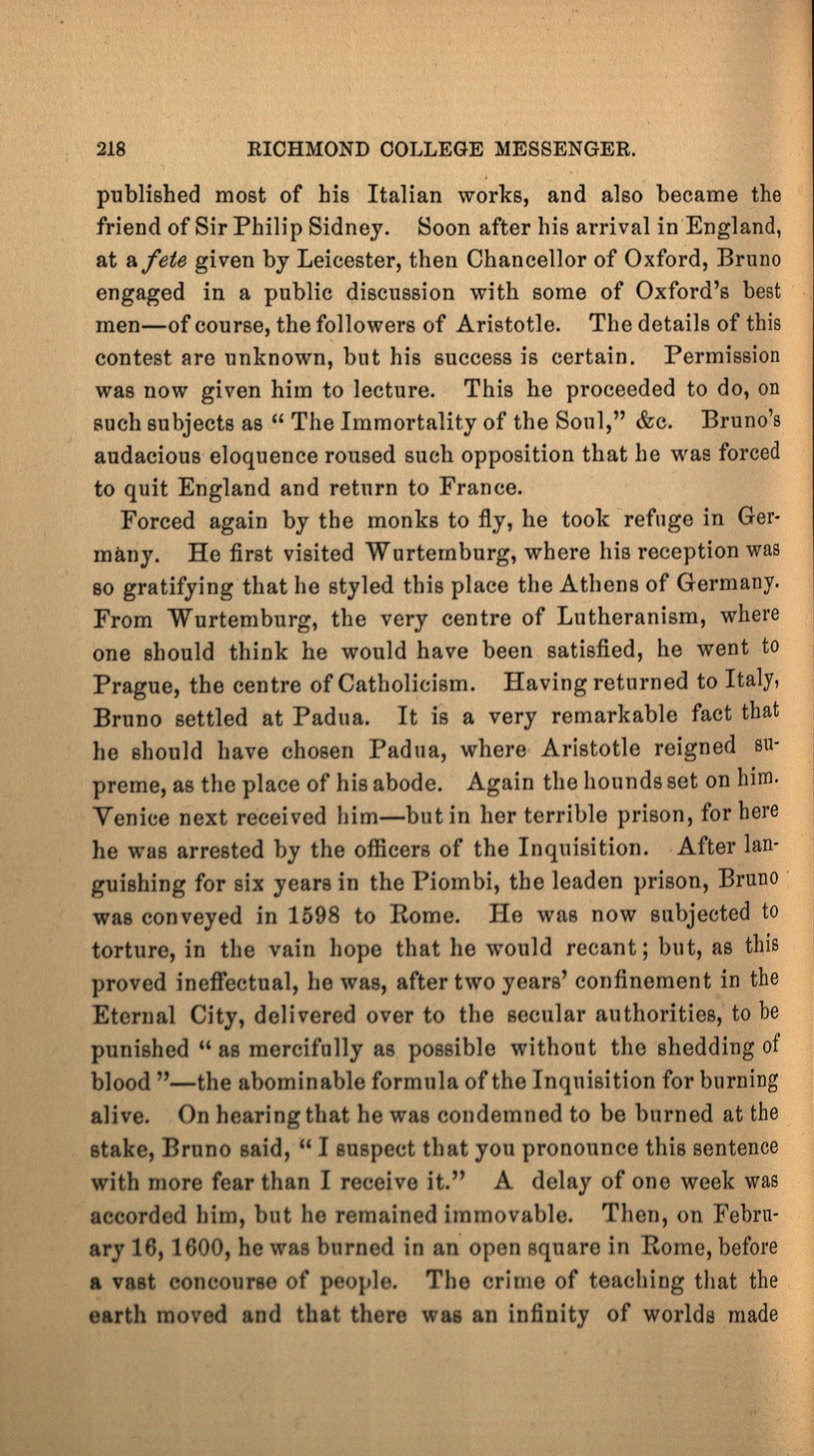
218 RICHMOND COLLEGE MESSENGER.
pu blisbed most of his Italian works, and also became the friend of Sir Philip Sidney. Soon after his arrival in England, at afete given by Leicester, then Chancellor of Oxford, Bruno engaged in a public discussion with some of Oxford's best men-of course, the followers of Aristotle. The details of this contest are unknown, but his success is certain. Permission was now given him to lecture. This he proceeded to do, on 1:mchsubjects as" The Immortality of the Sonl," &c. Bruno's audacious eloquence roused such opposition that he was forced to quit England and return to France.
Forced again by the monks to fly, he took refuge in Germany. He first visited Wurtemburg, where his reception was so gratifying that he styled this place the Athens of Germany. From Wurtemburg, the very centre of Lutheranism, where one should think he would have been satisfied, he went to Prague, the centre of Catholicism. Having returned to Italy, Bruno settled at Padua. It is a very remarkable fact that he should have chosen Padua, where Aristotle reigned sn· preme, as the place of his abode. Again the hounds set on him. Venice next received him-but in her terrible prison, for here he was arrested by the officers of the Inquisition. After Ian· guishing for six years in the Piombi, the leaden prison, Bruno · was conveyed in 1598 to Rome. Ile was now subjected to torture, in the vain hope that he would recant; but, as this proved ineffectual, he was, after two years' confinement in the Eternal City, delivered over to tho secular authorities, to be punished "as mercifally as possible without tho shedding of blood "-the abominable formula of the Inquisition for burning alive. On hearing that he was condemned to be burned at the stake, Bruno said, "I suspect that you pronounce this sentence with more fear than I receive it." A delay of one week was accorded him, but ho remained immovable. Then, on Febrn· ary 16, 1600, he was burned in an open square in Rome, before a vast concourse of p opl . The crime of teaching that the earth mo\·ed and that there was an infinity of worlds made
GIORDANO BRUNO.
219 him, in the eyes of the priests, a scoundrel, a villain, a heretic, a blasphemer. But he died in the martyr spirit, self-sustained and silent, welcoming death as the appointed passage to a higher life .
Most well-read men remember his name as that of one who, whatever his errors might have been, perished a victim of intolerance. Bruno em braced the Copernican theory and combated the general physics of his day. His creed was Pantheism. He held that the infinite soul of God did not merely inhabit the universe, but that the universe was simply a manifestation of Him, and therefore itself divine. God is, in the most physical and literal sense, all in all, the Cause of Causes, the Principle of all life and mind.
To preach this doctrine Bruno became a homeless wanderer and a martyr to the cause of free thought. To-day the traveler in Rome sees, standing on the spot where Bruno perished, a noble monument, erected to the memory of this truth-seeker. What was a ground of death to that intolerant age is a ground of glory to this time of intellectual freedom. Verily, as Bulwer says, there is a 1·od for the back of every fool who would be wiser than his generation. But the stars in their coursesfight for progress. "As men die, so they walk among posterity." Bruno will be remembered better for his death than for anything he did while alive. The flames which consumedhis body have illuminated his Dl\me.
GEORGE COOPER, JR.
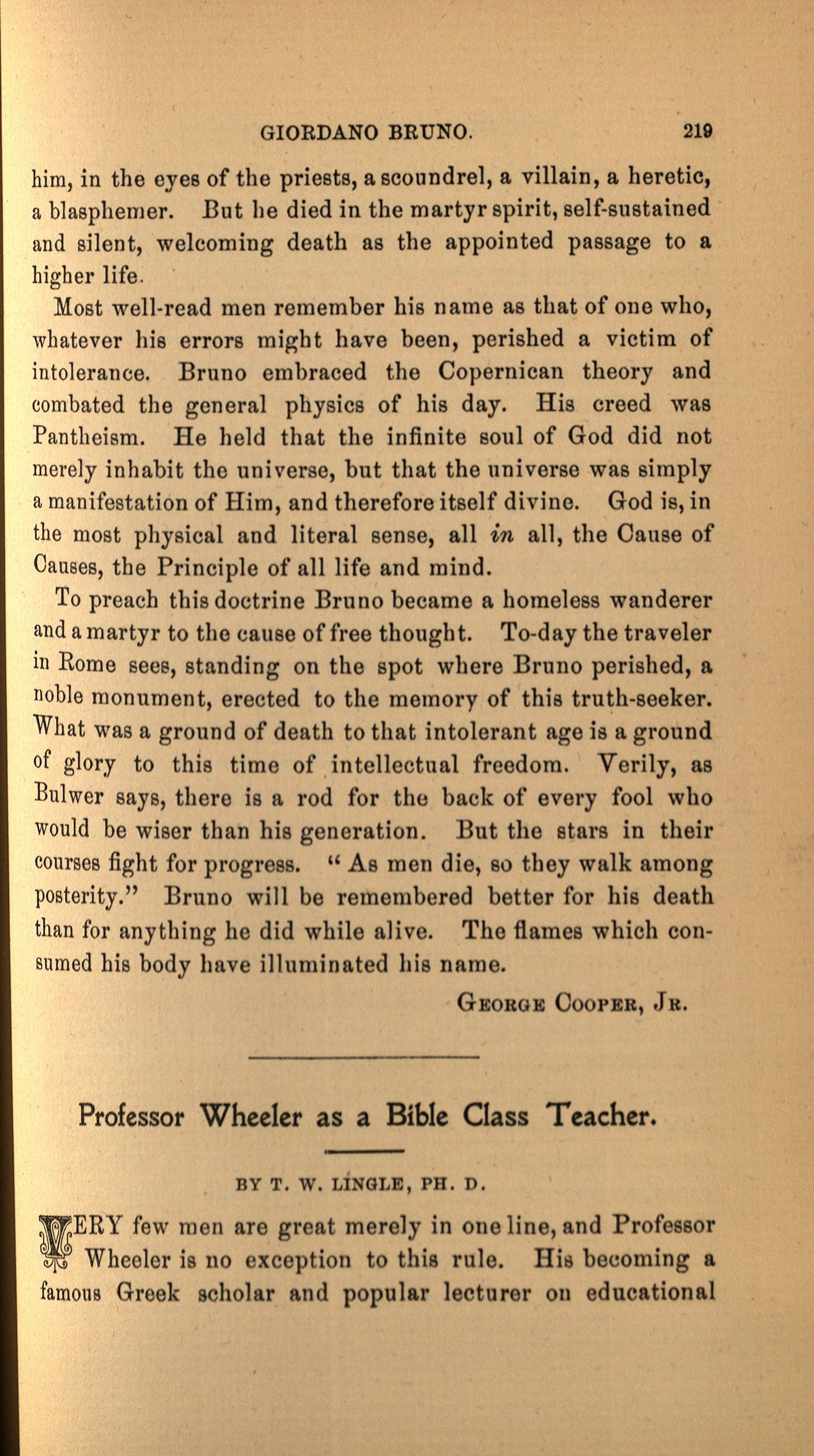
Professor Wheeler as a Bible Class Teach er.
BY T. W. LINGLE, PH. D.
lfrERY few men are great merely in one line, and Professor Wheeler is no exception to this rule. Hii; becoming a famous Greek scholar and popular lecturer on educational
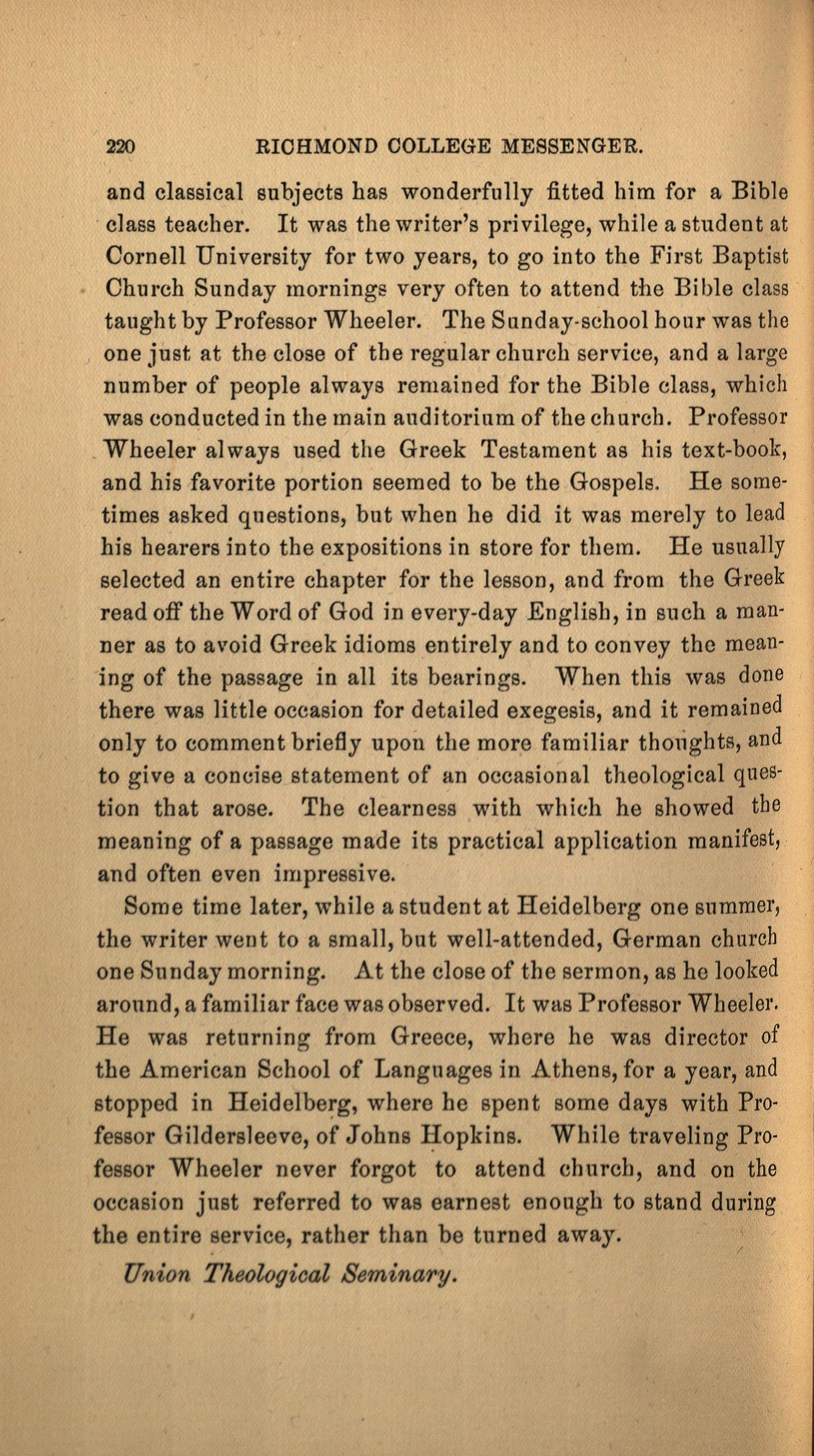
220 RICHMOND COLLEGE MESSENGER.
and classical subjects has wonderfully fitted him for a Bible class teacher. It was the writer's privilege, while a student at Cornell University for two years, to go into the First Baptist Church Sunday mornings very often to attend the Bible class taught by Professor Wheeler. The Sunday -school hour was the one just at the close of the regular church service, and a large number of people always remained for the Bible class, which was conducted in the main auditorium of the church. Professor Wheeler always used the Greek Testament as his text-book, and his favorite portion seemed to be the Gospels . He some· times asked questions, but when he did it was merely to lead his hearers into the expositions in store for them. He usually selected an entire chapter for the lesson, and from the Greek read off the Word of God in every -day English, in such a man· ner as to avoid Greek idioms entirely and to convey the mean· ing of the pas sage in all its bearings. When this was done there was little occasion for detailed exegesis, and it remained only to comment briefly upon the more familiar thotights, and to give a concise statement of an occasional theological question that arose. The clearne ss with which he showed the meaning of a passage made its practical application manifest, and often even impressive.
Some time later, while a student at Heidelberg one summer, the writer went to a small, but well-attended, German church one Sunday morning. At the close of the sermon, as he looked around, a familiar face wa s observed. It was Professor Wheeler. He was returnin g from Greece, where he was director of the American School of Language s in Athens, for a year, and stopped in Heidelbe~g, where he spent some days with Professor Gildersleeve, of Johns J::(opkins. While traveling Professor Wheeler never forgot to attend church, and on the occasion just referred to was earne s t enough to stand during the entire s ervice, rather than be turned away.
Union Theological Seminary.
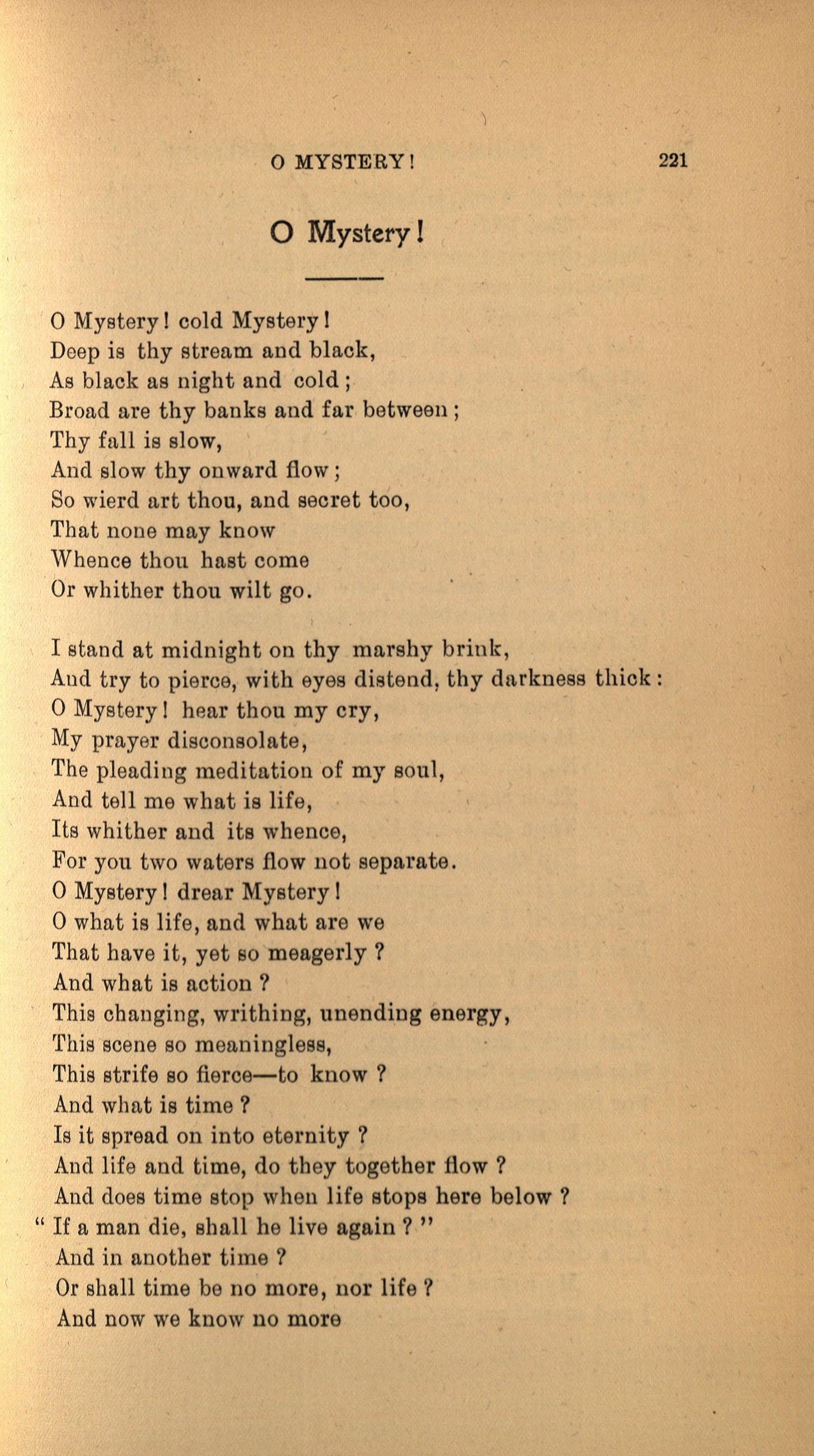
0 Mystery I cold Mystery I
Deep is thy stream and black, As black as night and cold ; Broad are thy banks and for between ; Thy foll is slow, And slow thy on ward flow ; So wierd art thou, and secret too, That none may know Whence thou hast come Or whither thou wilt go.
I stand at midnight on thy marshy brink,
221 Aud try to pierce, with eyes distend, thy dn.rkness thick:
0 Mystery I hear thou my cry, My pray er disconsolate, The pleading meditation of my soul,
And tell me what is life, Its whither and its whence, For you two waters flow not separate.
0 Mystery I drear Mystery I 0 what is life, and what are we
That have it, yet so meagerly?
And what is action ?
This changing, writhing, unending energy, 'fhis scene so meaningless, This strife so fierce-to know ?
And what is time ?
Is it spread on into eternity ?
Aud li fe and time, do they together flow ?
And does time stop when life stops here below ? " If a man die, shall he live again ? "
And in another time ?
Or shall time be no more, nor life?
And now we know no more
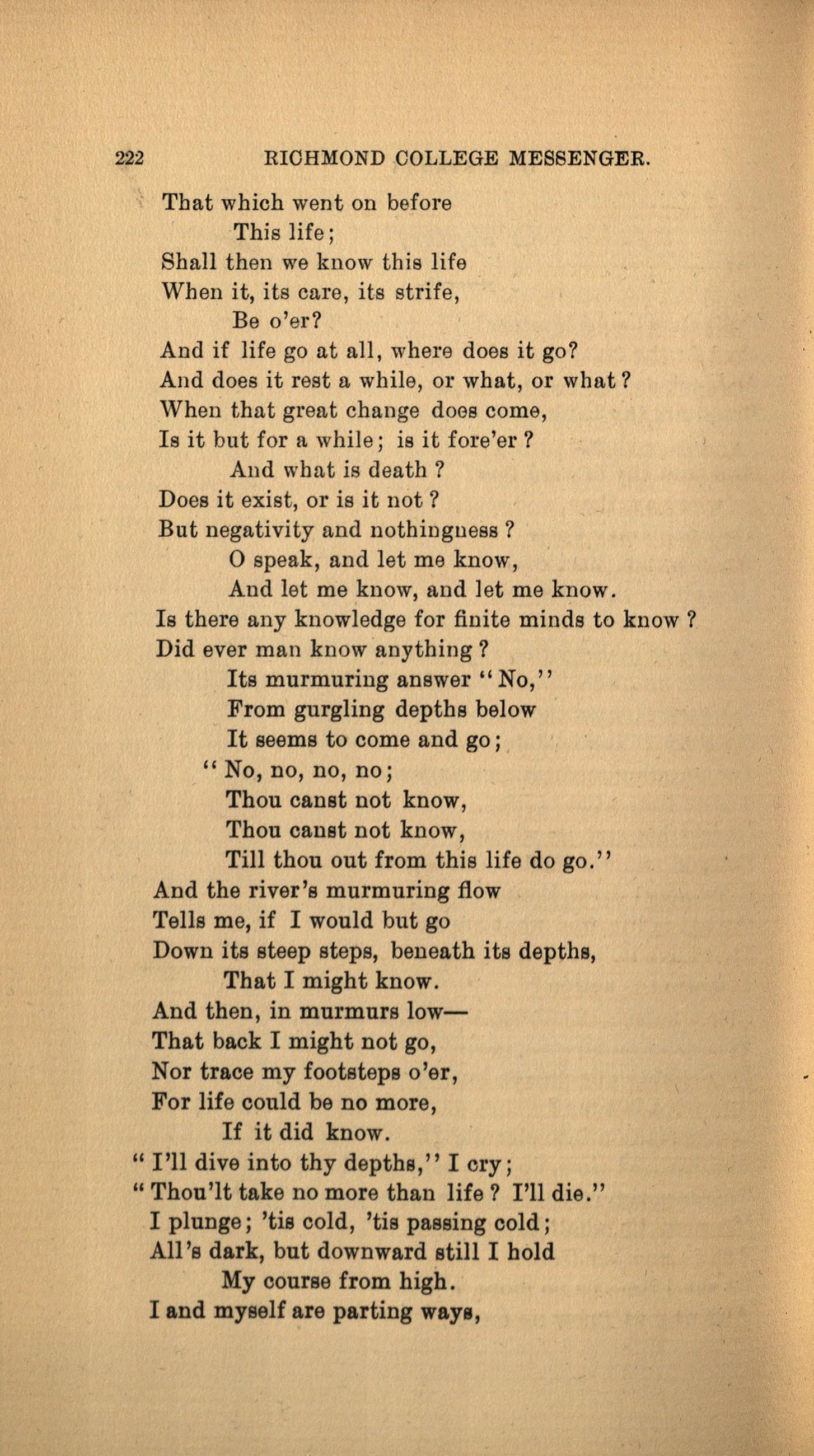
That which went on before This life; Shall then we know this life
When it, its care, its strife, Be o'er?
And if life go at all, where does it go?
And does it rest a while, or what, or what? When that great change does come, Is it but for a while; is it fore'er?
And what is death ? Does it exist, or is it not?
But negativity and nothingness? 0 speak, and let me know, And let me know, and let me know. Is there any knowledge for finite minds to know ? Did ever man know anything? Its murmuring answer "No," From gurgling depths below It seems to come and go ; " No, no, no, no;
Thou canst not know, Thou canst not know, Till thou out from this life do go."
And the river's murmuring flow Tells me, if I would but go Down its steep steps, beneath its depths, That I might know.
And then, in murmurs lowThat back I might not go, Nor trace my footsteps o'er, For life could be no more, If it did know.
" I'll dive into thy depths," I cry; "Thou'lt take no more than life? I'll die."
I plunge; 'tis cold, 'tis passing cold; All's dark, but downward still I hold My course from high.
I and myself are parting ways,

For light I see which quick doth daze
My spirit eye, My mind's perception part. And yet I do not know, But its increasing glow Doth light me as I go Deep down thy depths below, 0 Mystery!
And though I yet can't know Its increase, ever slow, Grows bright for me. My soul's dark ignorance Soon changed with its sharp glance, Now soon will see. Now something whispers low, And seems to speak or show What I did ask. And do I dream or hear?
'Tis faint, and never clear: Life is changeAll change is lifeAll action's change. Matter itself, it cannot change nor changed be- • All things we feel and see do change, Hence all things live.
If they live not themselves, their parts do live, For they do change. They move-there I there is life. The log decaying on the ground doth live; For, dying and decaying so, Its living molecules do show, In changes which they undergo, The life atomic of its composition. The~e's but one elemental life; Thei-eis but one life's element. The many elements we know Are but the many changes in The life of this prime element-
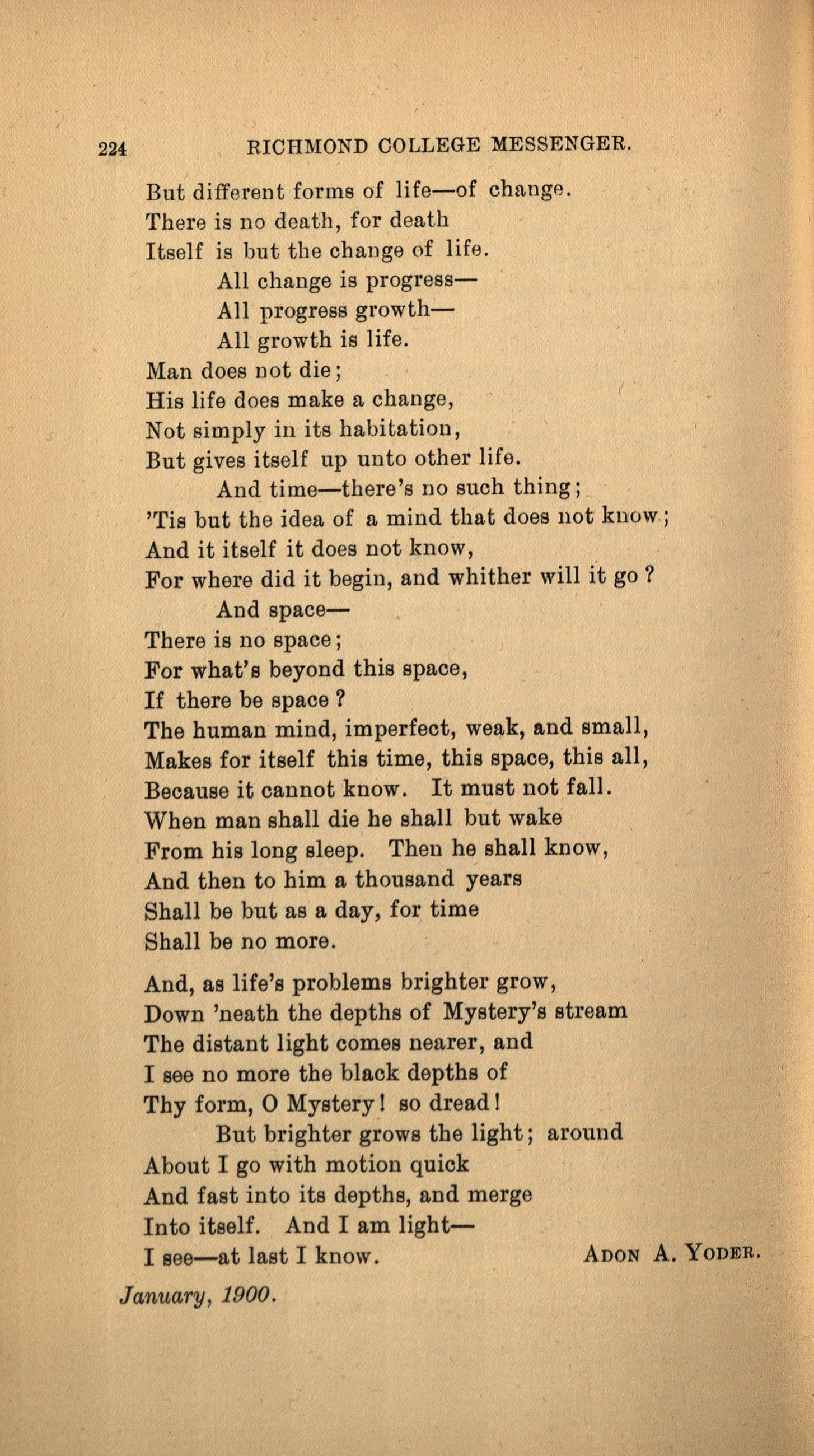
RICHMOND COLLEGE MESSENGER.
But diff er ent forms of life-of chang e Th er e is n o d eath, for d eath It self is but th e chang e of life.
All change is progressAll progress growthAll growth is life. Man does not die; His life does make a change, Not simply in its habitation, But gives its elf up unto other life. And time-there' s no such thing; 'Tis but th e id ea of a mind that does not know; And it itself it do es not know, For where did it begin, and whither will i't go?
And space-
There is no space; For what's beyond this space, If there be space ?
The human mind, imperfect, weak, and small, Makes for itself this time, this space, this all, Because it cannot know. It must not fall. When man shall die be shall but wake From bis long sleep. Then he shall know, And then to him a thousand years Shall be but as a day, for time Shall be no more.
And, as life's problems brighter grow, Down 'neath the depths of Mystery's stream The distant light comes nearer, and I see no more the black depths of Thy form, 0 Mystery I so dread I But brighter grows the light; around About I go with motion quick And fast into its depths, and merg e Into itself. And I am lightI see-at last I know.
ADONA. YoDER. January , 1900.
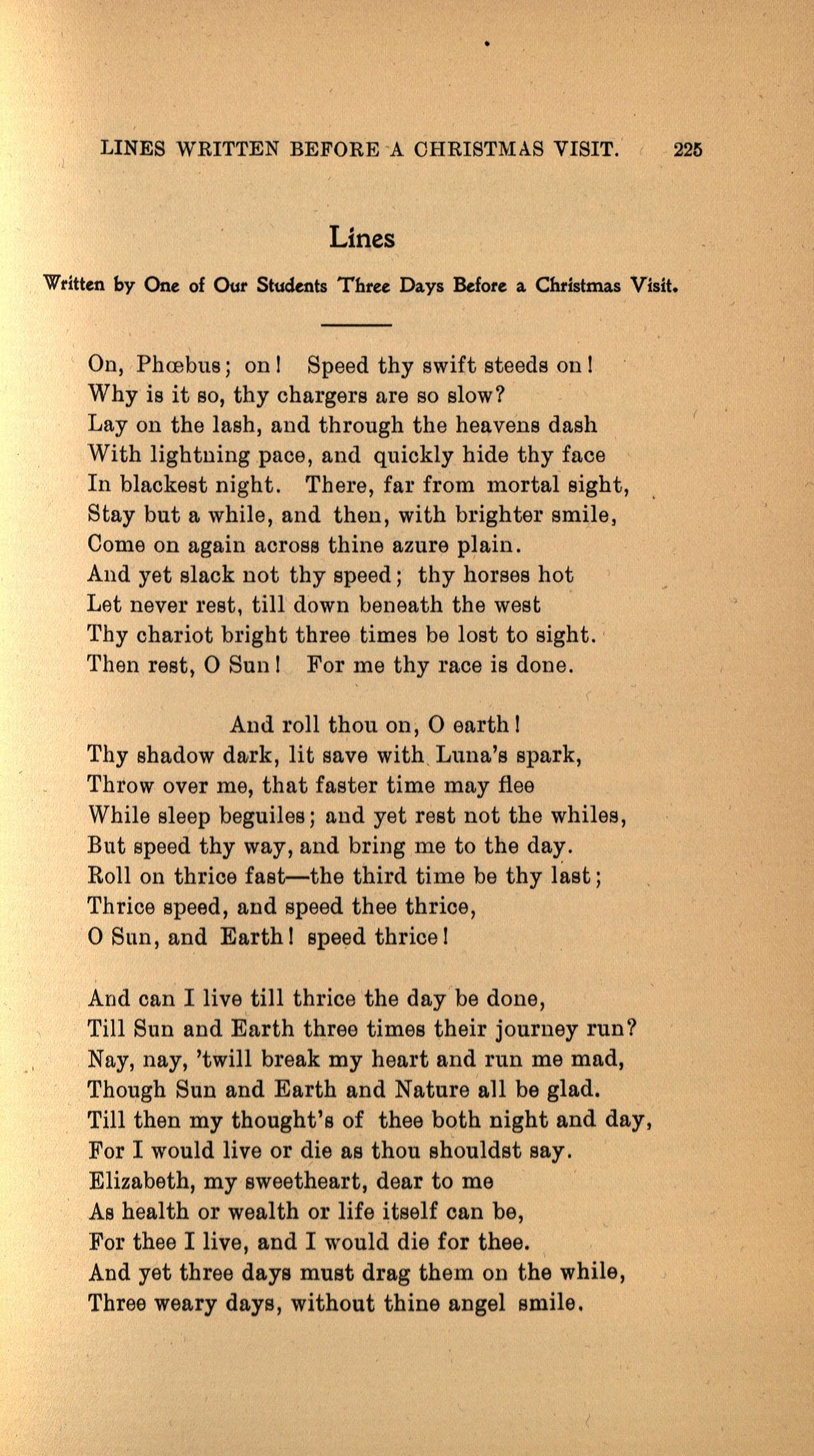
Written by One of Our Students Three
On, Ph rebus; on I Speed thy swift steeds on I
Why is it so, thy chargers are so slow?
Lay on the lash, and through the heavens dash With lightning pace, and quickly hide thy face
In blackest night. There, far from mortal sight, Stay but a while, and then, with brighter smile, Come on again across thine azure plain. And yet slack not thy speed; thy horses hot Let never rest, till down beneath the west
Thy chariot bright three times be lost to sight. · Then rest, 0 Sun I For me thy race is done.
Aud roll thou on, 0 earth I
Thy shadow da,rk, lit save with . Luna's spark, Throw over me, that faster time may flee While sleep beguiles; and yet rest not the whiles, But speed thy way, and bring me to the day. Roll on thrice fast-the third time be thy last; Thrice speed, and speed thee thrice, 0 Sun, and Earth I speed thrice I
And can I live till thrice the day be done, Till Sun and Earth three times their journey run?
Nay, nay, 'twill break my heart and run me mad, Though Sun and Earth and Nature all be glad. Till then my thought's of thee both night and day, For I would live or die as thou shouldst say. Elizabeth, my sweetheart, dear to me
As health or wealth or life ~tself can be, For thee I live, and I would die for thee. And yet three days must drag them on the while, Three weary days, without thine angel smile.
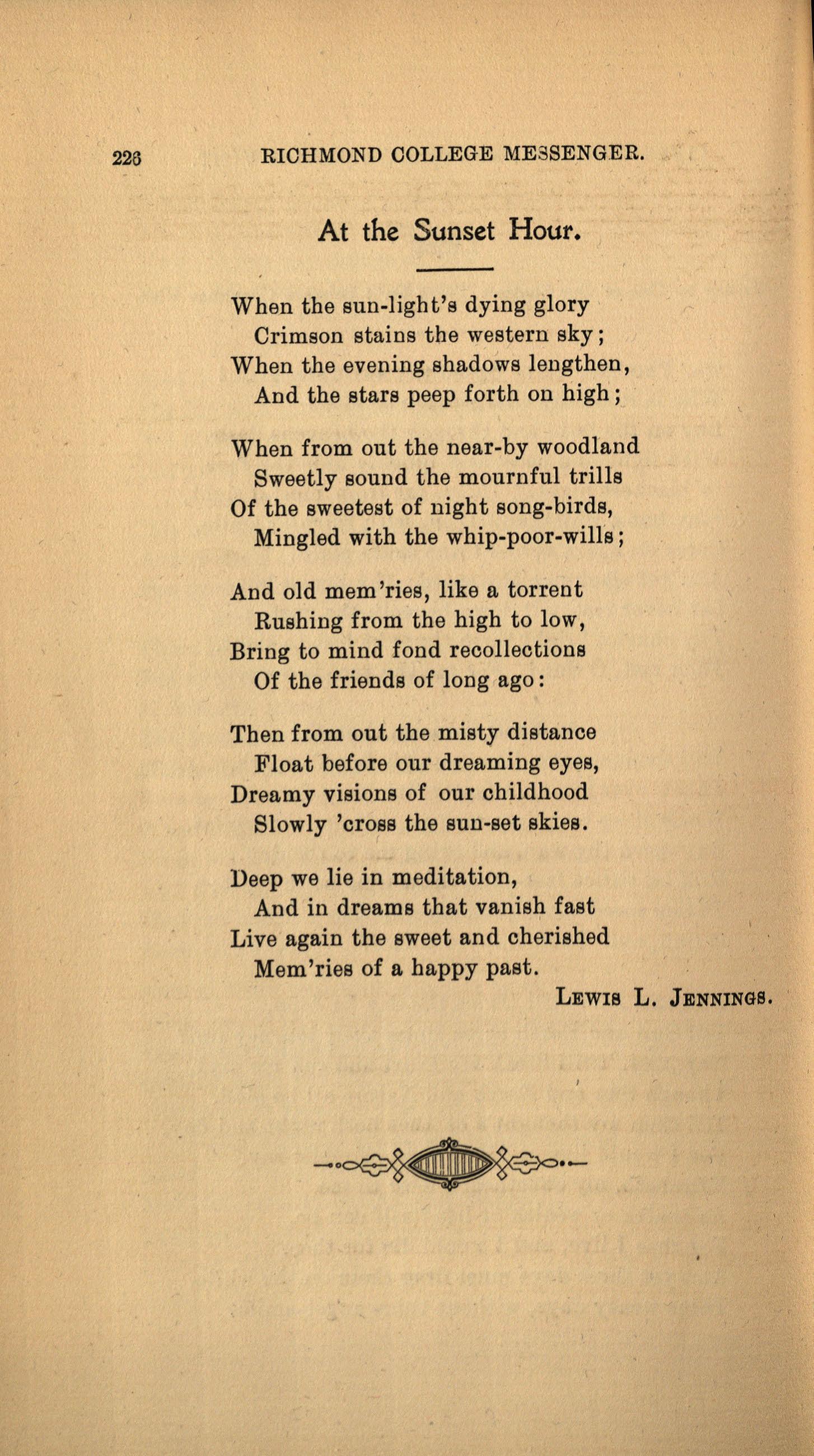
RICHMOND COLLEGE ME SSENGER.
At the Sunset Hour.
When the sun-light's dying glory Crimson stains the western sky; When the evening shadows lengthen, And the stars peep forth on high ;
When from out the near-by woodland Sweetly sound the mournful trills Of the sweetest of night song-birds, Mingled with the whip-poor-wilfs;
And old mem 'ries, like a torrent Rushing from the high to low, Bring to mind fond recollections Of the friends of long ago: Then from out the misty distance Float before our dreaming eyes, Dreamy visions of our childhood Slowly 'cross the sun-set skies.
Deep we lie in meditation, And in dreams that vanish fast Live again the sweet and cherished Mem'ries of a happy past.
LEWIS L. JENNINGS.
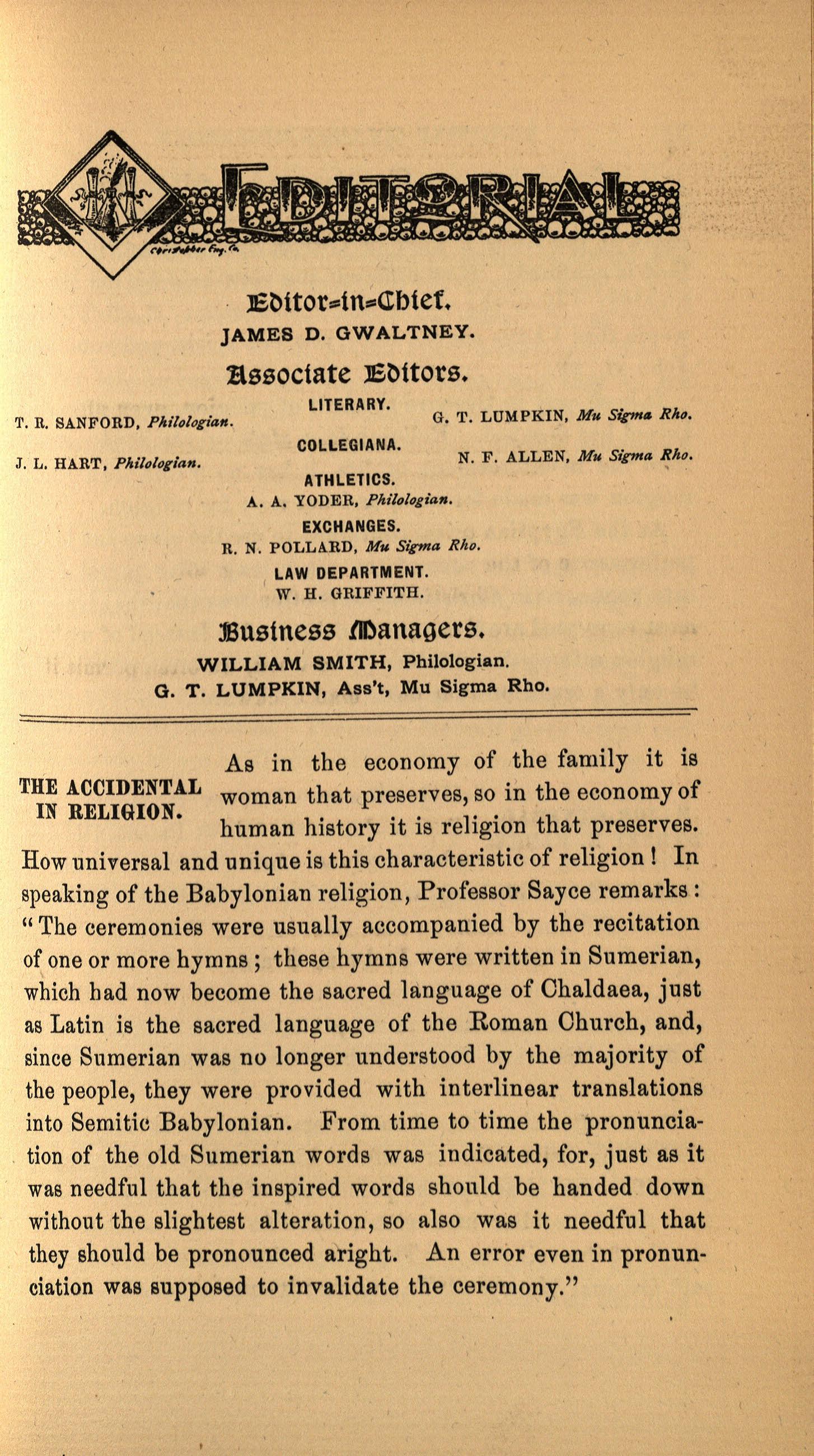
l6NtOt==in==<!bief.
JAMES D. GWALTNEY. associate l6Ntors.
T. R, SANF ORD, Plu'lolog-iat1
,T . L, HART, Plu'lolog-ian, LITERARY.
G, T. LUMPKIN, Mu Sip,,• Rlio. COLLEGIANA. N. F. ALLEN, Mu Sigma lfho. ATHLETICS.
A. A. YODER, Plu'lologian. EXCHANGES.
R. N. POLLARD, Mu Sigma Rl ,o, LAWDEPARTMENT. W. H. GRIFFITH.
managers. WILLIAM SMITH, Philologian.
G. T. LUMPKIN, Ass't, Mu Sigma Rho,
As in the economy of the family it is THEACCIDENTALwoman that preserves, so in the economy of IN RELIGION. . . }' . h human history 1t 1s re 1g1on t at preserves. How universal and unique is this characteristic of religion I In speaking of the Babylonian religion, Professor Sayce remarks: "The ceremonies were usually accompanied by the recitation of one or more hymns; these hymns were written in Sumerian, which had now become the sacred language of Chaldaea, just as Latin is the sacred language of the Roman Church, and, since Sumerian was no longer understood by the majority of the people, they were provided with interlinear translations into Semitic Babylonian. From time to time the pronuncia. tion of the old Sumerian words was indicated, for, just as it was needful that the inspired words should be handed down without the slightest alteration, so also was it needful that they should be pronounced aright. An error even in pronunciation was supposed to invalidate the ceremony."
It is feared that some Christians to-day fall into the same superstitious reverence for the letter of Scripture-indeed, make of the Bible a kind of antiquarian museum, in which God is confined. How different the view held by the Master himself: '' It is the spirit that quickeneth; * * * the words that I have spoken unto you are spirit, and are life." John vi., 63.
It is so easy to treasure the hull of religion, even after the kernel has decayed. Religion is a state of the soitl. Aside from the re-enforcement of life, it has no value. In short, religion was made for man, and not man for religion.
As the Egyptian priest continued to use the stone axe in the performance of the rites of the altar long after metal came into vogue, so in Christianity it is often true that the elements most venerated are those most antiquated. Instead of making religion a force that lifts man God-ward, we often permit it to be only a tradition that pulls man backward.

Major-General Dabney H. Maury, who MAJOR-GENERAL died on January 11th, at Peoria, Ill., and DABNEY H. MAURY. whose body was brought to Richmond en route to Fredericksburg, was a veteran of both the Mexican and Civil Wars. Among his class-mates at West Point were McClellan, "Stonewall" Jackson, Grant, A. P. Hill, Hancock, &c. General Maury, at the time of his death the oldest Confederate officer in Virginia, was the founder of the Southern Historical Society, whose headquarters are in this city.
It was after the war, when General Maury was very poor, that the Louisiana Lottery offer~d him a salary of $25,000 a year if he would accept the presidency of the company. See how the old soldier met with admirable moral courage this attack of the evil one. " The temptation was a terrible one," said General Maury. "To say that it was otherwise would
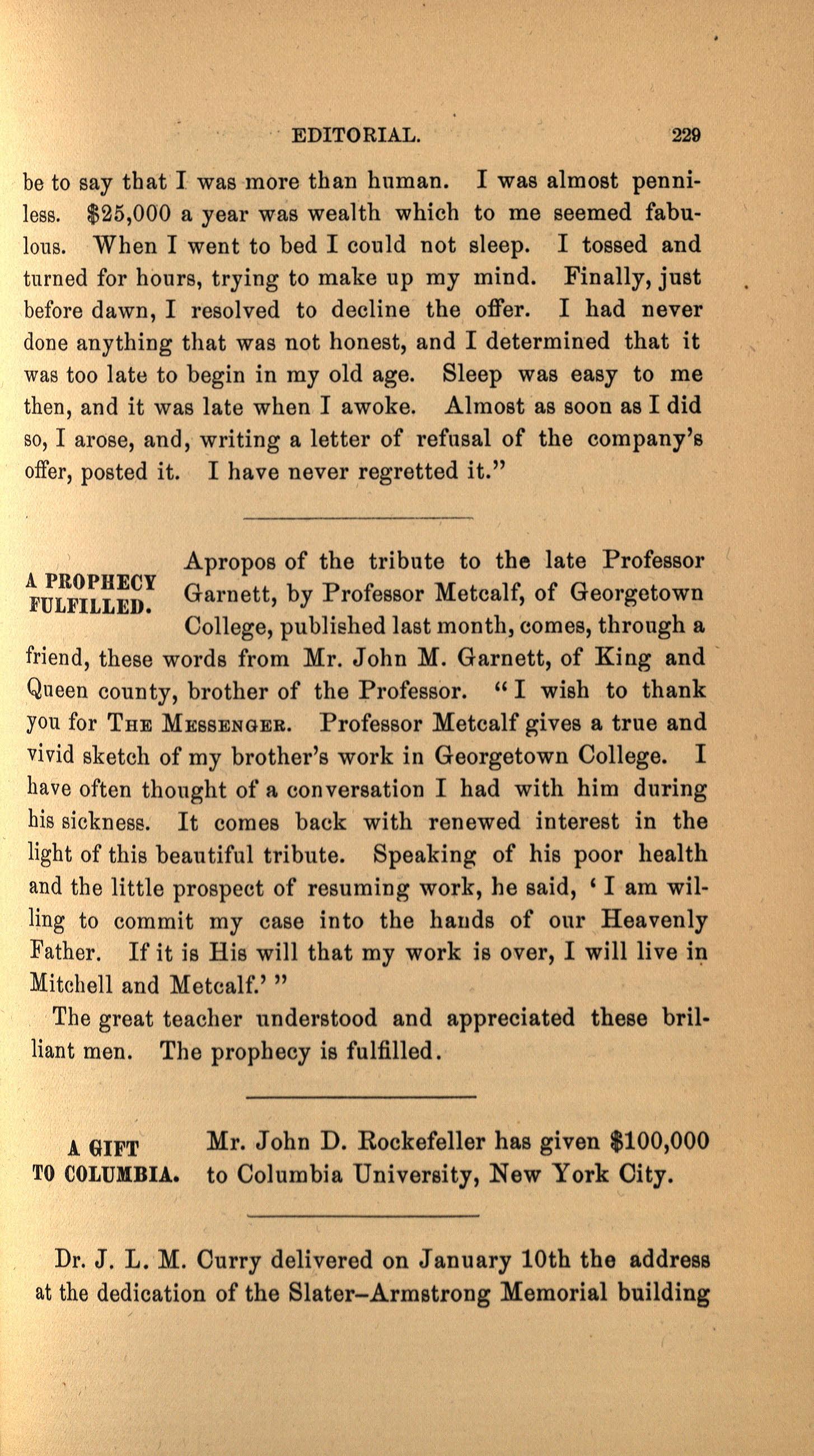
be to say that I was more than human. I was almost penniless. $25,000 a year was wealth which to me seemed fabulous. When I went to bed I could not sleep. I tossed and turned for hours, trying to make up my mind. Finally, just before dawn, I resolved to decline the offer. I had never done anything that was not honest, and I determined that it was too late to begin in my old age. Sleep was easy to me then, and it was late when I awoke. Almost as soon as I did so, I arose, and, writing a letter of refusal of the company's offer,posted it. I have never regretted it."
Apropos of the tribute to the late Professor A.PROPHECY FULFILLED , Garnett, by Professor Metcalf, of Georgetown College, publiehed last month, comes, through a friend, these words from Mr. John M. Garnett, of King and Queen county, brother of the Professor. "I wish to thank you for THE MESSENGER.Professor Metcalf gives a true and vivid sketch of my brother's work in Georgetown College. I have often thought of a conversation I had with him during his sicknese. It comes back with renewed interest in the light of this beautiful tribute. Speaking of his poor health and the little prospect of resuming work, he said, ' I am willing to commit my case into the hands of our Heavenly Father. If it is His will that my work is over, I will live i1_1 Mitchell and Metcalf.' "
The great teacher understood and appreciated these brilliant men. The prophecy is fulfilled.
A. GIFT Mr. John D. Rockefeller has given $100,000 TO COLUMBIA., to Columbia University, New York Oity.
Dr. J. L. M. Ourry delivered on January 10th the address at the dedication of the Slater-Armstrong Memorial building
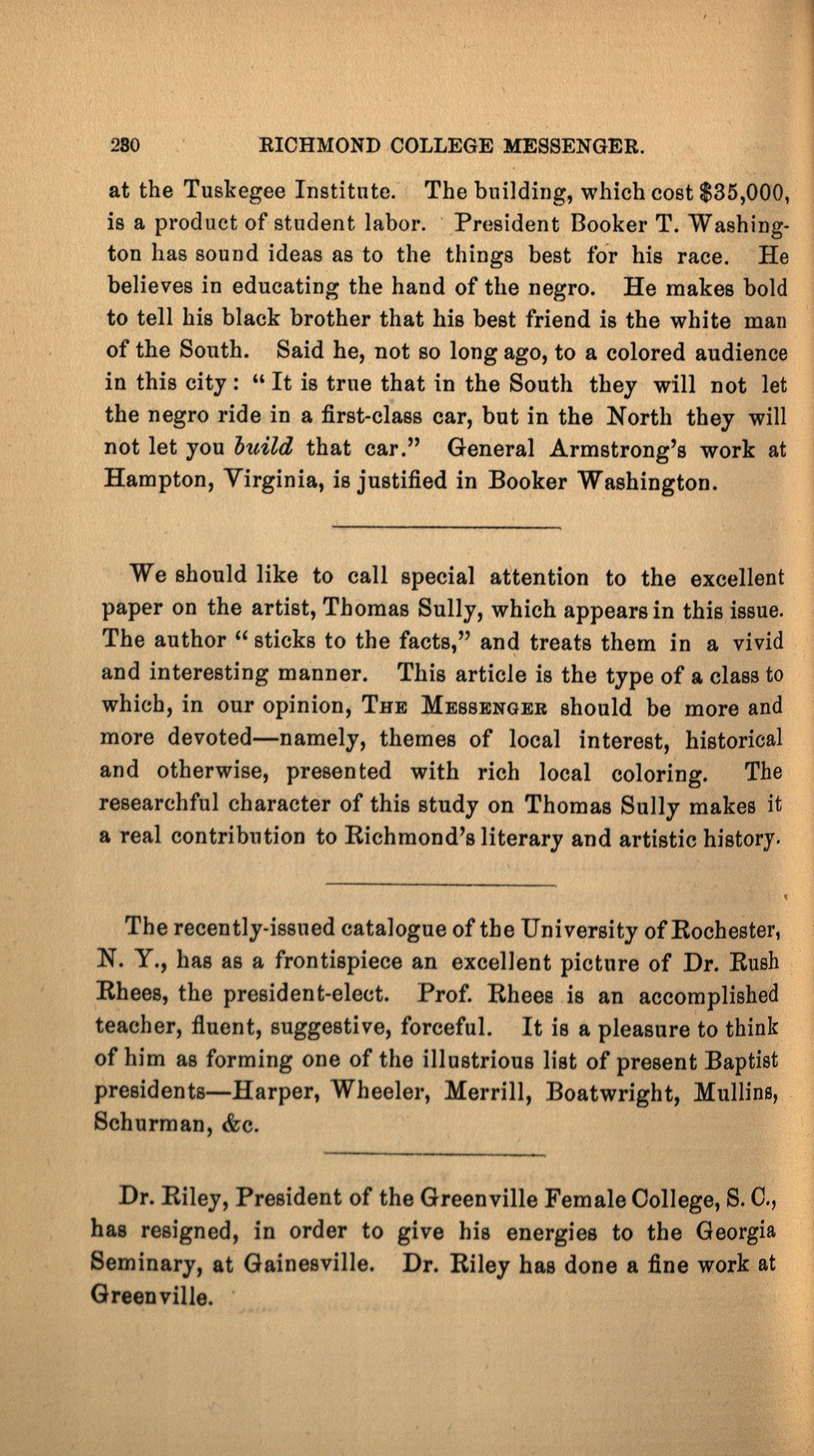
at the Tuskegee Institute. The building, which cost $35,000, is a product of student labor. President Booker T. Washington has sound ideas as to the things best for his race. He believes in educating the hand of the negro. He makes bold to tell his black brother that his best friend is the white man of the South. Said he, not so long ago, to a colored audience in this city: "It is true that in the South they will not let the negro ride in a first-class car, but in the North they will not let you build that car." General Armstrong's work at Hampton, Virginia, is justified in Booker Washington.
We should like to call special attention to the excellent paper on the artist, Thomas Sully, which appears in this issue. The author "sticks to the facts," and treats them in a vivid and interesting manner. This article is the type of a class to which, in our opinion, THE MESSENGERshould be more and more devoted-namely, themes of local interest, historical and otherwise, presented with rich local coloring. The researchful character of this study on Thomas Sully makes it a real contribl1tion to Richmond's literary and artistic history.
The recently-issued catalogue of the University of Rochester, N. Y., has as a frontispiece an excellent picture of Dr. Rush Rhees, the president-elect. Prof. Rhees is an accomplished teacher, fluent, suggestive, forceful. It is a pleasure to think of him as forming one of the illustrious list of present Baptist presidents-Harper, Wheeler, Merrill, Boatwright, Mullins, Schurman, &c.
Dr. Riley, President of the Greenville Female Oollege, S. C., has resigned, in order to give his energies to the Georgia Seminary, at Gainesville. Dr. Riley has done a fine work at Greenville.

The Law Class are to be congratulated on their new quarters in the Science Hall.
If you wish the sympathy of the co-eds., just cut your finger and wrap it up with your handkerchief.
The most popular question around the College iust now is : How are you getting on with your examination~
We noticed with great pleasure, in a recent copy of the Religious Herald, that W. B. Doughtry has been ordained.
The Thomas Memorial Lectures will be delivered this session by President Wheeler, and will commence on February 13th.
One of our ministerial students has recently become so fond of singing that he sings one hymn in church while the rest of the congregation sing another.
We have often heard various names given for sweethearts, but never before the other day have we heard "My Gracious" used to designate them.
We have no foreigners in College this session, but we have two foreign names-Wun Lung (Durham) and Pharoah (King)-and, strange to say, they room together.
From the latest reports Professor Gaines seems to be leading everything at Harvard. To those of us who have had classesunder Professor Gaines this is no surprise.
Richmond College seems to be producing quite a number of poets,judging from the last issue of THE MESSENGER;and someof them have evidently been dealing with Oupid.
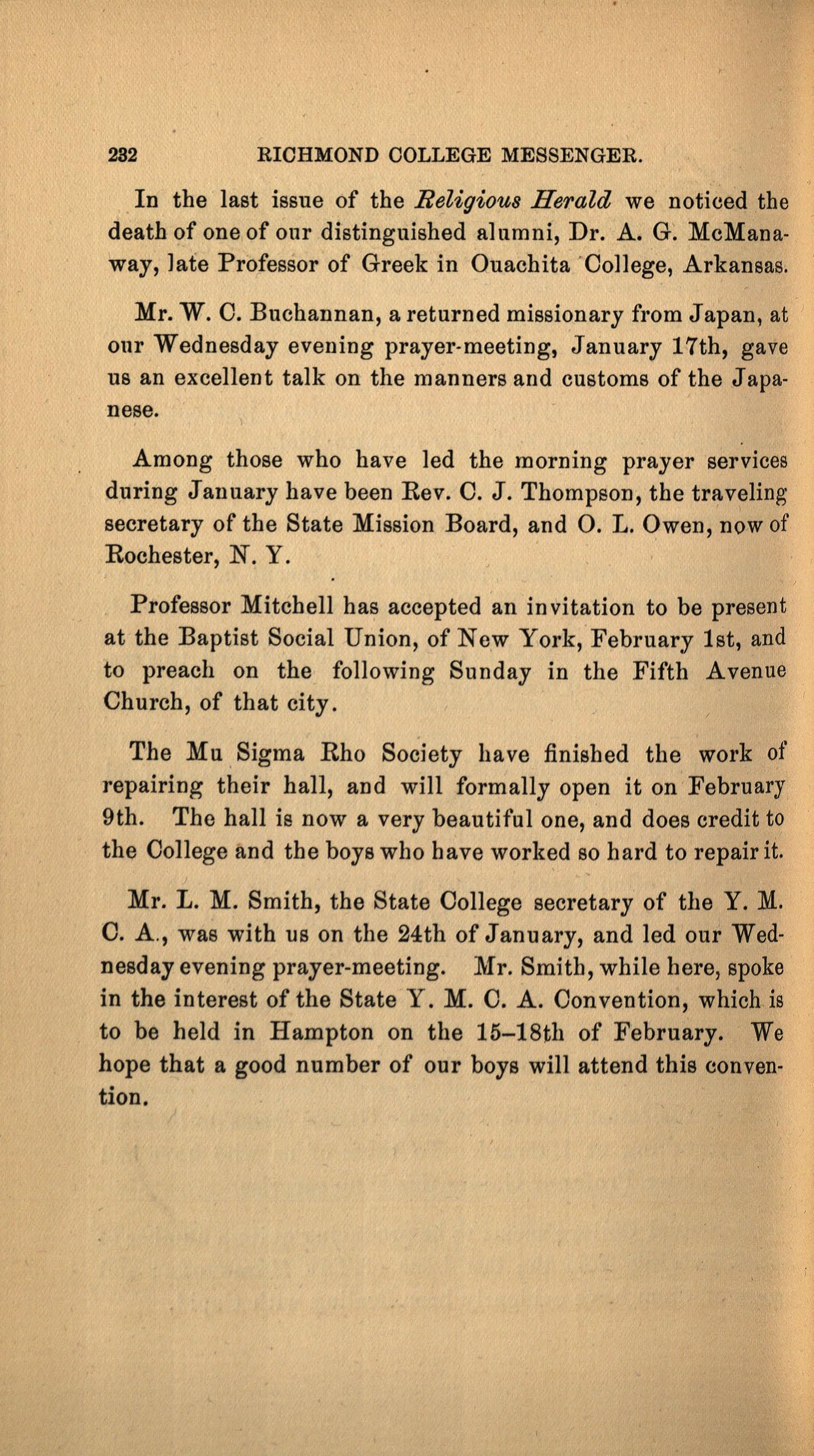
In the last issue of the Religious Herald we noticed the death of one of our distinguished alumni, Dr. A. G. McManaway, ]ate Professor of Greek in Ouachita ' Co11ege, Arkansas.
Mr. W. C. Buchannan, a returned missionary from Japan, at our Wednesday evening prayer-meeting, January 17th, gave us an excellent talk on the manners and customs of the J apanese.
Among those who have led the morning prayer services during January have been Rev. C. J. Thompson, the traveling secretary of the State Mission Board, and 0. L. Owen, now of Rochester, N. Y.
Professor Mitchell has accepted an invitation to be present at the Baptist Social Union, of New York, February 1st, and to preach on the fo11owing Sunday in the Fifth Avenue Church, of that city.
The Mu Sigma Rho Society have finished the work of repairing their hall, and will formally open it on February 9th. The hall is now a very beautiful one, and does credit to the College and the boys who have worked so bard to repair it.
Mr. L. M. Smith, the State College secretary of the Y. M.. C. A ., was with us on the 24th of January, and led our Wednesday evening prayer-meeting. Mr. Smith, while here, spoke in the interest of the State Y. M. C. A. Convention, which is to be held in Hampton on the 15-18th of February. We hope that a good number of our boys will attend this convention.
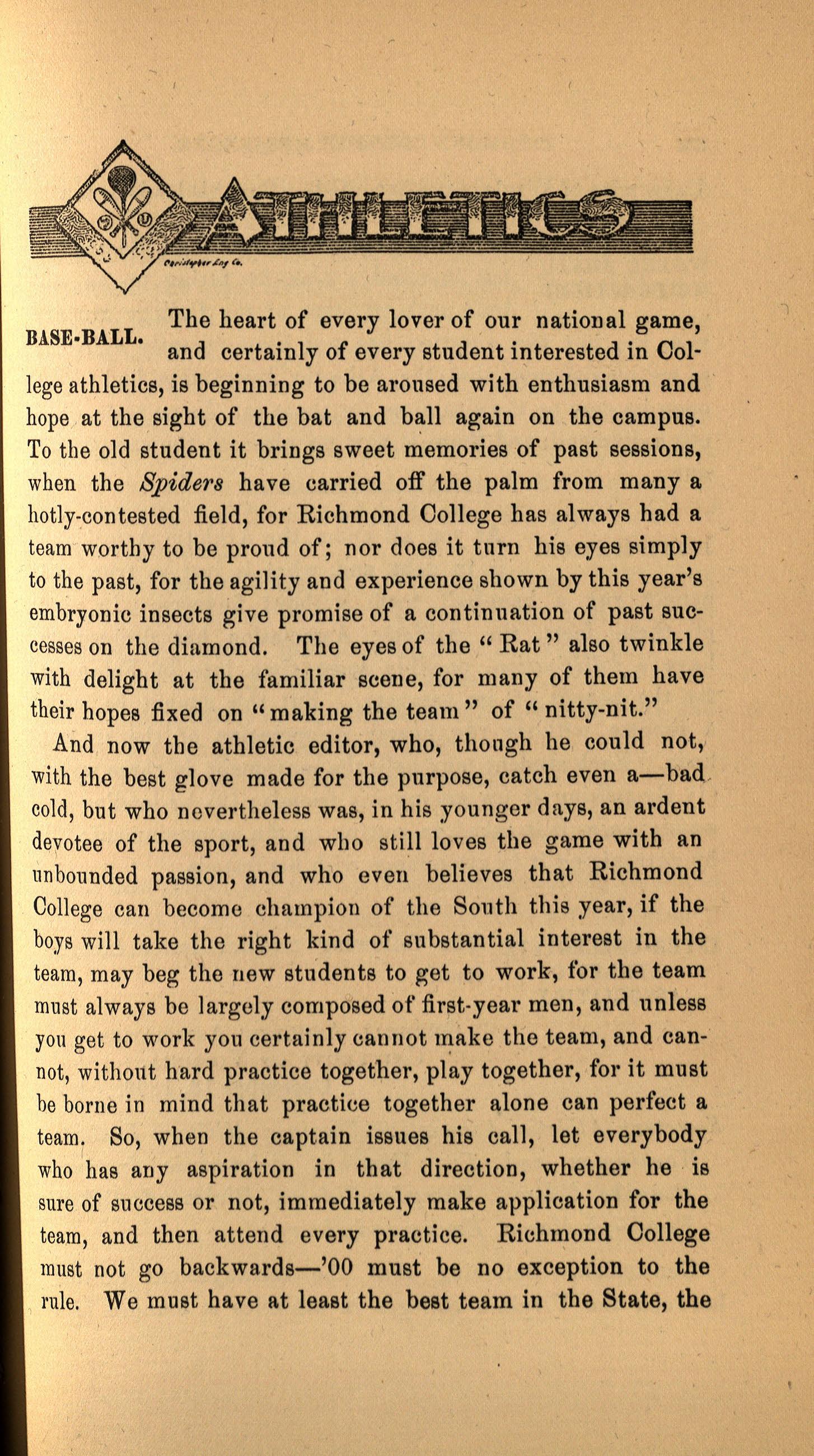
B!
The heart_ of every lover of ou~ national game, and certamly of every student mterested in College athletics, is beginning to be aroused with enthusiasm and hope.at the sight of the bat and b~11 again on the campus. To the old student it brings sweet memories of past sessions, when the Spide1'8 have carried off the palm from many a hotly-contested field, for Richmond College has always had a team worthy to be proud of; nor does it turn his eyes simply to the past, for the agility and experience shown by this year's embryonic insects give promise of a continuation of past successes on the diamond. The eyes of the " Rat" also twinkle with delight at the familiar scene, for many of them have their hopes fixed on "making the team" of "nitty-nit." And now the athletic editor, who, thongh he could not, with the best glove made for the purpose, catch even a-bad , cold,but who neverthele ss was, in his youn g er days, an ardent deyotee of the sport, and who still loves the game with an unbounded passion, and who even believes that Richmond College can become champion of the 8011th this year, if the boys will take the right kind of substantial interest in the team, may beg the new students to get to work, for the team must always be largely composed of first -year men, and unless yon get to work you certainly cannot n~ake the team, and cannot, without hard practice together, play together, for it must be borne in mind that practice together alone can perfect a team. So, wh en the captain issues his call, let everybody I who has any aspiration in that direction, whether he is sure of success or not, immediately make application for the team, and then attend every practice. Richmond College must not go backwards-'00 must be no exception to the rule. We must have at least the best team in the State, the
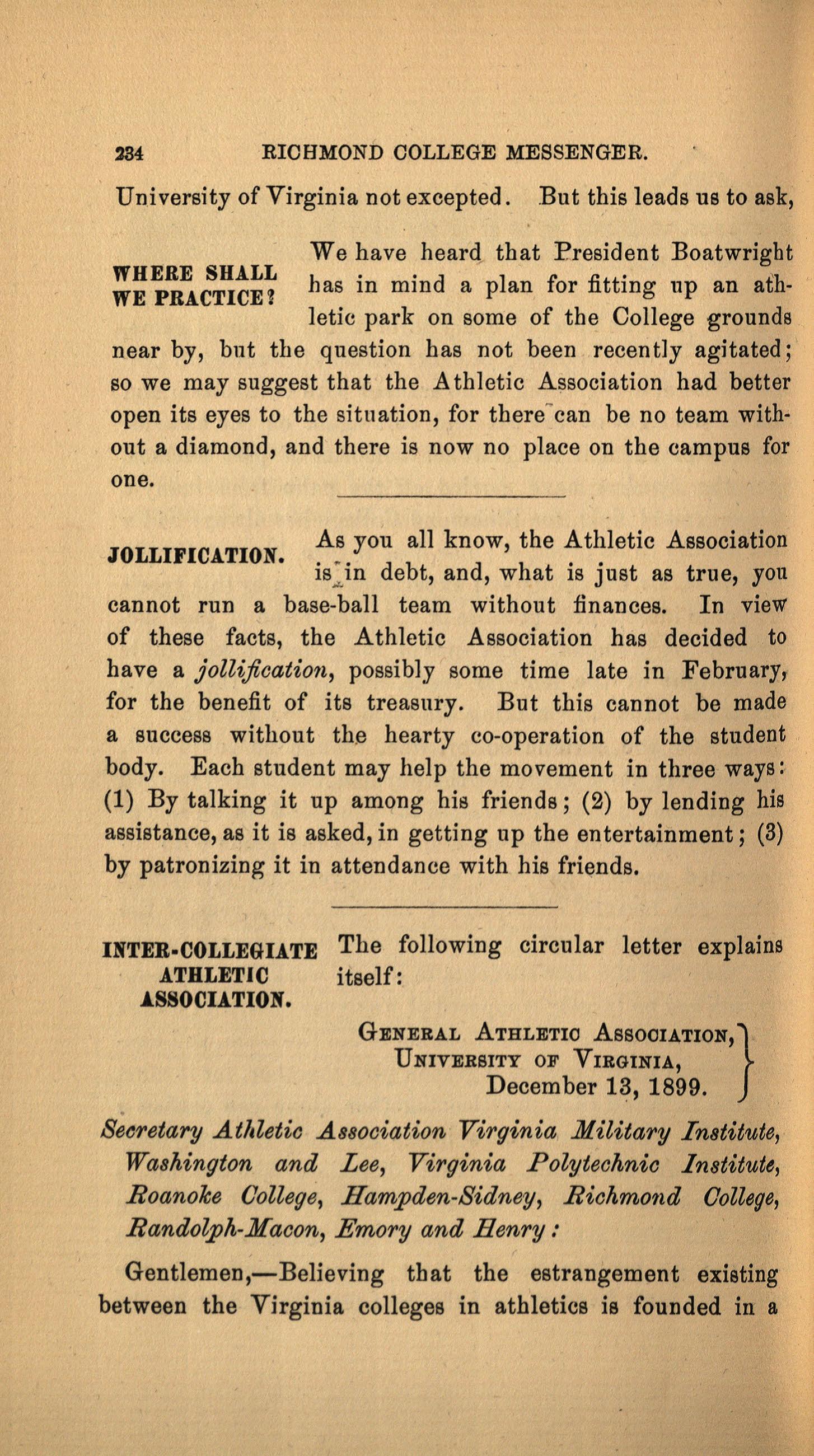
University of Virginia not excepted. But this leads us to ask,
We have heard , that President Boatwright WHERE SHALL fi 'h WE PRACTICE7 lrns in mind a plan for tting up an atletic park on some of the College grounds near by, but the question has not been recently agitated; so we may suggest that the .Athletic A~sociation had better open its eyes to the situation, for there · can be no team without a diamond, and there is now no place on the campus for one.
As you all know, the Athletic Association JOLLIFICATION.
i ( in debt, and, what is just as true, you cannot run a base -ball team without finances. In view of these facts, the Athletic .Association has decided to have a jollification, possibly some time late in February, for the benefit of its treasury. But this cannot be made a success without th~ hearty co-operation of the student body. Each student may help the movement in three ways: (1) By talking it up among his friends; (2) by lending his assistance, as it is asked, in getting up the entertainment; (3) by patronizing it in attendance with his friends.
INTER-COLLEGIATE The following circular letter explains ATHLETIC itself: .A.SSOCUTION.
GENERALATBLETio AssooIATION,} UNIVERSITYOF VIRGINIA, December 13, 1899.
Secretary Atl,letic Association Virginia Military Institute, Washington and Lee, Virginia Polytechnic Institute, Roanoke College, Hampden-Sidney, Richmond College, Randolph-Macon, Emory and Henry:
Gentlemen,-Believing that the estrangement existing between the Virginia colleges in athletics is founded in a
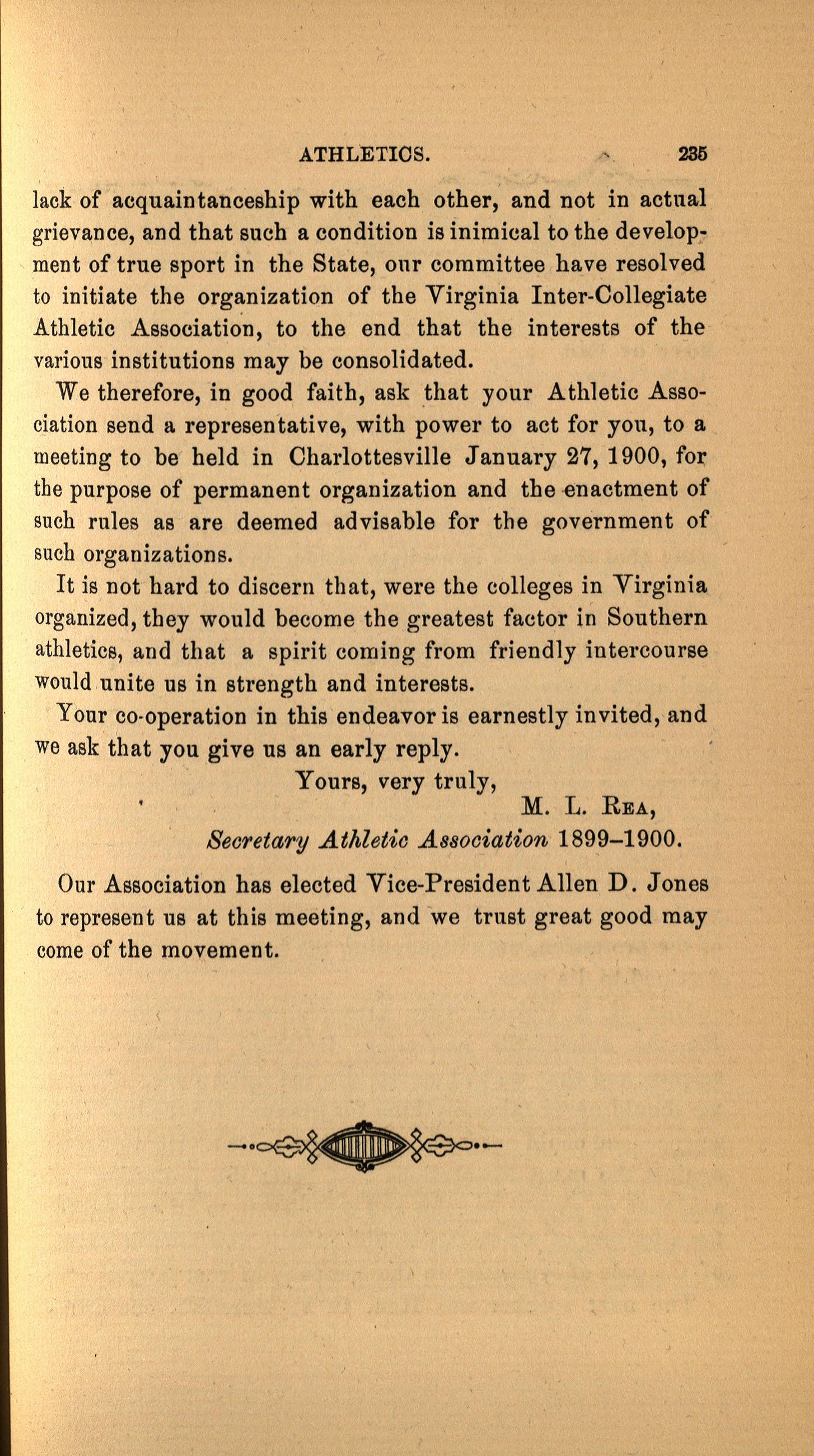
' .
lack of acquaintanceship with each other, and not in actual grievance, and that such a condition is inimical to the development of true sport in the State, onr committee have resolved to initiate the organization of the Virginia Inter-Collegiate Athletic Associatio ·n, to the end that the interests of the various institutions may be consolidated.
We therefore, in good faith, ask that your Athletic Association send a representative, with power to act for you, to a meeting to be held in Charlottesville January 27, 1900, for the purpose of permanent organization and the -enactment of such rules as are deemed advisable for the government of such organizations.
It is not hard to discern that, were the colleges in Virginia organized, they would become the greatest factor in Southern athletics, and that a spirit coming from friendly intercourse would unite us in strength and interests.
Your co•operation in this endeavor is earnestly invited, and we ask that you give us an early reply.
Yours, very truly,
M. L. REA, Secretary Athletic ABBociation 1899-1900.
Our Association has elected Vice-President Allen D. Jones to represent us at this meeting, and we trust great good may comeof the movement.
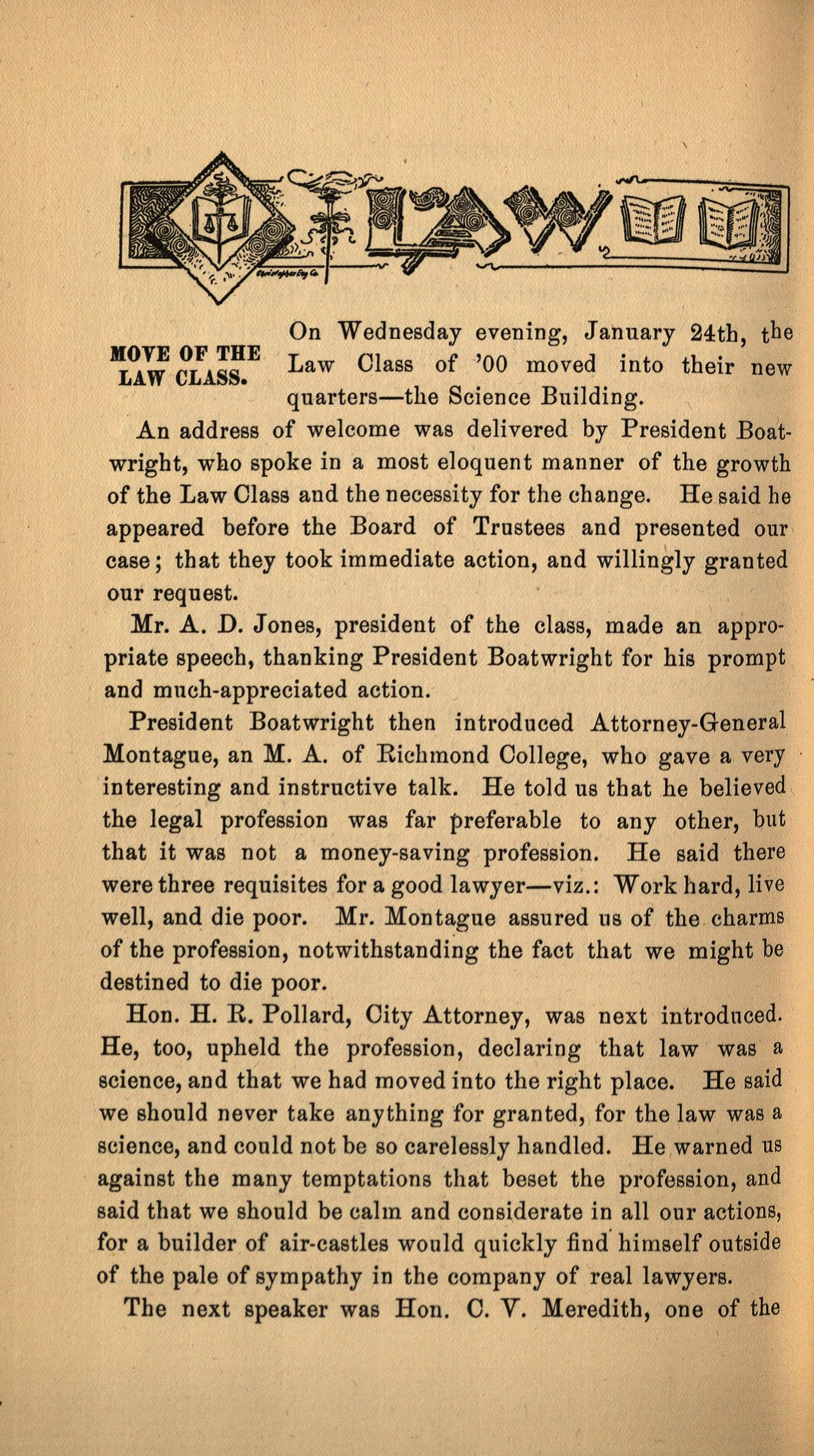
On Wednesday evening, January 24th, the MOVEOF THE Law Class of 'OO moved into their new LAW CLASS. quarters-the Science Building.
An address of welcome was delivered by President Boatwright, who spoke in a most eloquent manner of the growth of the Law Class and the necessity for the change. He said he appeared before the Board of Trustees and presented our case; that they took immediate action, and willingly granted our request.
Mr. A. D. Jones, president of the class, made an appropriate speech, thanking President Boatwright for his prompt and much-appreciated action.
President Boatwright then introduced Attorney-General Montague, an M.A. of Richmond College, who gave a very interesting and instructive talk. He told us that he believed the legal profession was far preferable to any other, but that it was not a money-saving profession. He said there were three requisites for a good lawyer-vi~.: Work hard, live well, and die poor. Mr. Montague assured us of the charms of the profession, notwithstandi~g the fact that we might be destined to die poor.
Hon. H. R. Pollard, City Attorney, was next introduced. He, too, upheld the profession, declaring that law was a science, and that we had moved into the right place. He said we should never take anything for granted, for the law was a science, and could not be so carelessly handled. He ,warned us against the many temptations that beset the profession, and said that we should be calm and considerate in all our actions, for a builder of air-castles would quickly find ·himself outside of the pale of sympathy in the company of real lawyers.
The next speaker was Hon. C. V. Meredith, one of the
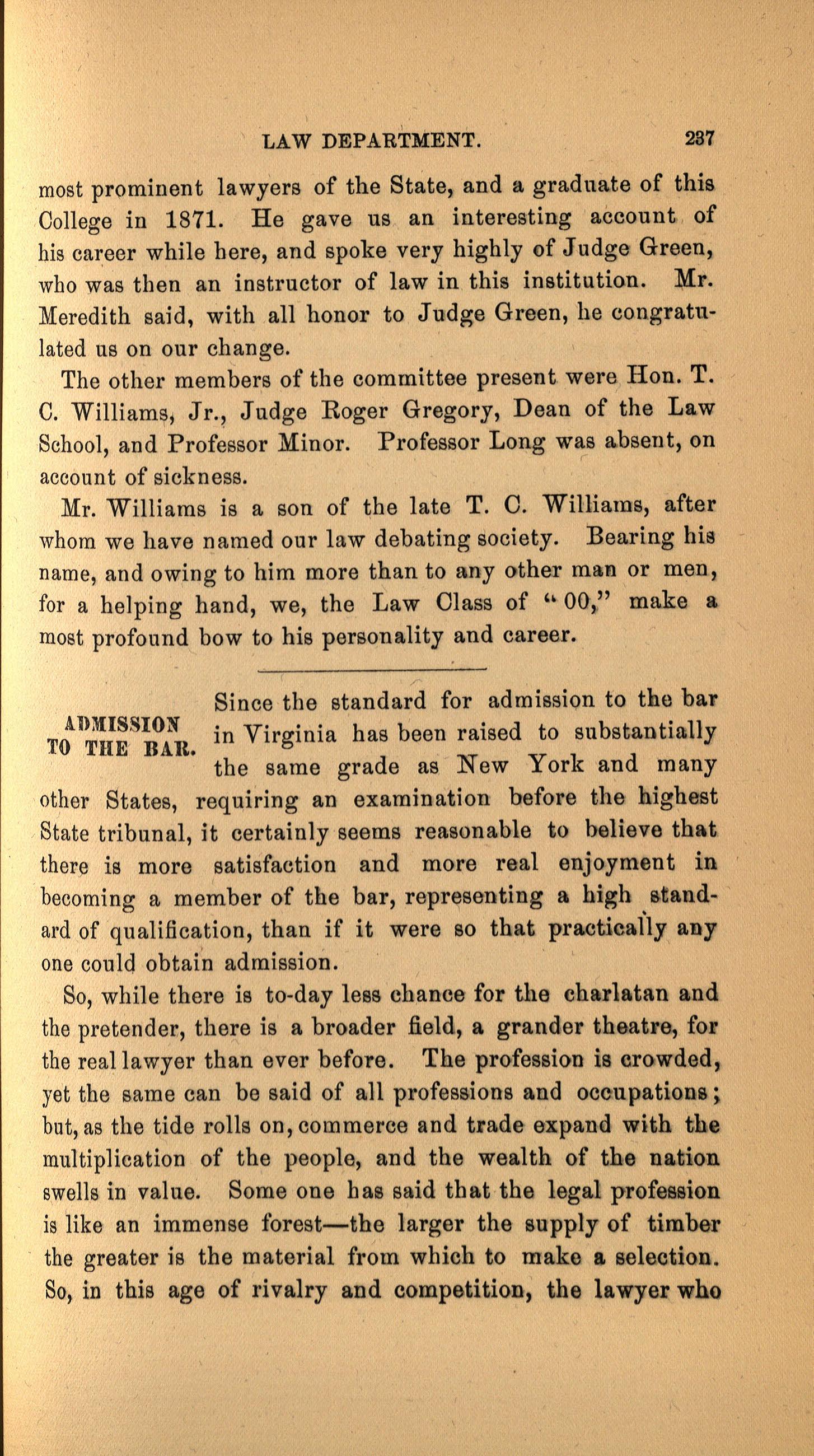
most prominent lawyers of the State, and a gradnate of this College in 1871. He gave us an interesting account of his career while here, and spoke very highly of Judge Green, who was then an instructor of law in this institution. ~r. Meredith said, with all honor to Judge Green, he congratulated us on our change.
The oth er members of the committee present were Hon. T. C. William sj Jr. 1 Judge Roger Gregory, Dean of the Law School, and Profe ssor Minor. Professor Long w~s absent, on account of sickness.
Mr. Williams is a son of ~he late T. 0. Williams, after whom we have named our l aw debating society. Bearing his name, and owing to him more than to any other man or men, for a helping hand, we, the Law Class of '' OOt make a most profound bow to his personality and career.
Since the standard for admission to the bar A.UMISSION in Virginia has been raised to snbstantially TO TUE BAU. the same grade as New York and many other States, requiring an examination before the highest Stat e tribunal, it certainly seems reasonable to believe that ther ii is more satisfaction and more real enjoyment in becoming a member of the bar, representing a high standard of qu alification, than if it were so that practically any one could obtain admission.
So, while th ere is to-day less chance for the charlatan and the pret ender, there is a broader field, a grander theatre, for the r eal la wyer than ever before. The profession is crowded, yet th e same can be said of all professions and ocoupations; but, as the tide roll s on, commerce and trade expand with the multiplication of the people, and the wealth of the nation swells in value. Some one bas said that the legal profession is like an immense forest-the larger the supply of timber ' the greater is the material from which to make a selection. So, in this age of rivalry and competition, the lawyer who
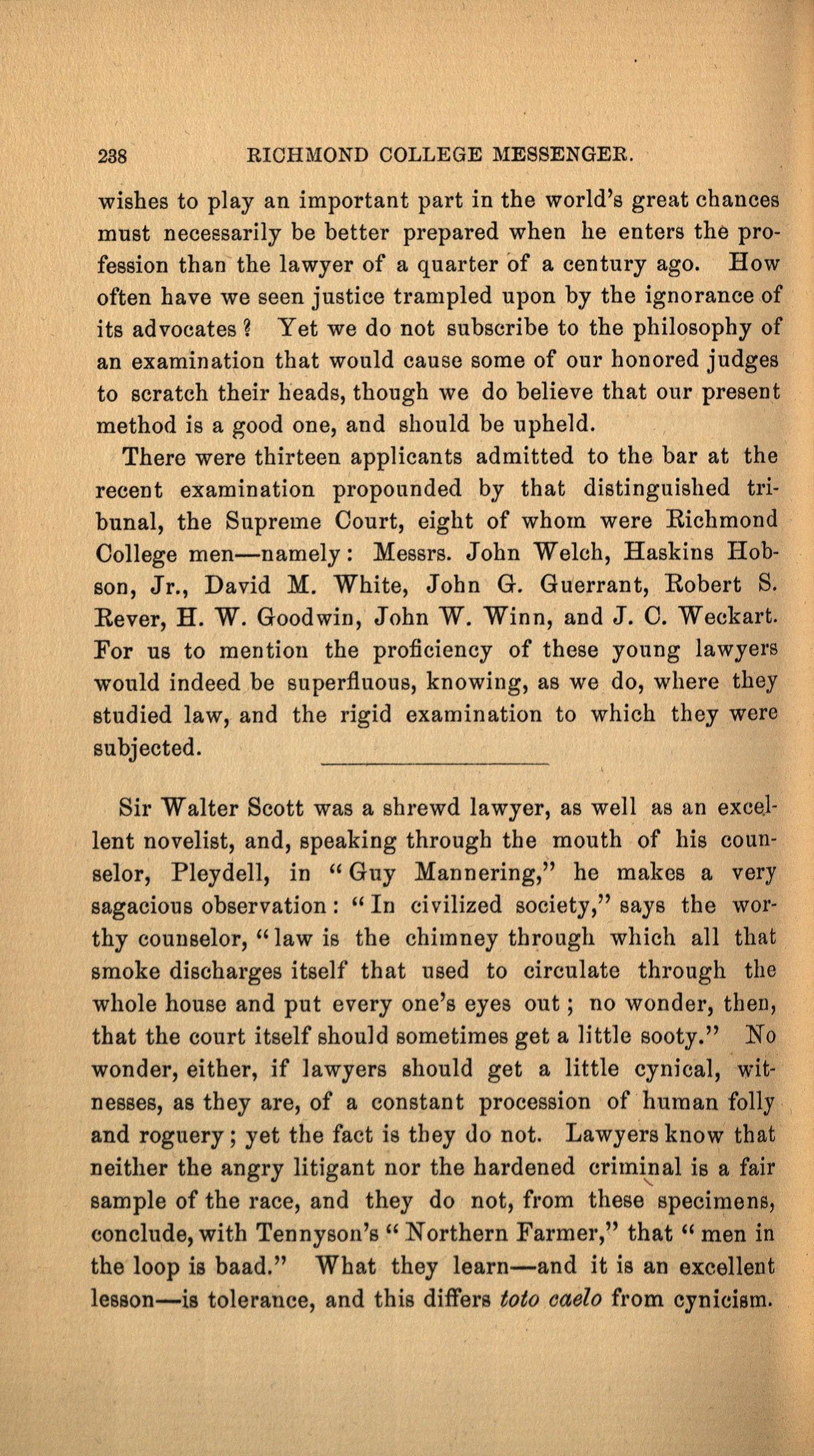
238 RICHMOND COLLEGE MESSENGER.
wishes to play an important part in the world's great chances must necessarily be better prepared when he enters the profession than the lawyer of a quarter of a century ago. How often have we seen justice trampled upon by the ignorance of its advocates~ Yet we do not subscribe to the philosophy of an examination that would cause some of our honored judges to scratch their heads, though we do believe that our present method is a good one, and should be upheld. There were thirteen applicants admitted to the bar at the recent examination propounded by that distinguished tribunal, the Supreme Court, eight of whom were Richmond College men-namely: Messrs. John Welch, Haskins Hobson, Jr., David M. White, John G. Guerrant, Robert S. Rever, H. W. Goodwin, John W. Winn, and J. C. Weckart. For us to mention the proficiency of these young lawyers would indeed be superfluous, knowing, as we do, where they studied law, and the rigid examination to which they were subjected.
Sir Walter Scott was a shrewd lawyer, as well as an exce.1lent novelist, and, speaking through the mouth of his counselor, Pleydell, in "Guy Mannering," he makes a very sagacious observation: "In civilized society," says the worthy counselor, "law is the chimney through which all that smoke discharges itself that used to circulate through the whole house and put every one's eyes out; no wonder, then, that the court itself should sometimes get a little sooty." No wonder, either, if lawyers should get a little cynical, witnesses, as they are, of a constant procession of human folly and roguery; yet the fact is they <lo not. Lawyers know that neither the angry litigant nor the hardened criminal is a fair ' sample of the race, and they do not, from these specimens, conclude, with Tennyson's "Northern Farmer," that " men in the loop is baad." What they learn-and it is an excellent lesson-is tolerance, and this differs toto caelo from cynicism.
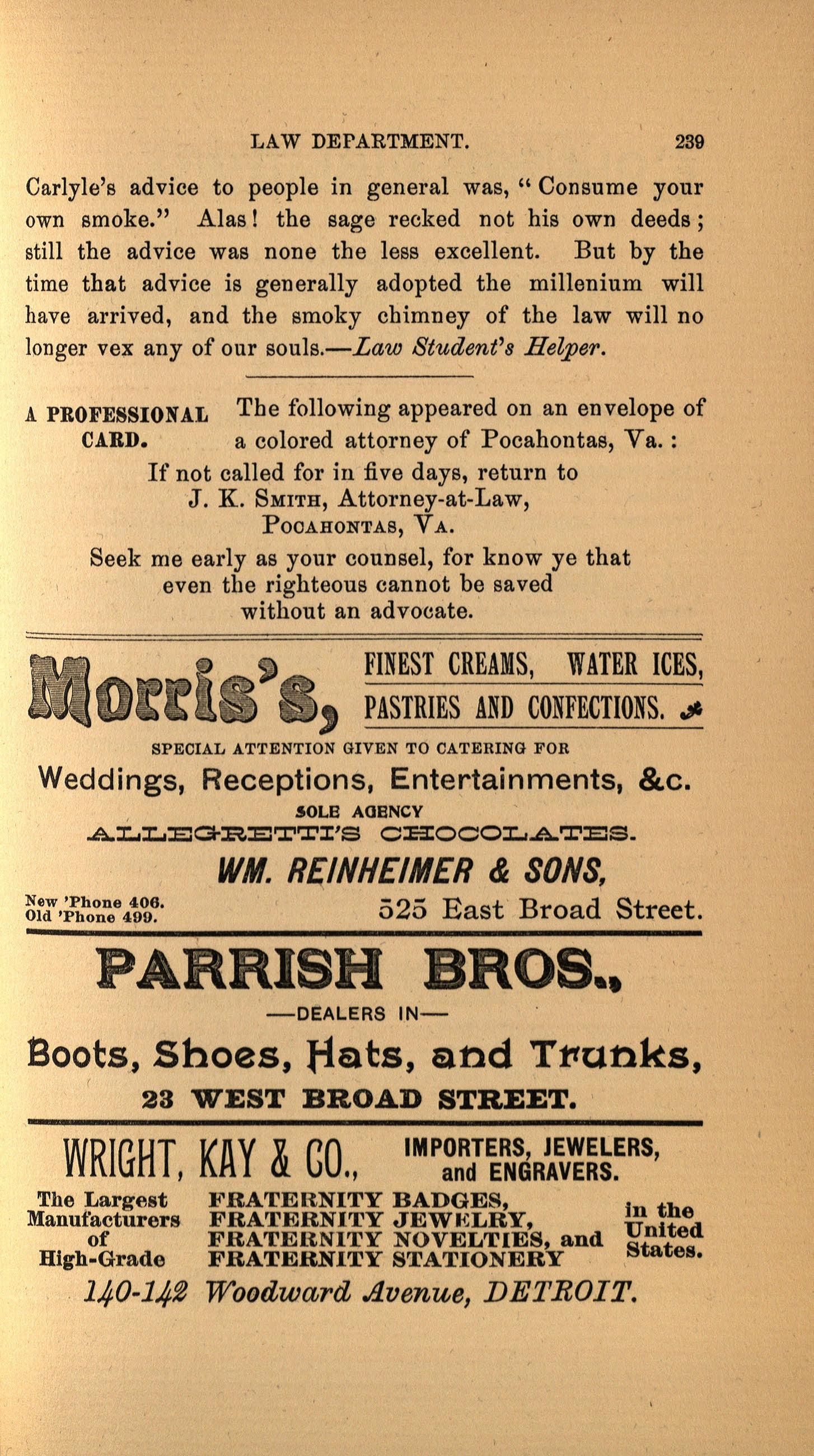
239
Carlyle's advice to people in general was, "Consume your own smoke." Alas I the sage recked not his own deeds; still the advice was none the less excellent. But by the time that advice is generally adopted the millenium will have arrived, and the smoky chimney of the law will no longer vex any of our souls.-Law Student's Helper.
A PROFESSIONAL The following appeared on an envelope of CA.RD. a colored attorney of Pocahontas, Va. : If not called for in :five days, return to J. K. SMITH,Attorney-at-Law, PooAHONTAs,VA.
Seek me early as your counsel, for know ye that even the righteous cannot be saved without an advocate.
PHILOLOGIAN. MU SIGMA RHO.
President J.AS. D. GWALTNEY. President ... .A D. JONES. Vice-President .. .. w. M. CRUMPLER. Vice-President . .. . P. P. DE.ANS.
Secretary W. W. GORDON. Secretary J.P. McCABE. Treasurer ........ .. .. .. M. O. SOWERS. Treasurer c. H. DUNAWAY.
GLEE
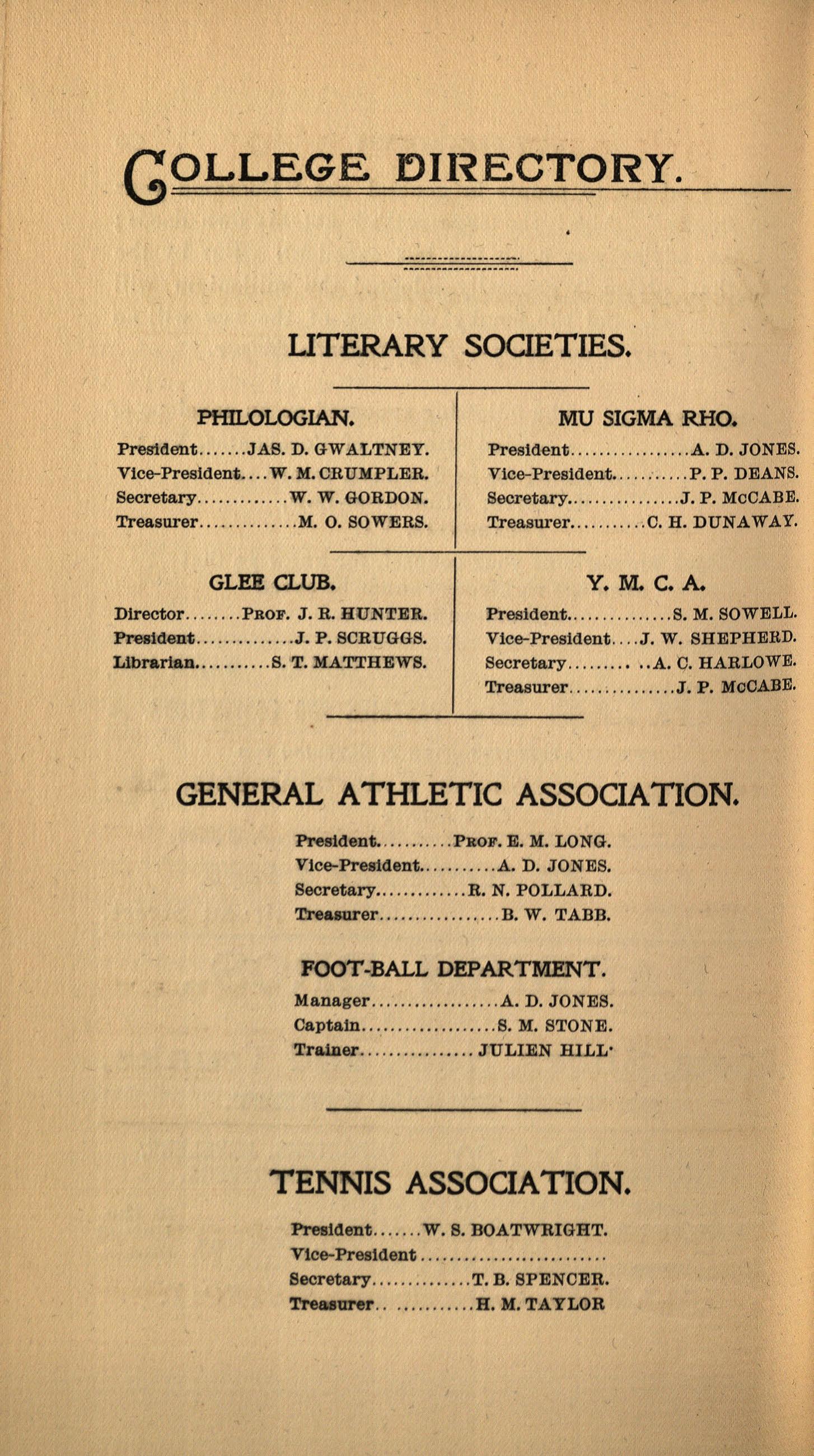
Y. M. C. A.
Director .. PROF. J. R. HUNTER. President ... S. M. SOWELL.
Pre&ident .......... . .. .J.P. SCRUGGS. Vice-President . J. w. SHEPHERD. Librar!an .. ... ..... . s.T. MATTHEWS. Secretary .... .... ... .A. C. HARLOWE. Treasurer .J.P. McCABE.
President PROF.E. M. LONG. Vice-President . .A. D. JONES. Secretary R. N. POLL.ARD. Treasurer ........ .... .. .. . B. w. TABB.
FOOT-BALLDEPARTMENT. Manager . .A. D. JONES. Captain ........ .. .... ..... 8. M. STONE. Tra1ner .. JULIEN HILL·
Preaident W. 8. BOATWRIGHT. Vice-President
Secretary T. B. SPENCER. Treaaurer .
H. M. TAYLOR
DESIGNS AND ESTIMATES FURNISHED FGa
FttatettnityPins,ClassPins,Class~ings,Jedals,&e.

Our Stock represents the newest and best productions of Standard and Reputable Manufacturers only. Under no circumstances do we offer our patrons goo d s of do u b t £u l quality.
Estimates on Class Pins, Class Rings, etc., etc., are largely governed by quantity required. We only accept orders at a price consistent with best workmanship and high quality.
CorrespondenceInvited and Promptly Answ•rtHI.
Porten, Dealing with thla Firm wlll kindly mention the College Meeeenger.
::r. ::r. 0 O:C...:C...:CNS.
GROCERIESTobacco and Cigars, , CONFECTIONERIES a Specialty.~ STATIONERY, LAMP , FIXTURES, OILS, and STUDENTS' SUPPLIES, 1500 W. BROADSTREET, OPPOSITETHE COLLEGE.
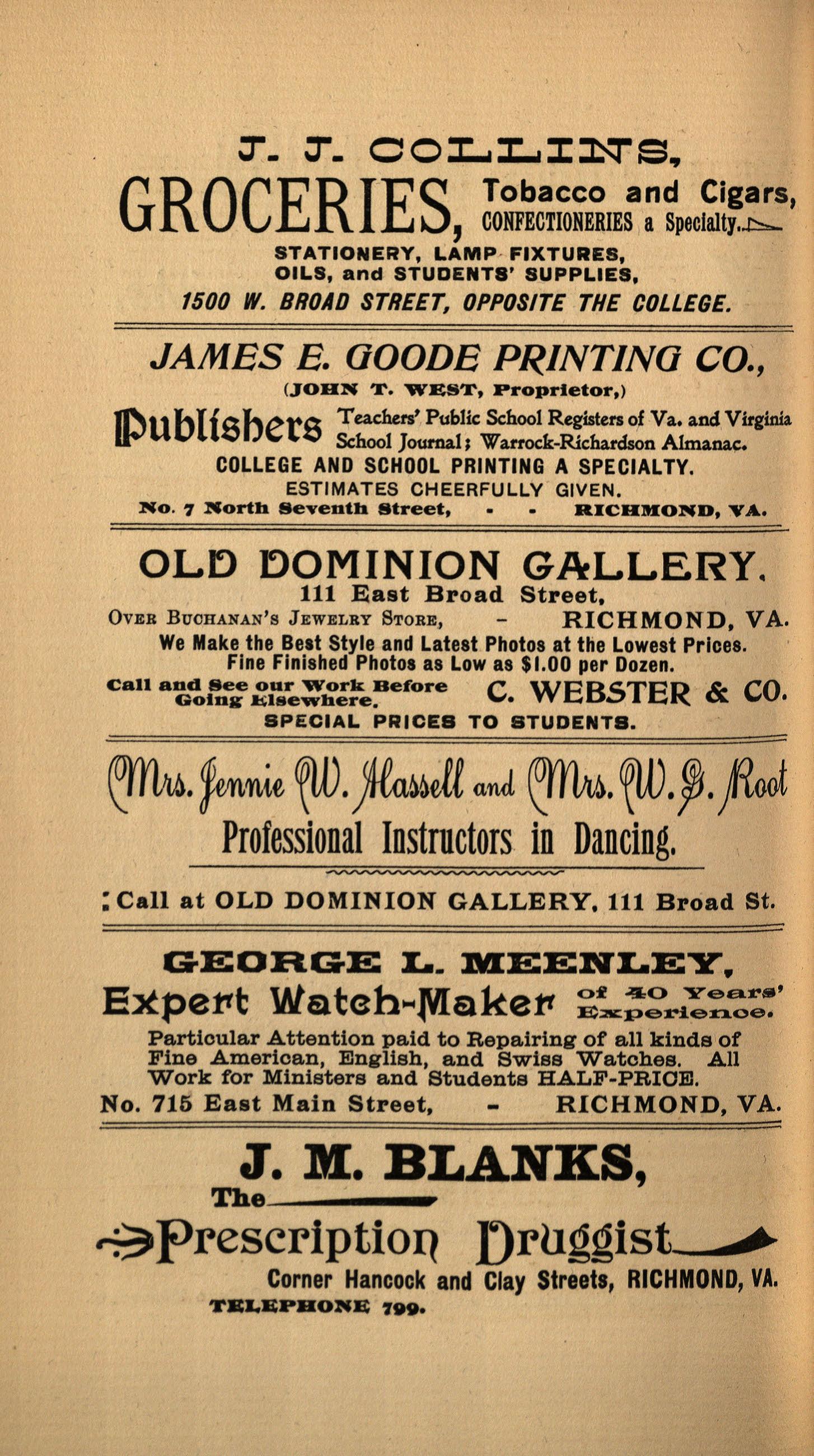
E. OOODE PRINT/NO CO., (JOHN T. WEST, Proprietor,)
~ubUsbers Teachers' Public School Registers o!Va. and Virginia g., School Journal; Warrock-Richardson Almana+, COLLEGE AND SCHOOL PRINTING A SPECIALTY. ESTIMATES CHEERFULLY GIVEN. No 7 :North Seventh Street, RICHMOND, VA,
We Makethe Beat Style and Latest Photos at the Lowest Prices. Fine Finished Photos as Lowas $1.00 per Dozen. can and 8ee our Work Defore C WEBSTER & CO Going J:£1sewhere. • • SPECIAL PRICES TO STUDENTS.
It may be II, convenience to visitors to know the RIOHMONDExcHANGJt -===----------' FOR WoMAN's WoRK (Third st., cor.
VFranklin) is prepared to take orders for Home-Made Cakes, Breads, and everything made by good housekeepers. Elaborate or simple Suppers, Dinners, and Luncheons can be furnished on short notice. The most beautiful Fancy Work alwaysfor sale. Sewing of every description done. Gentlemen's Clothing neatly repaired.
Neareat
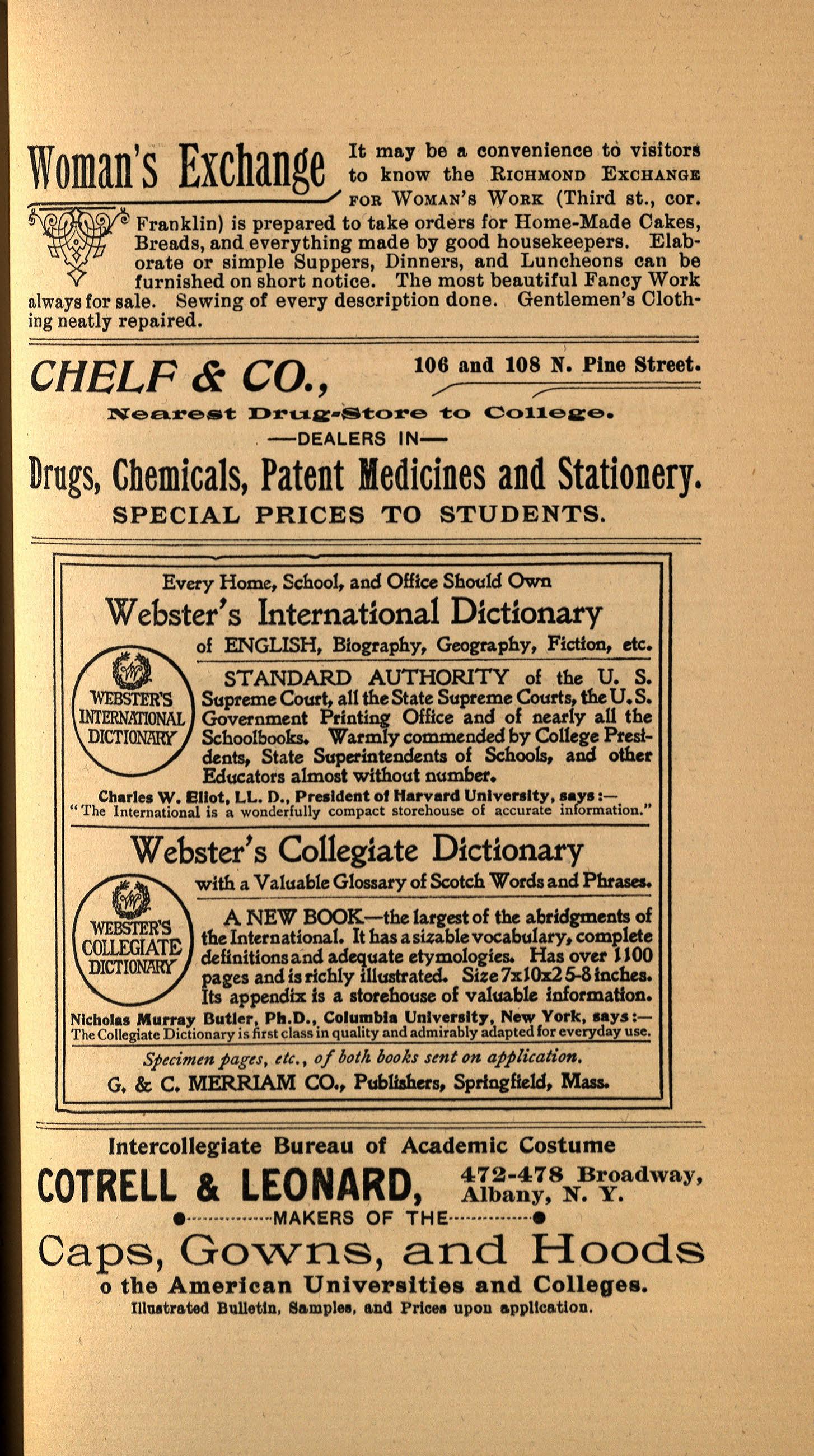
)
106 and 108 N. Pine Street.
Dr'-2.a•Store to Co11eae • . -DEALERS INDrugs,Chemicals,PatentMedicines
SPECIAL PRICES TO STUDENTS.
Every Home, School, and Office Should Own Webster's International Dictionary of ENGLISH, Biography, Geography, Fiction, etc.
STANDARD AUTHORITY of the U. S. Supreme Court, all the State Supreme Courts, the U.S. Government Printing Office and of nearly all the Schoolbooks. Warmly commended by College Presidents, State Superintendents of School,, and other Educators almost without number.
Charles W. Eliot, LL. D., President of Harvard Unlvenlty, aays :" T he International is a wonderfully compact storehouse of accurate information."
A NEW BOOK-thelal'&'estof the abridgments of the International. It has a sizable vocabulary, complete deflnitionaand ~uate etymologies. Has over JJOO pages and is richly dluatrated. Size 7xl0x2 5-8lnchea. Its appendix Is a storehouse of valuable information.
Nicholas Murray Butler, Ph.D., Columbia Unlvenlt:,, New York, aay.s:The Collegiate Di ctionary i s first class in quality and admirably adapted for everyday use. Specimen pages, etc., of botk books sent on application, G, & C, MERRIAM CO., Publlahers, Sprlngffdd, Mau.
Intercollegiate Bureau of Academic Costume
COTRELL & LEONARD,~J;;!;, 8 N~~-adway, • ····· ··..MAKERS OF THE ·· •
Caps, Gowns, and Hoods
o the American Universities and Colleges. Illuatrated Bulletin, Samplff , and Price• upon application.
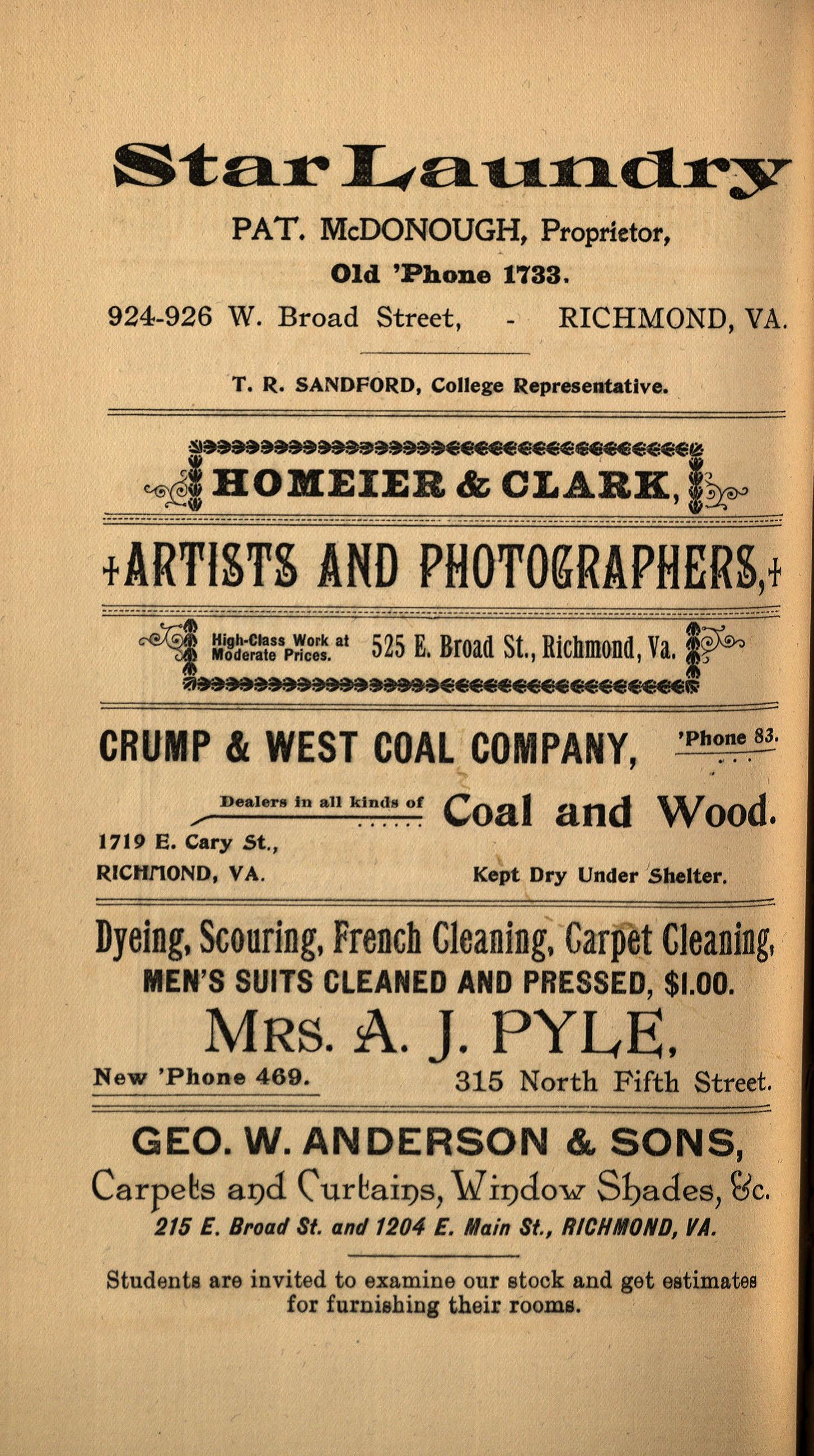
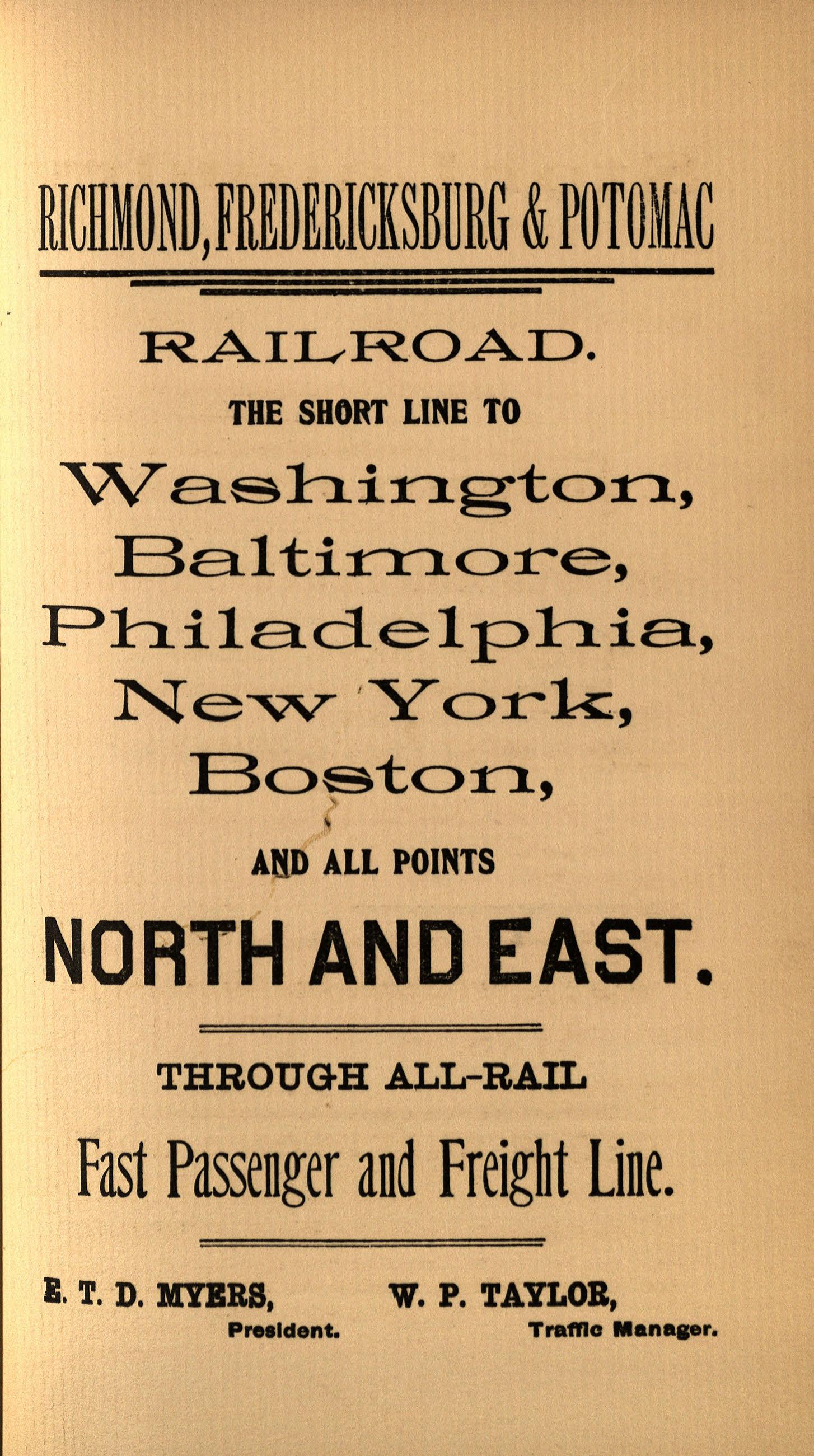
f{ISTO~ICAll=====--
The College was founded in 1832. It was moved from the country to its present beautiful park in Richmond city in 1834. The value of grounds and . buildings is $400,000. The valae of endowment is $2{10,000. The endowed Library contains 13,000 volumes, and is kept supplied with the newest standard books.
IfiST~U CTION.-==== =---
Full Corps of Professors in Twelve Departments. Courses leading to degrees of B. A., B. 8., M. A., and Bachelor of Law. Thorough instruction. High standards.
BXPBfiSES,=====--
Tuition free to all students for the ministry. Endowed Scholarships pay tuition for twentr•eight worthy students. Donation Funds aid ministerial students from other States. The total living expenses of a student who pays all fees are less than $225 for session of nine months. Table board cost • $7.60to $10 a month.
ltAW:a========----
A flourishing School of Law offers legal training at small cost, under the most favorable surroundings. Junior and Senior Classes. Fees for entire session, $61 to t76.
ltAST SBSSIOfi=====---
During 1898-'99 there were two hundred and sixtytwo students. The good health of students was unbroken by any case of serious sickness. Forty-one Degrees, one hundred and sixty-eight Diplomas, and three hundred and ninety-two Distinctions awarded June 15, 1899, indicate that the session's work was faithfully done.
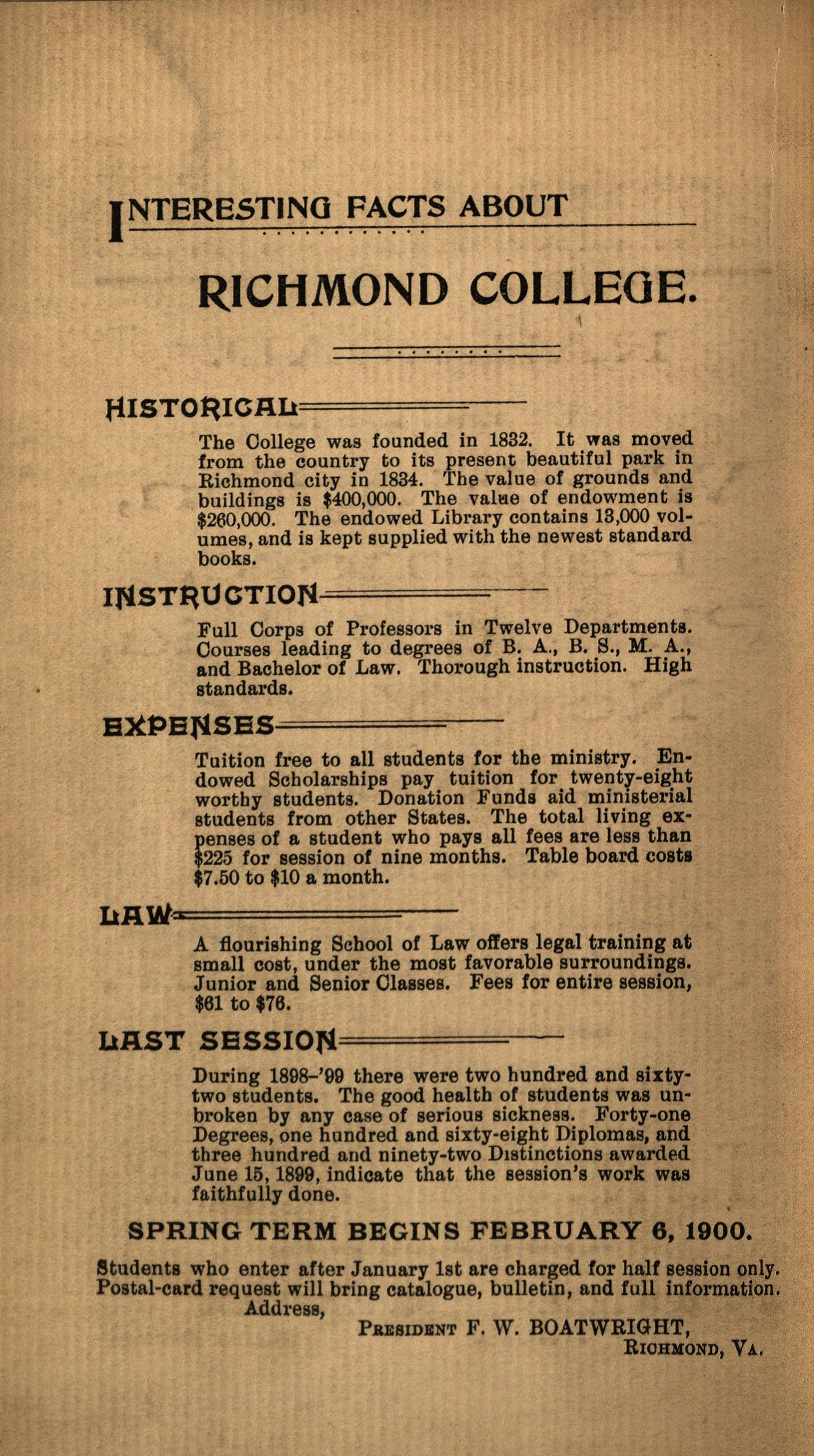
TERM
FEBRUARY 6, 1900.
Student • who enter after January 1st are charged for half session only. Postal-card request will bring catalogue, bulletin, and full information . .A.dd1·ess,
PllEBIDBNT F. w. BOATWRIGHT,
RIOBXOND, VA,